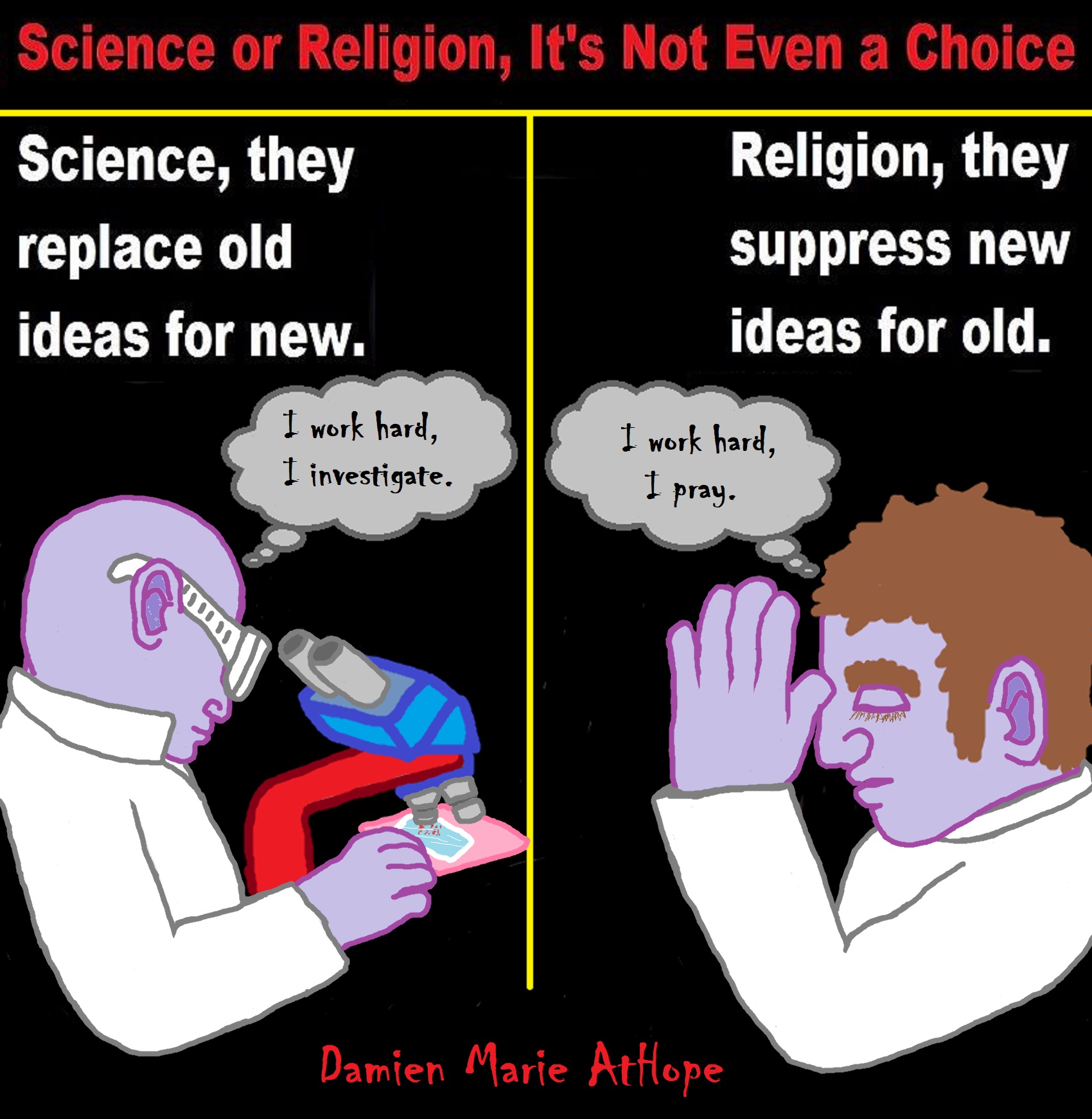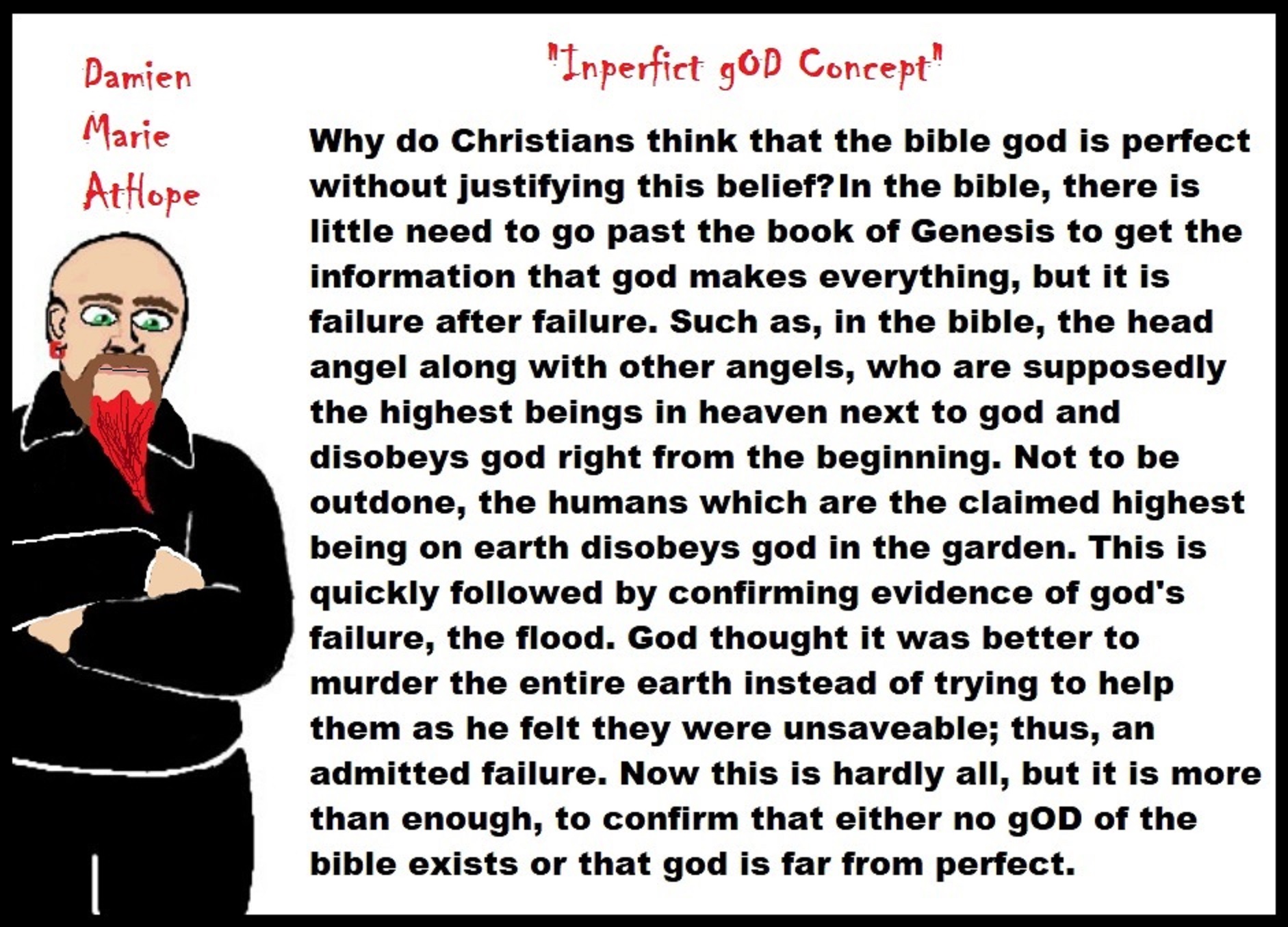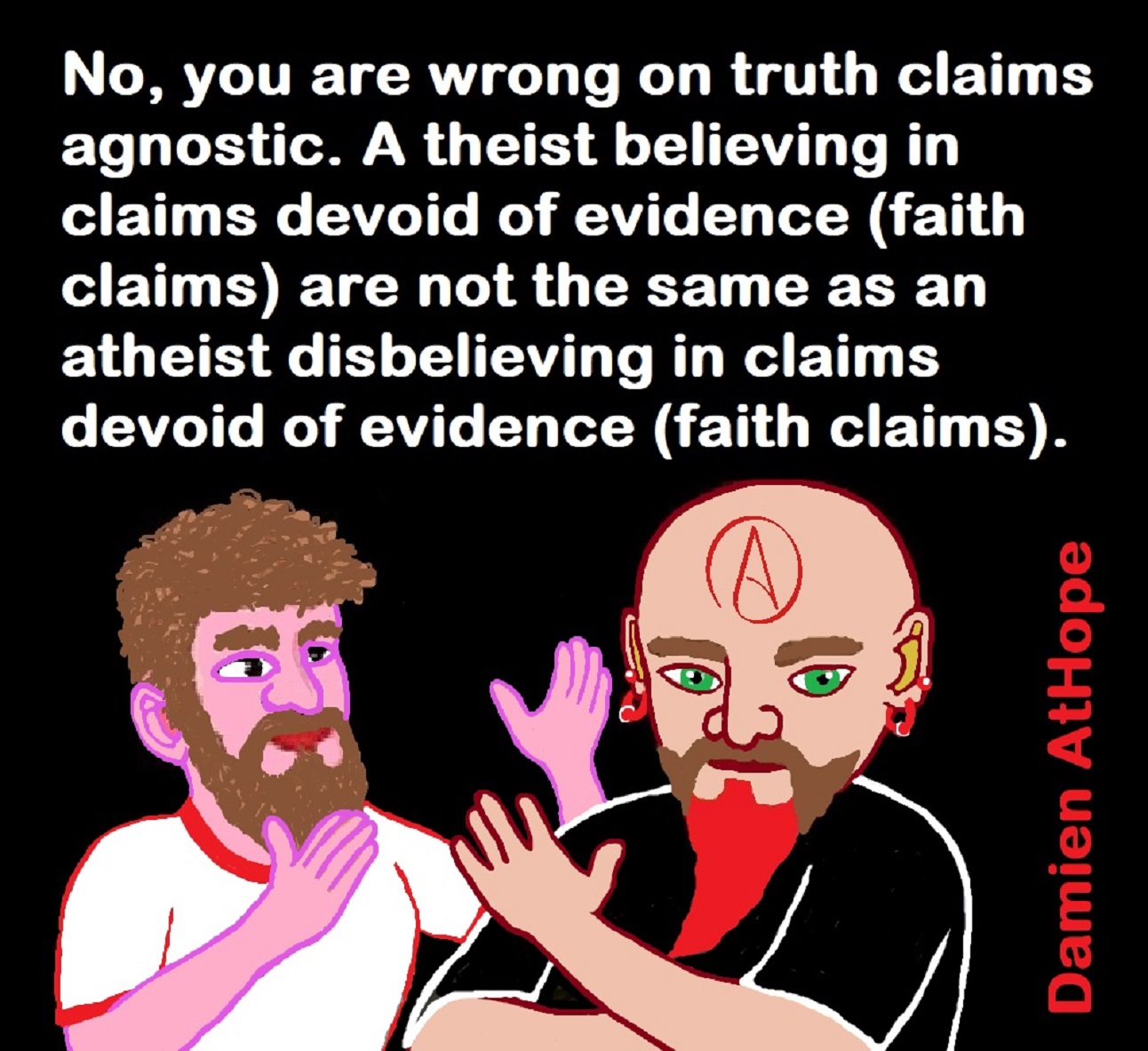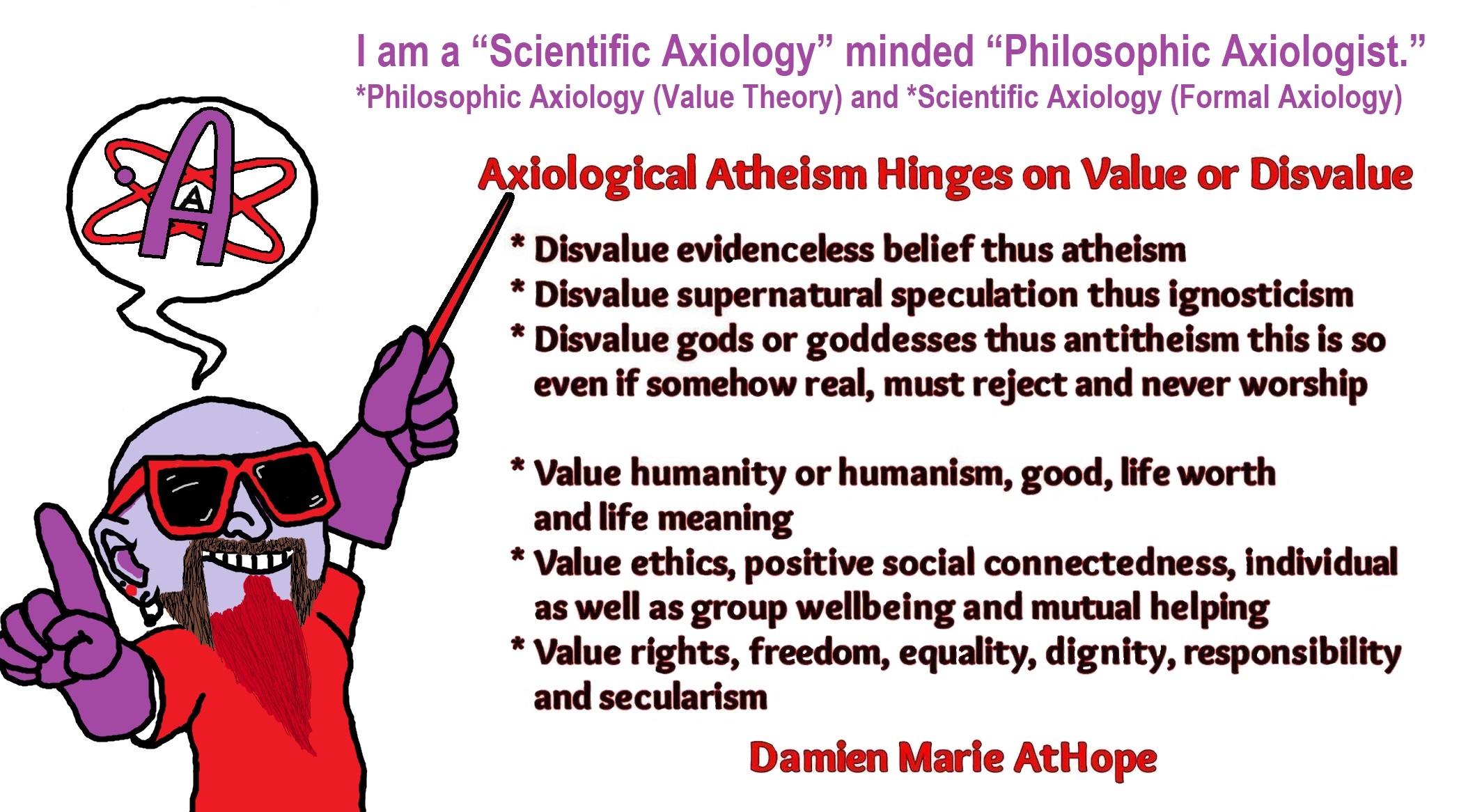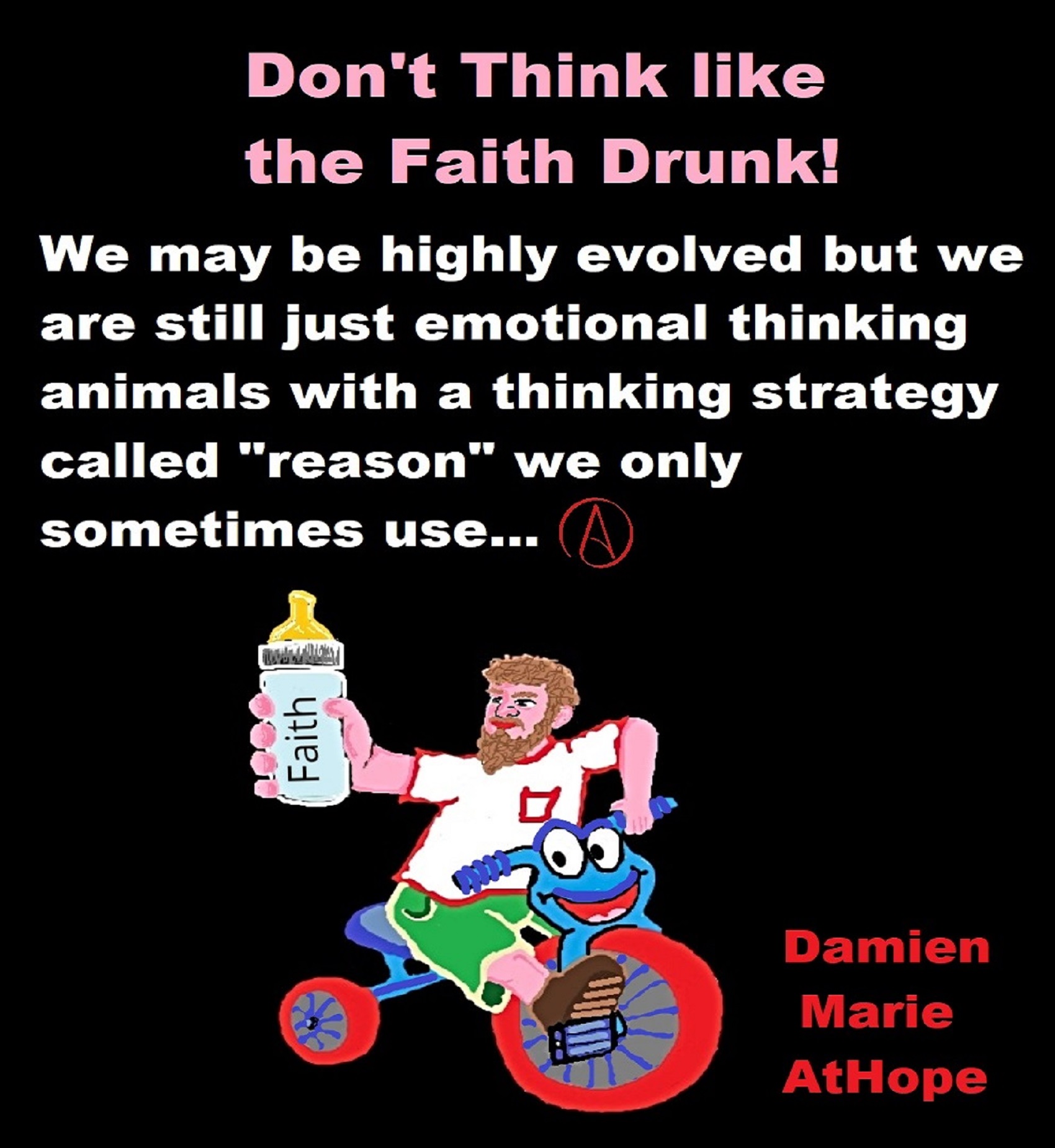As an anti-agnostic atheist, I mean this as being against agnosticism not against agnostic people and feel non-agnostic atheists should not call agnostics weak. I just disagree with agnosticism conclusions and way many agnostics say they generally support them or feel it is the most reasonable too them.
Just remember a simple rule all beliefs need something to support them or they are at best unsupported accepted assertions, arguments or ideas. At worst completely baseless, misinterpreted confusions, or outright falsehoods. See it’s like this if one feels something requires faith (unsupported cognition of acceptance) to see the thing as real; without realizing it, one has affirmed that such a thing is not likely a true part of reality.
My blog on the Philosophy Definitions of “Agnosticism”
Definitions of “Agnosticism” From: “The Stanford Encyclopedia of Philosophy“
By Paul Draper PhD, Philosophy // Faculty at the University of California, Irvine
“The terms “agnostic” and “agnosticism” were famously coined in the late nineteenth century by the English biologist, T.H. Huxley. He said that he originally
invented the word “Agnostic” to denote people who, like [himself], confess themselves to be hopelessly ignorant concerning a variety of matters, about which metaphysicians and theologians, both orthodox and heterodox, dogmatise with the utmost confidence. (1884)” ref
“including of course the matter of God’s existence. He did not, however, define “agnosticism” simply as the state of being an agnostic. Instead, he often used that term to refer to a normative epistemological principle, something similar to (though weaker than) what we now call “evidentialism”. Roughly, Huxley’s principle says that it is wrong to say that one knows or believes that a proposition is true without logically satisfactory evidence (Huxley 1884 and 1889). But it was Huxley’s application of this principle to theistic and atheistic belief that ultimately had the greatest influence on the meaning of the term. He argued that, since neither of those beliefs is adequately supported by evidence, we ought to suspend judgment on the issue of whether or not there is a God.” ref
“Nowadays, the term “agnostic” is often used (when the issue is God’s existence) to refer to those who follow the recommendation expressed in the conclusion of Huxley’s argument: an agnostic is a person who has entertained the proposition that there is a God but believes neither that it is true nor that it is false. Not surprisingly, then, the term “agnosticism” is often defined, both in and outside of philosophy, not as a principle or any other sort of proposition but instead as the psychological state of being an agnostic. Call this the “psychological” sense of the term. It is certainly useful to have a term to refer to people who are neither theists nor atheists, but philosophers might wish that some other term besides “agnostic” (“theological skeptic”, perhaps?) were used.” ref
“The problem is that it is also very useful for philosophical purposes to have a name for the epistemological position that follows from the premise of Huxley’s argument, the position that neither theism nor atheism is known, or most ambitiously, that neither the belief that God exists nor the belief that God does not exist has positive epistemic status of any sort. Just as the metaphysical question of God’s existence is central to philosophy of religion, so too is the epistemological question of whether or not theism or atheism is known or has some other sort of positive epistemic status.” ref
“And given the etymology of “agnostic”, what better term could there be for a negative answer to that epistemological question than “agnosticism”? Further, as suggested earlier, it is, for very good reason, typical in philosophy to use the suffix “-ism” to refer to a proposition instead of to a state or condition, since only the former can sensibly be tested by argument.” ref
“If, however, “agnosticism” is defined as a proposition, then “agnostic” must be defined in terms of “agnosticism” instead of the other way around. Specifically, “agnostic” must be defined as a person who believes that the proposition “agnosticism” is true instead of “agnosticism” being defined as the state of being an agnostic. And if the proposition in question is that neither theism nor atheism is known to be true, then the term “agnostic” can no longer serve as a label for those who are neither theists nor atheists since one can consistently believe that atheism (or theism) is true while denying that atheism (or theism) is known to be true.” ref
“When used in this epistemological sense, the term “agnosticism” can very naturally be extended beyond the issue of what is or can be known to cover a large family of positions, depending on what sort of “positive epistemic status” is at issue. For example, it might be identified with any of the following positions: that neither theistic belief nor atheistic belief is justified, that neither theistic belief nor atheistic belief is rationally required, that neither belief is rationally permissible, that neither has warrant, that neither is reasonable, or that neither is probable.” ref
“Also, in order to avoid the vexed issue of the nature of knowledge, one can simply distinguish as distinct members of the “agnosticism family” each of the following claims about intellectually sophisticated people: (i) neither theism nor atheism is adequately supported by the internal states of such people, (ii) neither theistic belief nor atheistic belief coheres with the rest of their beliefs, (iii) neither theistic nor atheistic belief results from reliable belief-producing processes, (iv) neither theistic belief nor atheistic belief results from faculties aimed at truth that are functioning properly in an appropriate environment, and so on.” ref
“Notice too that, even if agnosticism were defined as the rather extreme position that neither theistic belief nor atheistic belief ever has positive epistemic status of any sort, it wouldn’t follow by definition that no agnostic is either a theist or an atheist. Some fideists, for example, believe that neither atheistic belief nor theistic belief is supported or sanctioned in any way at all by reason because reason leaves the matter of God’s existence completely unresolved. Yet they have faith that God exists and such faith (at least in some cases) involves belief. Thus, some fideists are extreme agnostics in the epistemological sense even though they are not agnostics in the psychological sense.” ref
“It is also worth mentioning that, even in Huxley’s time, some apophatic theists embraced the term “agnostic”, claiming that all good Christians worshipped an “unknown God”. More recently, some atheists proudly call themselves “agnostic atheists”, although with further reflection the symmetry between this position and fideism might give them pause. More likely, though, what is being claimed by these self-identified agnostic atheists is that, while their belief that God does not exist has positive epistemic status of some sort (minimally, it is not irrational), it does not have the sort of positive epistemic status that can turn true belief into knowledge.” ref
“No doubt both senses of “agnosticism”, the psychological and the epistemological, will continue to be used both inside and outside of philosophy. Hopefully, context will help to disambiguate. In the remainder of this entry, however, the term “agnosticism” will be used in its epistemological sense. This makes a huge difference to the issue of justification. Consider, for example, this passage written by the agnostic, Anthony Kenny (1983: 84–85):
I do not myself know of any argument for the existence of God which I find convincing; in all of them I think I can find flaws. Equally, I do not know of any argument against the existence of God which is totally convincing; in the arguments I know against the existence of God I can equally find flaws. So that my own position on the existence of God is agnostic.” ref
“It is one thing to ask whether Kenny’s inability to find arguments that convince him of God’s existence or non-existence justifies him personally in suspending judgment about the existence of God. It is quite another to ask whether this inability (or anything else) would justify his believing that no one (or at least no one who is sufficiently intelligent and well-informed) has a justified belief about God’s existence.” ref
“If agnosticism (in one sense of the word) is the position that neither theism nor atheism is known, then it might be useful to use the term “gnosticism” to refer to the contradictory of that position, that is, to the position that either theism or atheism is known. That view would, of course, come in two flavors: theistic gnosticism—the view that theism is known (and hence atheism is not)—and atheistic gnosticism—the view that atheism is known (and hence theism is not).” ref
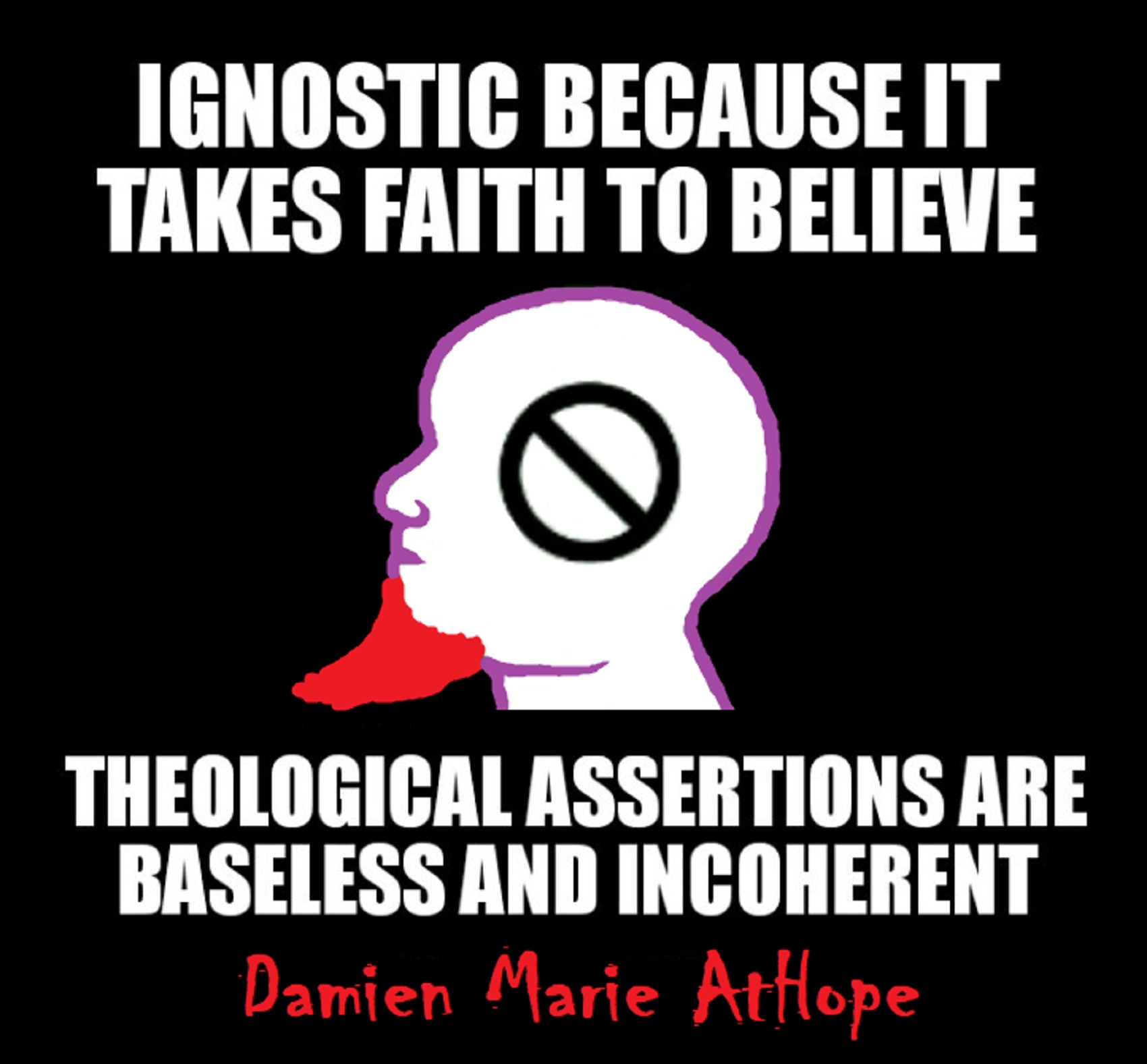
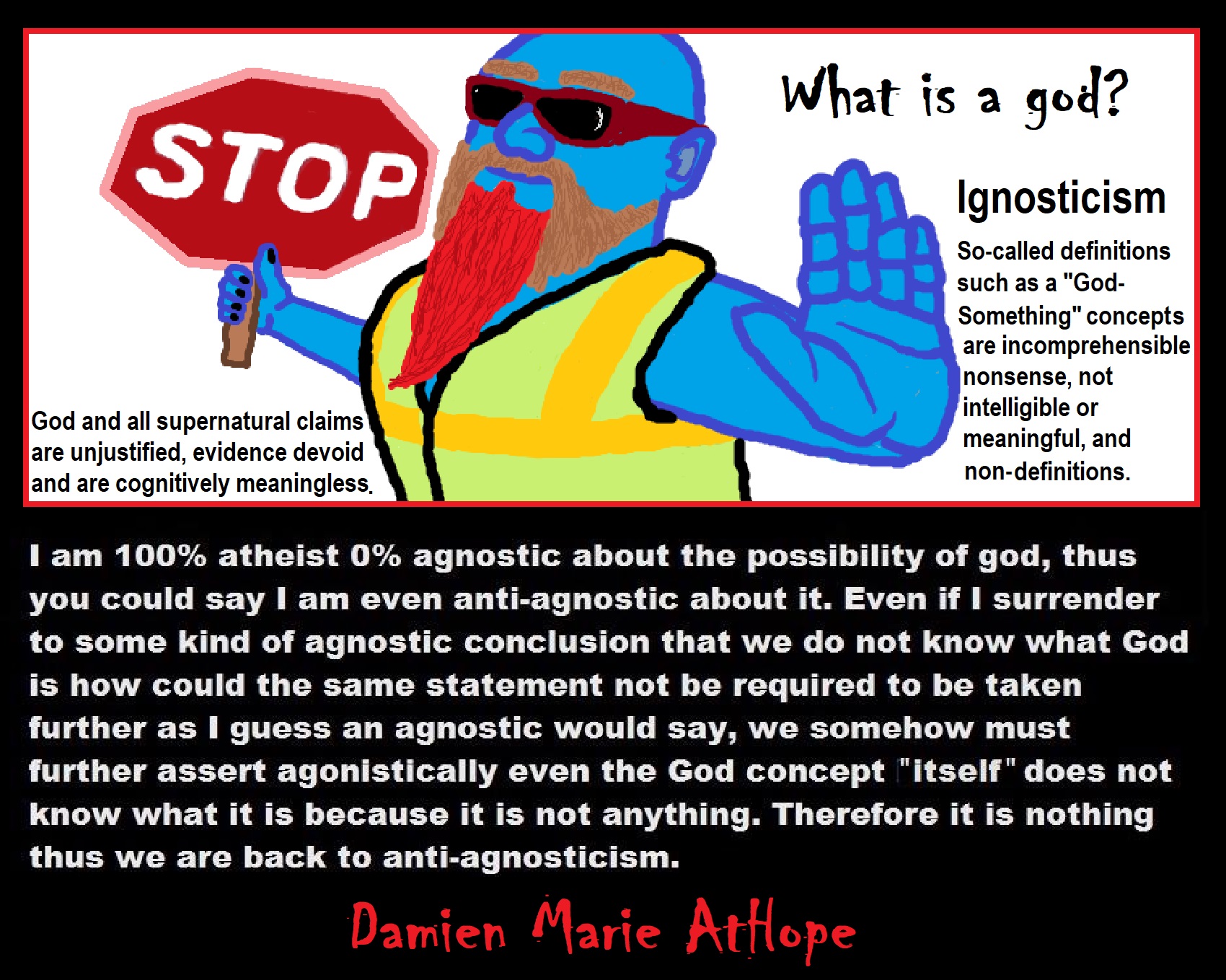

“Damien AtHope, There’s no evidence either way though. You can’t prove there isn’t a god any easier then you can prove there is a god. The logical route is being agnostic, it’s as ignorant to assume there isn’t a god at all as there is a god when it’s equally provable and improvable.” – Challenger
What do you mean by logic? Are you agreeing thinking can be valid evidence or not? If so then I did use logic towards the claims of gods and logically explained why they are not logical. If you are making a certainty argument then you need to get that there is at least two kinds of Certainty in philosophy psychological certainty that you demonstrate in your truth claims you offer about your beliefs. The other is epistemic certainty that one has the highest sound justification or warrant to believe something like how reality is devoid of anything supernatural at all levels in every test ever done.
“Psychological certainty: The first is the one we typically mean in normal language. It’s called psychological certainty. It’s a feeling of certainty; A confidence in something. This is the one we’re talking about when we say things like “Are you 100% sure?”. It is possible that someone is 100% psychologically certain that something is true and that the something is actually false. Psychological certainty comes in degrees. Good examples of psychological certainty and false beliefs are found in religious people and various sport fans.” ref
“Epistemic certainty: The second is epistemic certainty. This is the one that philosophers usually talk about. It’s the inability to be wrong type of certainty. If one is epistemically certain, then one cannot be wrong in some sense. This type of certainty is also called cartesian (after Descartes) certainty, infallible certainty and absolute certainty. This type of certainty does not come in degrees; Either one is epistemically certain or one is not. It is not entirely clear how to explicate this kind of certainty. Here are two proposals:
1. For all agents and for all propositions, (that an agent believes a proposition and that proposition is necessarily the case) logically implies that that agent is epistemically certain of that proposition.
2. For all agents and for all propositions, that an agent believes a proposition logically implies that proposition.” ref
Baron Reed ( The Stanford Encyclopedia of Philosophy) – “Like knowledge, certainty is an epistemic property of beliefs. It can be said that certainty is either the highest form of knowledge or is the only epistemic property superior to knowledge. One of the primary motivations for allowing kinds of knowledge less than certainty is the widespread sense that skeptical arguments are successful in showing that we rarely or never have beliefs that are certain but do not succeed in showing that our beliefs are altogether without epistemic worth (for example, an argument that skepticism undermines every epistemic status a belief might have; and the argument that knowledge requires certainty, which we are capable of having). As with knowledge, it is difficult to provide an uncontentious analysis of certainty. There are several reasons for this. One is that there are different kinds of certainty, which are easy to conflate. Another is that the full value of certainty is surprisingly hard to capture. A third reason is that there are two dimensions to certainty: a belief can be certain at a moment or over some greater length of time.” ref
“Damien, Yeah no, “God” Could exist in an infinite variety of concepts we just don’t yet fully understand. It doesn’t have to be the Abrahamic version that has been presented, and logically there’s no reason stories created by men to control other men would actually be true, that is what makes it logical to be Agnostic not Atheist. You can try to rationalize it however you want it comes down to very basic principals. You have no evidence against the existence of a god any more then anyone have proof of a god. Anything you would try to use as “proof” Is equally valid as theirs because in the end you’re just rationalizing things. You can provide no proof or evidence to the lack of an existence of a god that doesn’t require mental gymnastics or ludicrous amounts of assumptions about what is supposed to be an entity of inconceivable potential. Either way you’re just trying to move the goal posts from the original point. You cannot provide any more proof to the lack of an existence then anyone can to prove there is. Philosophy is irrelevant, this is not a philosophical debate I am presenting. It is a factual one based in STEM. If you want to have a philosophical debate about it then you’re both right because philosophy comes down to rationalizing why you’re correct.” – Challenger
“It’s about starting with an assumption then working to explain why it’s right instead of the opposite of trying to find out why the way something is and coming to a conclusion. The greatest philosophers of all time disagreed with each other even though they where taught by each other, it is not a science that can be used as fact like Physics or Biochem. You could argue you’re an atheist to the idea of the monotheist religions and I would agree to that. I do not believe there to be a god in the way stories of man have attempted to control each other with. There could very well be unknown forces within the universe that have deity like effects we’re incapable of interpreting at this time. What one could consider a “God” could very well still exist in many capacities. It’s arrogant and ignorant to say “Well I thought of some reasons it might not, so that means it must not” because I can think of some reasons it might be, and by your logic it must also be. This is why philosophy doesn’t work the way you’re trying to use it. it is not something that has objective truth. Even objective truth is up for debate when it comes to philosophy. So stop it.” – Challenger
What is a god to position your agnostic doubt on logically?
You Can Prove a Negative – Stephen Law Ph.D.
“One reason that some people suppose science and reason are incapable of establishing beyond reasonable doubt that certain supernatural claims—for example, that fairies or angels or spirit beings exist—are false, is that they assume you can’t prove a negative. Indeed this is widely supposed to be some sort of “law of logic.” For example, Georgia minister Dr. Nelson L. Price asserts on his website that “one of the laws of logic is that you can’t prove a negative.” If Price is correct and this is indeed a law of logic, then of course it immediately follows that we can’t prove that there are no fairies, angels, or spirit beings, or, indeed, that there is no god. We will have established that the nonexistence of God is indeed beyond the ability of reason and/or science to establish!” ref
“The fact is, however, that this supposed “law of logic” is no such thing. As Steven D. Hales points in his paper “You Can Prove a Negative,” “You can’t prove a negative” is a principle of folk logic, not actual logic. Notice, for a start, that “You cannot prove a negative” is itself a negative. So, if it were true, it would itself be unprovable. Notice that any claim can be transformed into a negative by a little rephrasing—most obviously, by negating the claim and then negating it again. “I exist” is logically equivalent to “I do not not exist,” which is a negative. Yet here is a negative it seems I might perhaps be able to prove (in the style of Descartes—I think, therefore I do not not exist!).” ref
Steven D. Hales’ short statment: “It is widely believed that you can’t prove a negative. Some people even think that it is a law of logic—you can’t prove that Santa Claus, unicorns, the Loch Ness Monster, God, pink elephants, WMD in Iraq and Bigfoot don’t exist. This widespread belief is flatly, 100% wrong. In this little essay, I show precisely how one can prove a negative, to the same extent that one can prove anything at all.” ref
“Of course, those who say “You can’t prove a negative” will insist that I have misunderstood their point. As Hales notes, when people say, “You can’t prove a negative,” what they really mean is that you cannot prove that something does not exist. If this point were correct, it would apply not just to supernatural beings lying beyond the cosmic veil but also to things that might be supposed to exist on this side of the veil, such as unicorns, Martians, rabbits with twenty heads, and so on. We would not be able to prove the nonexistence of any of these things either. But is the point correct? Is it true that we can never prove that something does not exist? Again, it depends. If John claims there’s a unicorn in the tool shed, I can quickly establish he is mistaken by going and taking a look. We could similarly establish there’s no Loch Ness monster by draining the loch. But what of the claim that unicorns once existed? We can’t travel back in time and directly observe all of the past as we can every corner of the tool shed or Loch Ness. Does it follow that we can’t prove unicorns never existed?” ref
“It depends in part on what you mean by “prove.” The word has a variety of meanings. By saying something is “proved,” I might mean that it is established beyond all possible doubt. Or I might mean it has been established beyond reasonable doubt (this is the kind of proof required in a court of law). Can we establish beyond reasonable doubt that unicorns have never inhabited the earth? True, the history of our planet has been and gone, so we can no longer directly inspect it. But surely, if unicorns did roam the earth, we would expect to find some evidence of their presence, such as fossils of unicorns or at least of closely related animals from which unicorns might plausibly have evolved. There is none. We also have plenty of evidence that unicorns are a fictional creation, in which case, it’s surely reasonable for us to conclude that there never were any unicorns. Indeed, I’d suggest we can prove this beyond reasonable doubt.” ref
“In response, it might be said “But you can’t prove conclusively, beyond all possible doubt, that unicorns never roamed the earth.” This is undeniably true. However, this point is not peculiar to negatives. It can be made about any claim about the unobserved, and thus any scientific theory at all, including scientific theories about what does exist. We can prove beyond reasonable doubt that dinosaurs existed, but not beyond all possible doubt. Despite the mountain of evidence that dinosaurs roamed the earth, it’s still possible that, say, all those dinosaur fossils are fakes placed there by alien pranksters long ago.” ref
“Let’s sum up. If “you can’t prove a negative” means you can’t prove beyond reasonable doubt that certain things don’t exist, then the claim is just false. We prove the nonexistence of things on a regular basis. If, on the other hand, “you can’t prove a negative” means you cannot prove beyond all possible doubt that something does not exist, well, that may, arguably, be true. But so what? That point is irrelevant so far as defending beliefs in supernatural entities against the charge that science and/or reason have established beyond reasonable doubt that they don’t exist.” ref
And there you go again making objective truth claims about philosophy while claiming it has no objective truth. You are a truth claim generator then trying to avoid the fact you are doing this at the same time. Is that how you feel good philosophy works? What standard of truth are you employing and how have you assessed it accurately? Here are three different ones: the correspondence theory of truth, the coherence theory of truth and the pragmatic theory of truth. And if objective truth is up for debate then how do you assume you have it to say your position is accurate rather than just what you favor as in stop making assumptions that you know others that don’t have your “non-objective” beliefs are illogical. You are dubbed talking acting like you can make objective truth claims yet state doubt in objective truth claims.
“Narrowly speaking, the correspondence theory of truth is the view that truth is correspondence to, or with, a fact” https://plato.stanford.edu/entries/truth-correspondence/
“Truth-bearers: “There have been many debates in the literature over what the primary bearers of truth are. Candidates typically include beliefs, propositions, sentences, and utterances” https://plato.stanford.edu/entries/truth/
“An Argument for Global Atheism? Almost all well-known arguments for atheism are arguments for a particular version of local atheism. One possible exception to this rule is an argument recently made popular by some New Atheists, although it was not invented by them. Gary Gutting (2013) calls this argument the “no arguments argument” for atheism:
(1) The absence of good reasons to believe that God exists is itself a good reason to believe that God does not exist.
(2) There is no good reason to believe that God exists.
(3) It follows from (1) and (2) that, there is good reason to believe that God does not exist.
Notice the obvious relevance of this argument to agnosticism. According to one prominent member of the agnosticism family, we have no good reason to believe that God exists and no good reason to believe that God does not exist. Clearly, if the first premise of this argument is true, then this version of agnosticism must be false.” ref
Two Arguments for Local Atheism – Paul Draper (The Stanford Encyclopedia of Philosophy)
“How to Argue for Local Atheism: The sort of God in whose non-existence philosophers seem most interested is the eternal, non-physical, omnipotent, omniscient, and omnibenevolent (i.e., morally perfect) creator-God worshipped by many theologically orthodox Muslims, Jews, and Christians. Let’s call the proposition that a God of this sort exists “omni-theism”. One interesting question, then, is how best to argue for atheism understood locally as the proposition that omni-theism is false. It is often claimed that a good argument for atheism is impossible because, while it is at least possible to prove that something of a certain sort exists, it is impossible to prove that nothing of that sort exists. One reason to reject this claim is that the descriptions of some kinds of objects are self-contradictory. For example, we can prove that no circular square exists because such an object would have to be both circular and non-circular, which is impossible. Thus, one way to argue for the nonexistence of the God of omni-theism (or “omni-God” for short) is to argue that such a God is an impossible object like a circular square.” ref
“Many attempts have been made to construct such arguments. For example, it has been claimed that an omnibenevolent being would be impeccable and so incapable of wrongdoing, while an omnipotent being would be quite capable of doing things that would be wrong to do. There are, however, sophisticated and plausible replies to arguments like these. More importantly, even if such an argument succeeded, omni-theists could plausibly claim that, by “omnipotent”, they mean, not maximally powerful, but optimally powerful, where the optimal degree of power may not be maximal if maximal power rules out possessing the optimal degree of some other perfection like moral goodness. Similar problems face attempts to show that omni-theism must be false because it is incompatible with certain known facts about the world. Such arguments typically depend on detailed and contested interpretations of divine attributes like omnibenevolence.” ref
“A very different approach is based on the idea that disproof need not be demonstrative. The goal of this approach is to show that the existence of an omni-God is so improbable that confident belief in the non-existence of such a God is justified. Two such arguments are discussed in detail below: the “low priors argument” and the “decisive evidence argument”. Each of these arguments employs the same specific strategy, which is to argue that some alternative hypothesis to omni-theism is many times more probable than omni-theism. This doesn’t imply that the alternative hypothesis is probably true, but it does imply that omni-theism is very probably false. In the case of the second argument, the alternative hypothesis (aesthetic deism) is arguably a form of theism, and even in the case of the first argument it is arguable that the alternative hypothesis (source physicalism) is compatible with some forms of theism (in particular ones in which God is an emergent entity). This is not a problem for either argument, however, precisely because both are arguments for local atheism instead of global atheism.” ref
“The Low Priors Argument: The basic idea behind the low priors argument is that, even if the agnostic is right that, when it comes to God’s existence, the evidence is ambiguous or absent altogether, what follows is not that theism has a middling probability all things considered, but instead that theism is very probably false. This is said to follow because theism starts out with a very low probability before taking into account any evidence. (“Evidence” in this context refers to factors extrinsic to a hypothesis that raise or lower its probability.) Since ambiguous or absent evidence has no effect on that prior or intrinsic probability, the posterior or all-things-considered probability of theism is also very low. If, however, theism is very probably false, then atheism must be very probably true and this implies (according to the defender of the argument) that atheistic belief is justified.” ref
“This sort of argument is very relevant to the issue of which of atheism and theism is the appropriate “default” position. If theism has a sufficiently low intrinsic probability, then atheism is arguably the correct default position in the sense that ambiguous or absent evidence will justify, not suspending judgment on the issue of God’s existence, but instead believing that God does not exist. This is why Le Poidevin’s argument for agnosticism includes, not just a premise asserting that the relevant evidence is ambiguous, but also one asserting that, at least in the case of versatile theism, we are in the dark when it comes to the issue of which of theism and atheism has a higher intrinsic probability. Unfortunately, much discussion of the issue of which position is the correct “default position” or of who has the “burden of proof” gets sidetracked by bad analogies to Santa Claus, flying spaghetti monsters, and Bertrand Russell’s famous china teapot in elliptical orbit around the sun. The low priors argument implicitly addresses this important issue in a much more sophisticated and promising way.” ref
“In the version of the low priors argument formulated below, the basic approach described above is improved by comparing omni-theism, not simply to its denial, but instead to a more specific atheistic hypothesis called “source physicalism”. Unlike ontological physicalism, source physicalism is a claim about the source of mental entities, not about their nature. Source physicalists, whether they are ontological physicalists or ontological dualists, believe that the physical world existed before the mental world and caused the mental world to come into existence, which implies that all mental entities are causally dependent on physical entities. Further, even if they are ontological dualists, source physicalists need not claim that mental entities never cause physical entities or other mental entities, but they must claim that there would be no mental entities were it not for the prior existence (and causal powers) of one or more physical entities. The argument proceeds as follows:
- (1)The total evidence does not favor omni-theism over source physicalism.
- (2)Source physicalism is many times more probable intrinsically than omni-theism.
It follows from (1) and (2) that
- (3)Source physicalism is many times more probable than omni-theism.
It follows from (3) that
- (4)Omni-theism is very probably false.
It follows from (4) that
- (5)Atheism (understood here as the denial of omni-theism) is very probably true.
Only the argument’s two premises—steps (1) and (2)—are controversial. The other steps in the argument all clearly follow from previous steps.” ref
“A thorough examination of the arguments for and against premise (1) is obviously impossible here, but it is worth mentioning that a defense of this premise need not claim that the known facts typically thought by natural theologians to favor omni-theism over competing hypotheses like source physicalism have no force. Instead, it could be claimed that whatever force they have is offset at least to some significant degree by more specific facts favoring source physicalism over omni-theism. Natural theologians routinely ignore these more specific facts and thus appear to commit what might be called “the fallacy of understated evidence”. More precisely, the point is this. Even when natural theologians successfully identify some general fact about a topic that is more probable given omni-theism than given source physicalism, they ignore other more specific facts about that same topic, facts that, given the general fact, appear to be significantly more probable given source physicalism than given omni-theism.” ref
“For example, even if omni-theism is supported by the general fact that the universe is complex, one should not ignore the more specific fact, discovered by scientists, that underlying this complexity at the level at which we experience the universe, is a much simpler early universe from which this complexity arose, and also a much simpler contemporary universe at the micro-level, one consisting of a relatively small number of different kinds of particles all of which exist in one of a relatively small number of different states. In short, it is important to take into account, not just the general fact that the universe that we directly experience with our senses is extremely complex, but also the more specific fact that two sorts of hidden simplicity within the universe can explain that complexity. Given that a complex universe exists, this more specific fact is exactly what one would expect on source physicalism, because, as the best natural theologians (e.g., Swinburne 2004) say, the complexity of the universe cries out for explanation in terms of something simpler. There is, however, no reason at all to expect this more specific fact on omni-theism since, if those same natural theologians are correct, then a simple God provides a simple explanation for the observed complexity of the universe whether or not that complexity is also explained by any simpler mediate physical causes.” ref
“Another example concerns consciousness. Its existence really does seem to be more likely given omni-theism than given source physicalism (and thus to raise the ratio of the probability of omni-theism to the probability of source physicalism). But we know a lot more about consciousness than just that it exists. We also know, thanks in part to the relatively new discipline of neuroscience, that conscious states in general and even the very integrity of our personalities, not to mention the apparent unity of the self, are dependent to a very high degree on physical events occurring in the brain. Given the general fact that consciousness exists, we have reason on source physicalism that we do not have on theism to expect these more specific facts. Given theism, it would not be surprising at all if our minds were more independent of the brain than they in fact are. After all, if omni-theism is true, then at least one mind, God’s, does not depend at all on anything physical. Thus, when the available evidence about consciousness is fully stated, it is far from clear that it significantly favors omni-theism.” ref
“Similar problems threaten to undermine appeals to fine-tuning—that is, appeals to the fact that a number of apparently independent physical parameters have values that, while not fixed by current physical theory, nevertheless happen to fall within a relatively narrow “life-permitting” range assuming no changes to other parameters. Arguably, given that fine-tuning is required for intelligent life and that an omni-God has reason to create intelligent life, we have more reason to expect fine-tuning on omni-theism than on source physicalism. Given such fine-tuning, however, it is far more surprising on omni-theism than on source physicalism that our universe is not teeming with intelligent life and that the most impressive intelligent organisms we know to exist are merely human: self-centered and aggressive primates who far too often kill, rape, and torture each other.” ref
“In fairness to omni-theism, however, most of those humans are moral agents and many have religious experiences apparently of God. The problem is that, while the existence of moral agents is “predicted” by omni-theism better than by source physicalism, it is also true that, given their existence, the variety and frequency of easily avoidable conditions that promote morally bad behavior and that severely limit the freedom, agency, and autonomy of countless human beings are much more likely on source physicalism. And while religious experiences apparently of God are no doubt more to be expected if an omni-God exists than if human beings are the product of blind physical forces, it is also true that, given that such experiences do occur, various facts about their distribution that should be surprising to theists are exactly what one would expect on source physicalism, such as the fact that many people never have them and the fact that those who do have them almost always have either a prior belief in God or extensive exposure to a theistic religion. It seems, then, that when it comes to evidence favoring omni-theism over source physicalism, the Lord giveth and the Lord taketh away. Further, when combined with the fact that what we know about the level of well-being of sentient beings and the extent of their suffering is arguably vastly more probable on source physicalism than on theism, a very strong though admittedly controversial case for premise (1) can be made.” ref
“What about premise (2)? Again, a serious case can be made for its truth. Such a case first compares source physicalism, not to omni-theism, but to its opposite, source idealism. Source idealists believe that the mental world existed before the physical world and caused the physical world to come into existence. This view is consistent with both ontological idealism and ontological dualism, and also with physical entities having both physical and mental effects. It entails, however, that all physical entities are, ultimately, causally dependent on one or more mental entities, and so is not consistent with ontological physicalism. The symmetry of source physicalism and source idealism is a good pro tanto reason to believe they are equally probable intrinsically. They are equally specific, they have the same ontological commitments, neither can be formulated more elegantly than the other, and each appears to be equally coherent and equally intelligible. They differ on the issue of what is causally dependent on what, but if Hume is right and causal dependence relations can only be discovered by observation and not a priori, then that won’t affect the intrinsic probabilities of the two hypotheses.” ref
“Omni-theism, however, is a very specific version of source idealism; it entails that source idealism is true but goes far beyond source idealism by making a number of very specific claims about the sort of “mental world” that produced the physical world. For example, it adds the claim that a single mind created the physical universe and that this mind is not just powerful but specifically omnipotent and not just knowledgeable but specifically omniscient. In addition, it presupposes a number of controversial metaphysical and meta-ethical claims by asserting in addition that this being is both eternal and objectively morally perfect. If any of these specific claims and presuppositions is false, then omni-theism is false. Thus, omni-theism is a very specific and thus intrinsically very risky form of source idealism, and thus is many times less probable intrinsically than source idealism. Therefore, if, as argued above, source physicalism and source idealism are equally probable intrinsically, then it follows that premise (2) is true: source physicalism is many times more probable intrinsically than omni-theism.” ref
“The Decisive Evidence Argument: Notice that the general strategy of the particular version of the low priors argument discussed above is to find an alternative to omni-theism that is much less specific than omni-theism (and partly for that reason much more probable intrinsically), while at the same time having enough content of the right sort to fit the totality of the relevant data at least as well as theism does. In other words, the goal is to find a runner like source physicalism that begins the race with a large head start and thus wins by a large margin because it runs the race for supporting evidence and thus for probability at roughly the same speed as omni-theism does. This doesn’t show that source physicalism is probable (a “large margin” in this context means a large ratio of one probability to another, not a large difference between the probabilities), because there may be even better runners in the race; it does, however, show that omni-theism loses the race by a large margin and thus is very probably false.” ref
“An alternative strategy is to find a runner that begins the race tied with omni-theism, but runs the race for evidential support much faster than omni-theism does, thus once again winning the race by a margin that is sufficiently large for the rest of the argument to go through. A good name for an argument pursuing this second strategy is the “decisive evidence argument”. The choice of alternative hypothesis is crucial here just as it was in the low priors argument. One promising choice is “aesthetic deism”. (Another would be a more detailed version of source physicalism that, unlike source physicalism in general, makes the relevant data antecedently much more probable than theism does.) In order to help ensure that omni-theism and aesthetic deism begin the race at the same starting line—that is, have the same intrinsic probability—“aesthetic deism” is best defined in such a way that it is almost identical to omni-theism. Thus, it may be stipulated that, like omni-theism, aesthetic deism implies that an eternal, non-physical, omnipotent, and omniscient being created the physical world. The only difference, then, between the God of omni-theism and the deity of aesthetic deism is what motivates them. An omni-theistic God would be morally perfect and so strongly motivated by considerations of the well-being of sentient creatures. An aesthetic deistic God, on the other hand, would prioritize aesthetic goods over moral ones. While such a being would want a beautiful universe, perhaps the best metaphor here is not that of a cosmic artist, but instead that of a cosmic playwright: an author of nature who wants above all to write an interesting story.” ref
“As everyone knows, good stories never begin with the line “and they lived happily ever after”, and that line is the last line of any story that contains it. Further, containing such a line is hardly necessary for a story to be good. If aesthetic deism is true, then it may very well be true that, “all the world’s a stage, and all the men and women merelyplayers” (emphasis added). In any case, the hypothesis of aesthetic deism makes “predictions” about the condition of sentient beings in the world that are very different from the ones that the hypothesis of omni-theism makes. After all, what makes a good story good is often some intense struggle between good and evil, and all good stories contain some mixture of benefit and harm. This suggests that the observed mixture of good and evil in our world decisively favors aesthetic deism over omni-theism. And if that’s right, then aesthetic deism pulls far ahead of omni-theism in the race for probability, thereby proving that omni-theism is very improbable.” ref
Here is one possible formulation of this argument:
- (1)Aesthetic deism is at least as probable intrinsically as omni-theism.
- (2)The total evidence excluding “the data of good and evil” does not favor omni-theism over aesthetic deism.
- (3)Given the total evidence excluding the data of good and evil, the data of good and evil strongly favor aesthetic deism over omni-theism.
It follows from (1), (2), and (3) that
- (4)Aesthetic deism is many times more probable than omni-theism.
It follows from (4) that
- (5)Omni-theism is very probably false.
It follows from (5) that
- (6)Atheism (understood here as the denial of omni-theism) is very probably true.
Steps (4)–(6) of this argument are the same as steps (3)–(5) of the low priors argument except that “source physicalism” in step (3) of the low priors argument is replaced by “aesthetic deism” in step (4) of the decisive evidence argument. This makes no difference as far as the inference from step (4) to step (5) is concerned. That inference, like the inferences from steps (1)–(3) to step (4) and from step (5) to step (6), is clearly correct. The key question, then, is whether premises (1), (2), and (3) are all true.” ref
“In spite of the nearly complete overlap between omni-theism and aesthetic deism, Richard Swinburne would challenge premise (1) on the grounds that aesthetic deism, unlike omni-theism, must posit a bad desire to account for why the deity does not do what is morally best. Omni-theism need not do this, according to Swinburne, because what is morally best just is what is overall best, and thus an omniscient being will of necessity do what is morally best so long as it has no desires other than the desires it has simply by virtue of knowing what the best thing to do is in any given situation. This challenge depends, however, on a highly questionable motivational intellectualism: it succeeds only if merely believing that an action is good entails a desire to do it. On most theories of motivation, there is a logical gap between the intellect and desire. If such a gap exists, then it would seem that omni-theism is no more probable intrinsically than aesthetic deism.” ref
“It’s hard to think of a plausible challenge to premise (2) because, at least when it comes to the usual evidence taken to favor theism over competing hypotheses like naturalism, aesthetic deism accounts for that evidence at least as well as omni-theism does. For example, a deity interested in good narrative would want a world that is complex and yet ordered, that contains beauty, consciousness, intelligence, and moral agency. Perhaps there is more reason to expect the existence of libertarian free will on omni-theism than on aesthetic deism; but unless one starts from the truth of omni-theism, there seems to be little reason to believe that we have such freedom. And even if one takes seriously introspective or other non-theological evidence for libertarian free will, it is not difficult to construct a “de-odicy” here: a good explanation in terms of aesthetic deism either of the existence of libertarian free will or of why there is apparently strong but ultimately misleading evidence for its existence. For example, if open theists are right that not even an omniscient being can know with certainty what (libertarian) free choices will be made in the future, then aesthetic deism could account for libertarian free will and other sorts of indeterminacy by claiming that a story with genuine surprises is better than one that is completely predictable. Alternatively, what might be important for the story is only that the characters think they have free will, not that they really have it.” ref
“Finally, there is premise (3), which asserts that the data of good and evil decisively favors aesthetic deism over theism. In this context, the “data of good and evil” include everything we know about how sentient beings, including humans, are benefitted or harmed. A full discussion of this premise is not possible here, but recognition of its plausibility appears to be as old as the problem of evil itself. Consider, for example, the Book of Job, whose protagonist, a righteous man who suffers horrifically, accuses God of lacking sufficient commitment to the moral value of justice. The vast majority of commentators agree that God does not directly respond to Job’s charge. Instead, speaking out of the whirlwind, He describes His design of the cosmos and of the animal kingdom in a way clearly intended to emphasize His power and the grandeur of His creation. Were it not for theological worries about God’s moral perfection, the most natural interpretation of this part of the story would be either that God agrees with Job’s charge that He is unjust or that God denies that Job can sensibly apply terms like “just” and “unjust” to Him because He and Job are not members of any shared moral community. This is why Job’s first response to God’s speech (before capitulating in his second response) is just to refuse to repeat his (unanswered) accusation. On this interpretation, the creator that confronts Job is not the God he expected and definitely not the God of omni-theism, but rather a being much more like the deity of aesthetic deism.” ref
“Those who claim that a God might allow evil because it is the inevitable result of the universe being governed by laws of nature also lend support, though unintentionally, to the idea that, if there is an author of nature, then that being is more likely motivated by aesthetic concerns than moral ones. For example, it may be that producing a universe governed by a few laws expressible as elegant mathematical equations is an impressive accomplishment, not just because of the wisdom and power required for such a task, but also because of the aesthetic value of such a universe. That value may very well depend, however, on the creator’s choosing not to intervene regularly in nature to protect His creatures from harm.” ref
“Much of the aesthetic value of the animal kingdom may also depend on its being the result of a long evolutionary process driven by mechanisms like natural selection. As Darwin (1859) famously said in the last lines of On the Origin of Species by Means of Natural Selection,
There is grandeur in this view of life, with its several powers, having been originally breathed into a few forms or into one; and that, whilst this planet has gone cycling on according to the fixed law of gravity, from so simple a beginning endless forms most beautiful and wonderful have been, and are being evolved.” ref
“Unfortunately, such a process, if it is to produce sentient life, may also entail much suffering and countless early deaths. One questionable assumption of some natural order theodicists is to think that such connections between aesthetic goods and suffering provide a moral justification for God’s allowing horrific suffering. It is arguably far more plausible that in such a scenario the value of preventing horrendous suffering would, from a moral point of view, far outweigh the value of regularity, sublimity, and narrative. If so, then a morally perfect God would not trade the former for the latter though a deity motivated primarily by aesthetic reasons no doubt would. To summarize, nearly everyone agrees that the world contains both goods and evils. Pleasure and pain, love and hate, achievement and failure, flourishing and languishing, and virtue and vice all exist in great abundance. In spite of that, some see signs of cosmic teleology. Those who defend the version of the decisive evidence argument stated above need not deny the teleology. They do need to show that it is far easier to make sense of the “strange mixture of good and ill, which appears in life” (Hume Dialogues, XI, 14) when that teleology is interpreted as amoral instead of as moral (cf. Mulgan 2015 and Murphy 2017) and in particular when it is interpreted as directed towards aesthetic ends instead of towards moral ends.” ref
An Argument against Agnosticism – Paul Draper (The Stanford Encyclopedia of Philosophy)
“The topic in section 4 was Le Poidevin’s argument for the truth of a modest form of agnosticism. In this section, an argument for the falsity of a more ambitious form of agnosticism will be examined. Because the sort of agnosticism addressed in this section is more ambitious than the sort defended by Le Poidevin, it is conceivable that both arguments succeed in establishing their conclusions. In Le Poidevin’s argument, the term “agnosticism” refers to the position that neither versatile theism nor global atheism is known to be true. In this section, “agnosticism” refers to the position that neither the belief that omni-theism is true nor the belief that it is false is rationally permissible. This form of agnosticism is more ambitious because knowledge is stronger (in the logical sense) than rational permissibility: it can be rationally permissible to believe propositions that are not known to be true, but a proposition cannot be known to be true by someone who is not rationally permitted to believe it. Thus, an appropriate name for this form of agnosticism is “strong agnosticism”. Another difference concerns the object of the two forms of agnosticism. The agnosticism in Le Poidevin’s argument concerned versatile theism versus global atheism. In this section, the target is omni-theism versus the local atheistic position that omni-theism is false. The previous section focused on two arguments for the conclusion that this form of local atheism is very probably true. In this section, the question is whether or not that conclusion, if established, could ground a successful argument against strong agnosticism.” ref
Such an argument can be formulated as follows:
- (1)Atheism (understood here as the denial of omni-theism) is very probably true.
- (2)If atheism is very probably true, then atheistic belief is rationally permissible.
It follows from (1) and (2) that
- (3)Atheistic belief is rationally permissible.
- (4)If strong agnosticism (about omni-theism) is true (that is, if withholding judgment about the truth or falsity of omni-theism is rationally required), then atheistic belief is not rationally permissible.
It follows from (3) and (4) that
- (5)Strong agnosticism (about omni-theism) is false.
Premise (1) was defended in section 6, premise (4) is true by the definition of “strong agnosticism”, and steps (3) and (5) follow from earlier steps by modus ponens and modus tollens, respectively. This leaves premise (2), the premise that, if atheism is very probably true, then atheistic belief is rationally permissible.” ref
“One might attempt to defend this premise by claiming that the probabilities in premise (2) are rational credences and hence the truth of the so-called Lockean thesis (Foley 1992) justifies (2):
It is rational for a person S to believe a proposition P if and only if it is rational for S’s credence in P to be sufficiently high to make S’s attitude towards P one of belief.” ref
“The Lockean thesis, however, is itself in need of justification. Fortunately, though, nothing so strong as the Lockean thesis is needed to defend premise (2). For one thing, all the defender of (2) needs is an “if”, not an “if and only if”. Also, the defender of (2) need not equate, as the Lockean thesis does, the attitude of belief with having a high credence. Thus, all that is required is the following more modest thesis (call it “T”):
- (T)If it is rationally permissible for S’s credence in a proposition P to be (very) high, then it is rationally permissible for S to believe P.
Even this more modest thesis, however, is controversial, because adopting it commits one to the position that rational (i.e., rationally permissible) belief is not closed under conjunction. In other words, it commits one to the position that it is possible for each of a number of beliefs to be rational even though the additional belief that those beliefs are all true is not rational.” ref
“To see why this is so, imagine that a million lottery tickets have been sold. Each player purchased only a single ticket, and exactly one of the players is certain to win. Now imagine further that an informed observer has a distinct belief about each of the million individual players that that particular player will lose. According to thesis T, each of those million beliefs is rational. For example, if Sue is one of the players, then according to T the observer’s belief that Sue will lose is rational because it is rational for the observer to have a (very) high credence in the proposition that Sue will lose. Since, however, it is certain that someone will win, it is also rational for the observer to believe that some player will win. It is not rational, however, to have contradictory beliefs, so it is not rational for the observer to believe that no player will win. This implies, however, that rational belief is not closed under conjunction, for the proposition that no player will win just is the conjunction of all of the propositions that say of some individual player that they will lose.” ref
“Defenders of premise (2) will claim, very plausibly, that the implication of T that rational belief is not closed under conjunction is completely innocuous. Isn’t it obvious, for example, that it would not be rational for a fallible human being to believe that all of their many beliefs are true, even if each of those beliefs were rational? Others, however, regard the conclusion that rational belief is not closed under conjunction as unacceptable and will for that reason reject premise (2). So even if it can be shown that omni-theism is very probably false, it still won’t be obvious to everyone that it is rationally permissible to be a local atheist about omni-theism and thus it still won’t be obvious to everyone that strong agnosticism about omni-theism is false.” ref
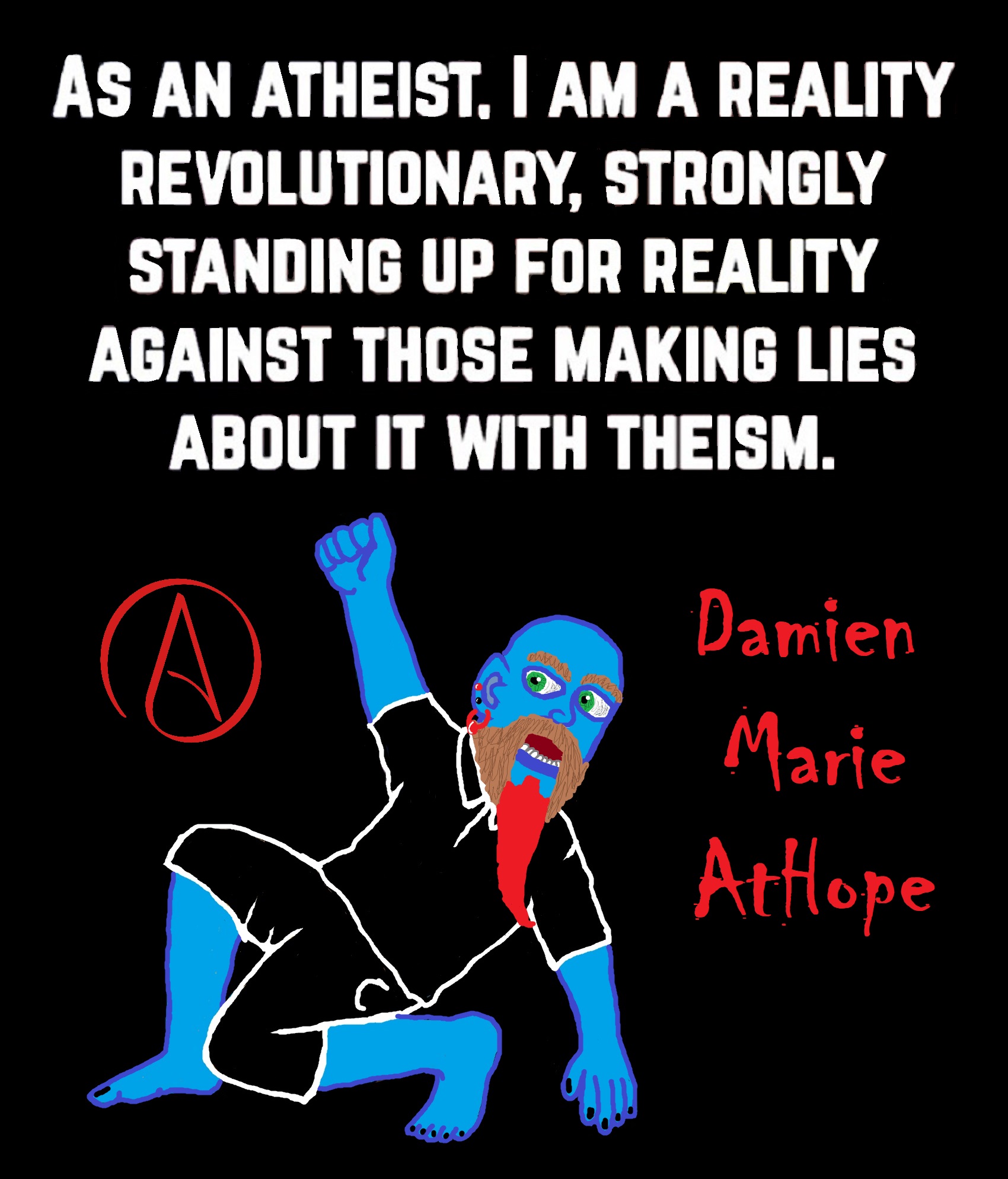

To me, there simply is and rightly must be an intellectual “ethical-belief-responsibility” (burden of proof) to justify the believed truth that is claimed to others is actually demonstrably as being true with valid and reliable reason and/or evidence when it is stated as such. Yes, intellectually one should provide (justificationism) for their assertions that map the sort of governing good habits of belief-formation, belief-maintenance, and belief-relinquishment.
Disproof by logical contradiction ‘A Logical Impossibility’
(especially in reductio ad absurdum arguments)
“In classical logic, a contradiction consists of a logical incompatibility between two or more propositions. It occurs when the propositions, taken together, yield two conclusions which form the logical, usually opposite inversions of each other. Contradiction by the creation of a paradox, Plato’s Euthydemus dialogue demonstrates the need for the notion of contradiction.” ref
“In the ensuing dialogue, Dionysodorus denies the existence of “contradiction”, all the while that Socrates is contradicting him: “… I in my astonishment said: What do you mean Dionysodorus? I have often heard, and have been amazed to hear, this thesis of yours, which is maintained and employed by the disciples of Protagoras and others before them, and which to me appears to be quite wonderful, and suicidal as well as destructive, and I think that I am most likely to hear the truth about it from you.” ref
“The dictum is that there is no such thing as a falsehood; a man must either say what is true or say nothing. Is not that your position?” Indeed, Dionysodorus agrees that “there is no such thing as a false opinion … there is no such thing as ignorance” and demands of Socrates to “Refute me.” Socrates responds “But how can I refute you, if, as you say, to tell a falsehood is impossible?.” ref
Here are a few of my blogs:
Addressing The Ethics of Belief and Logical Fallacies
Addressing a Theistic Philosopher with Fallacious Thinking
Faith Drunk thinking: Divine fallacy, Argument from Incredulity, and Argument from ignorance
Religious Fallacies: Appeal to Emotion and its Multiple Fallacy Subheadings
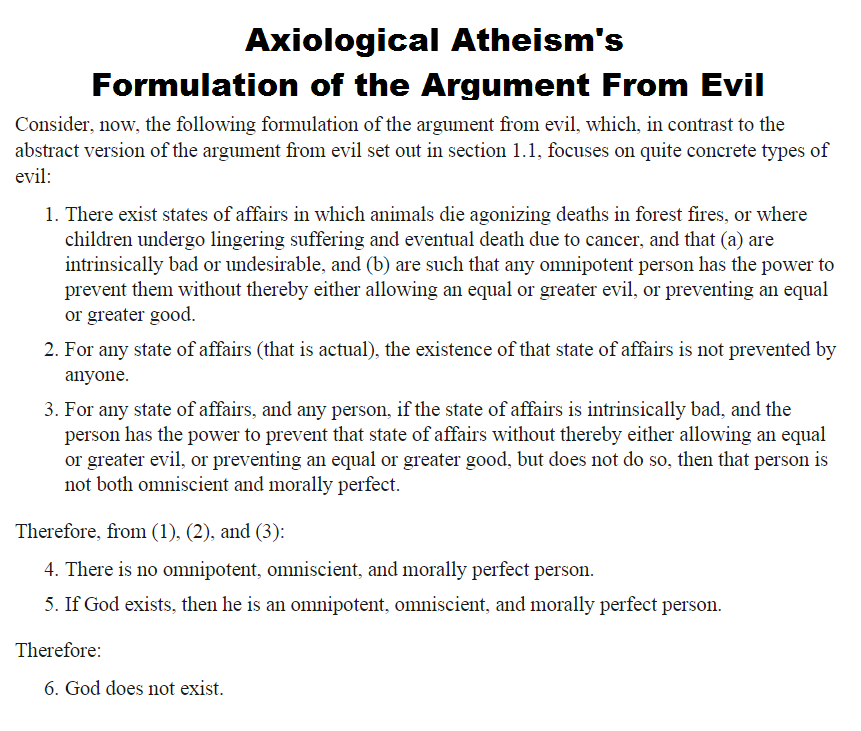
Picture link above: ref As it stands, this argument is deductively valid. (Here is a proof.)
I am an Axiological (Theoretical and Normative VALUE Theorist philosopher) Atheist
Formal Axiology: Another Victim in Religion’s War on Science by Dr. Kelleher
Interview of Formal Axiological Atheist Dr. William Kelleher
Axiological Atheism not Nihilist Atheism
Axiological Atheism is Intellectualism
Axiology and Value Theory?
“Value theory is a range of approaches to understanding how, why, and to what degree persons value things; whether the object or subject of valuing is a person, idea, object, or anything else. This investigation began in ancient philosophy, where it is called axiology or ethics.”– Wikipedia
“The term “Value Theory” is used in at least three different ways in philosophy. In its broadest sense, “value theory” is a catch-all label used to encompass all branches of moral philosophy, social and political philosophy, aesthetics, and sometimes feminist philosophy and the philosophy of religion — whatever areas of philosophy are deemed to encompass some “evaluative” aspect. In its narrowest sense, “value theory” is used for a relatively narrow area of normative ethical theory particularly, but not exclusively, of concern to consequentialists. In this narrow sense, “value theory” is roughly synonymous with “axiology”. Axiology can be thought of as primarily concerned with classifying what things are good, and how good they are. – (Stanford Encyclopedia of Philosophy)
“For instance, a traditional question of axiology concerns whether the objects of value are subjective psychological states or objective states of the world. But in a more useful sense, “value theory” designates the area of moral philosophy that is concerned with theoretical questions about value and goodness of all varieties — the theory of value. The theory of value, so construed, encompasses axiology, but also includes many other questions about the nature of value and its relation to other moral categories.” – (Stanford Encyclopedia of Philosophy)
“The division of moral theory into the theory of value, as contrasting with other areas of investigation, cross-cuts the traditional classification of moral theory into normative and metaethical inquiry, but is a worthy distinction in its own right; theoretical questions about value constitute a core domain of interest in moral theory, often cross the boundaries between the normative and the metaethical, and have a distinguished history of investigation.” – (Stanford Encyclopedia of Philosophy)

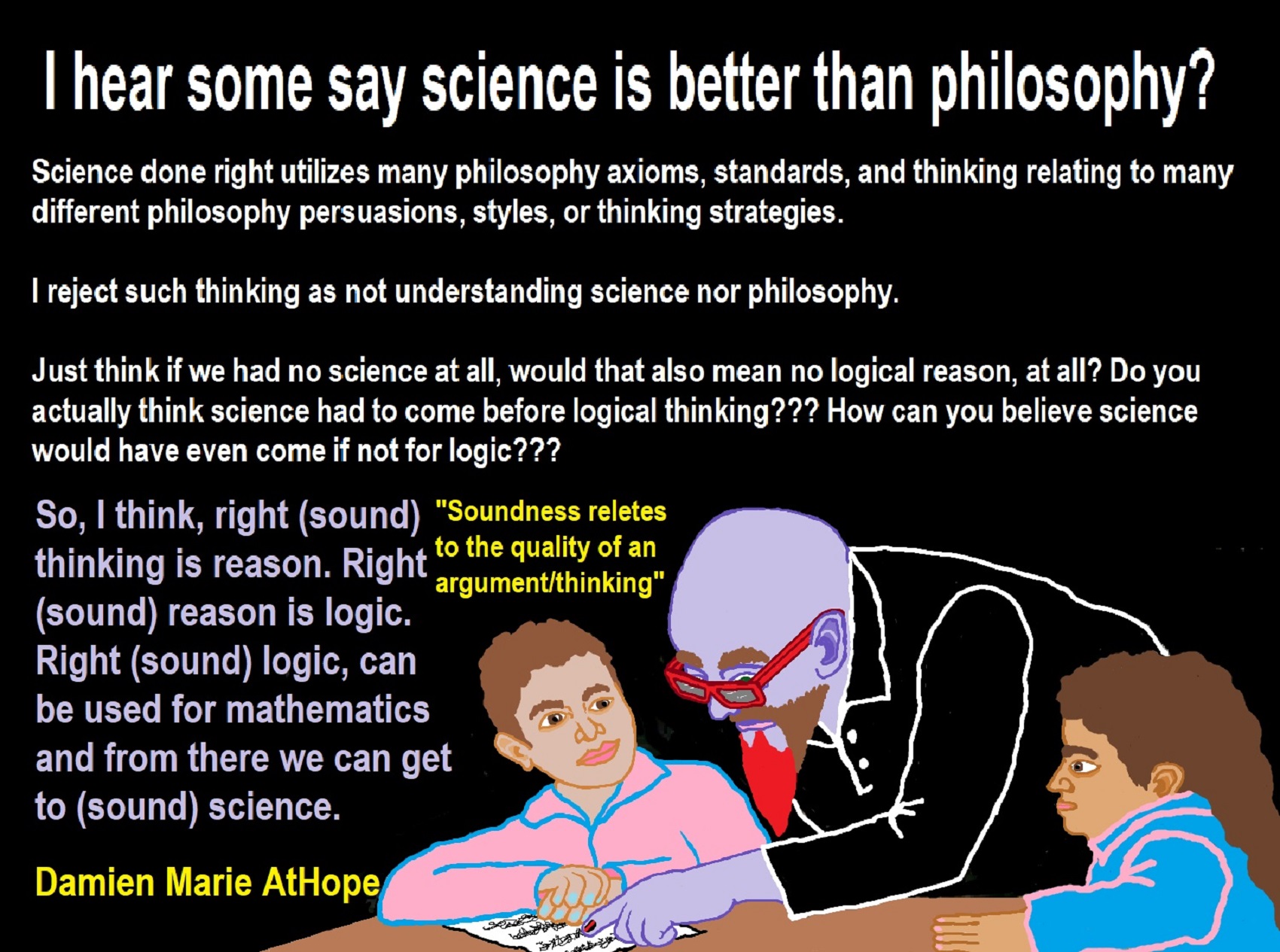
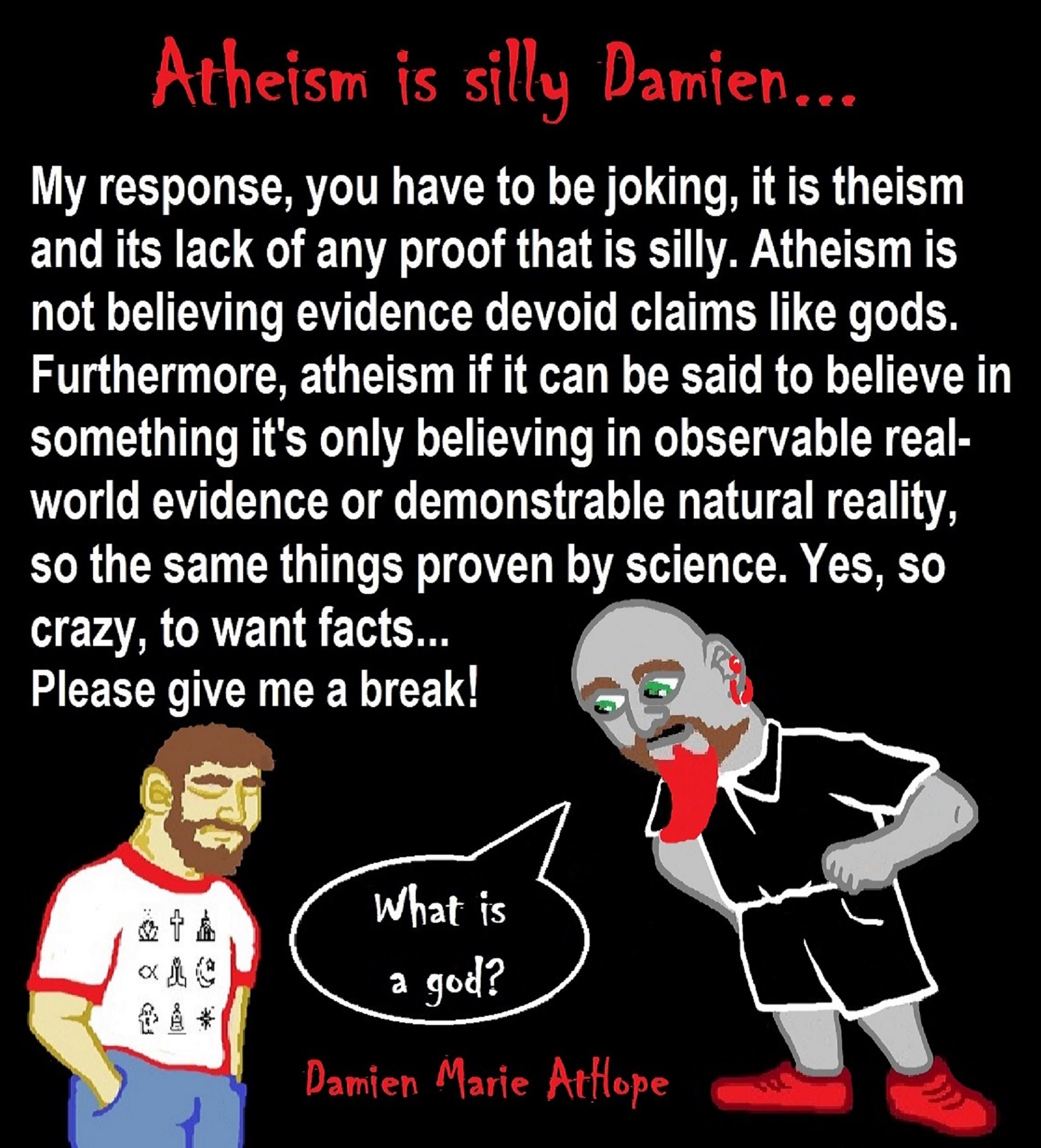

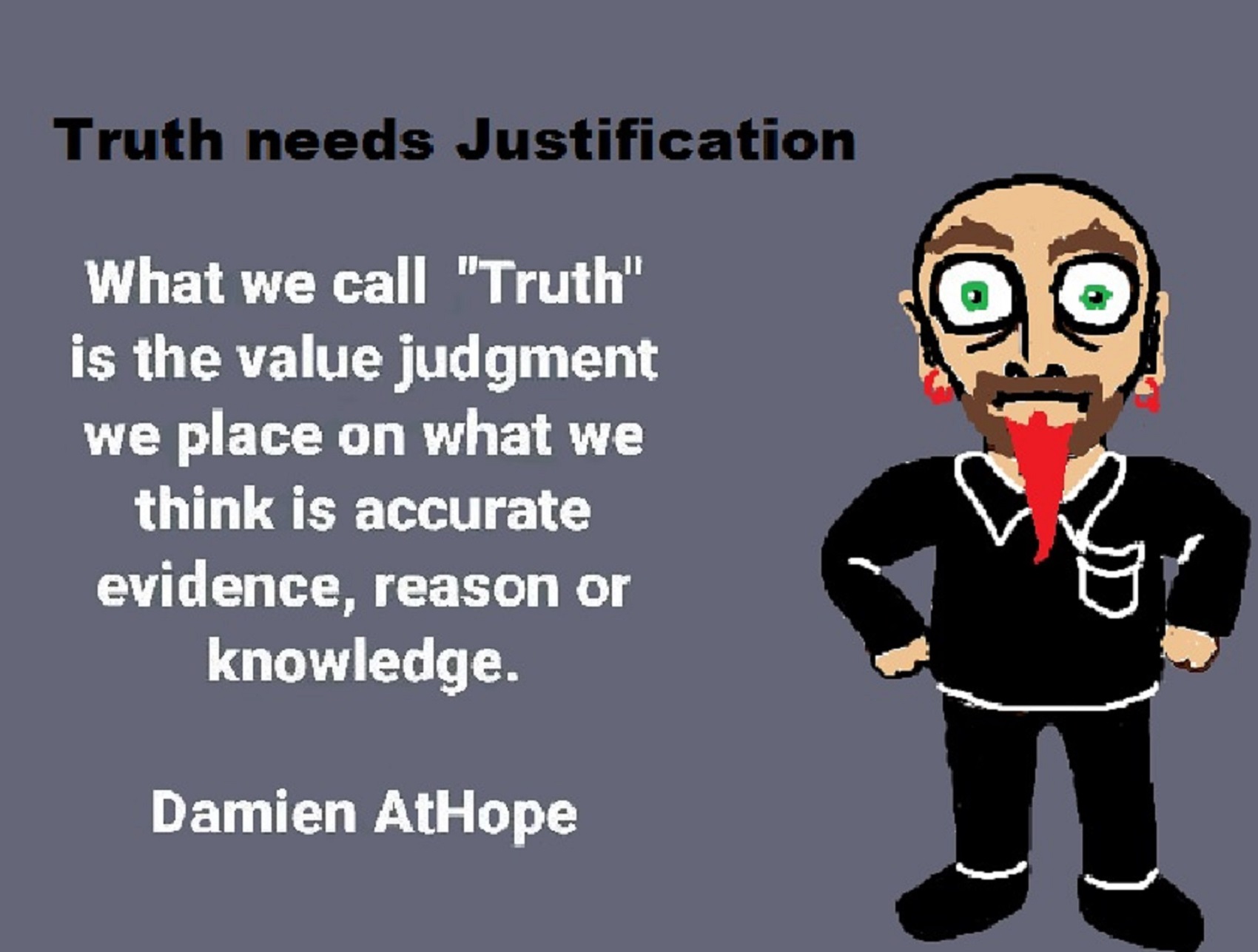
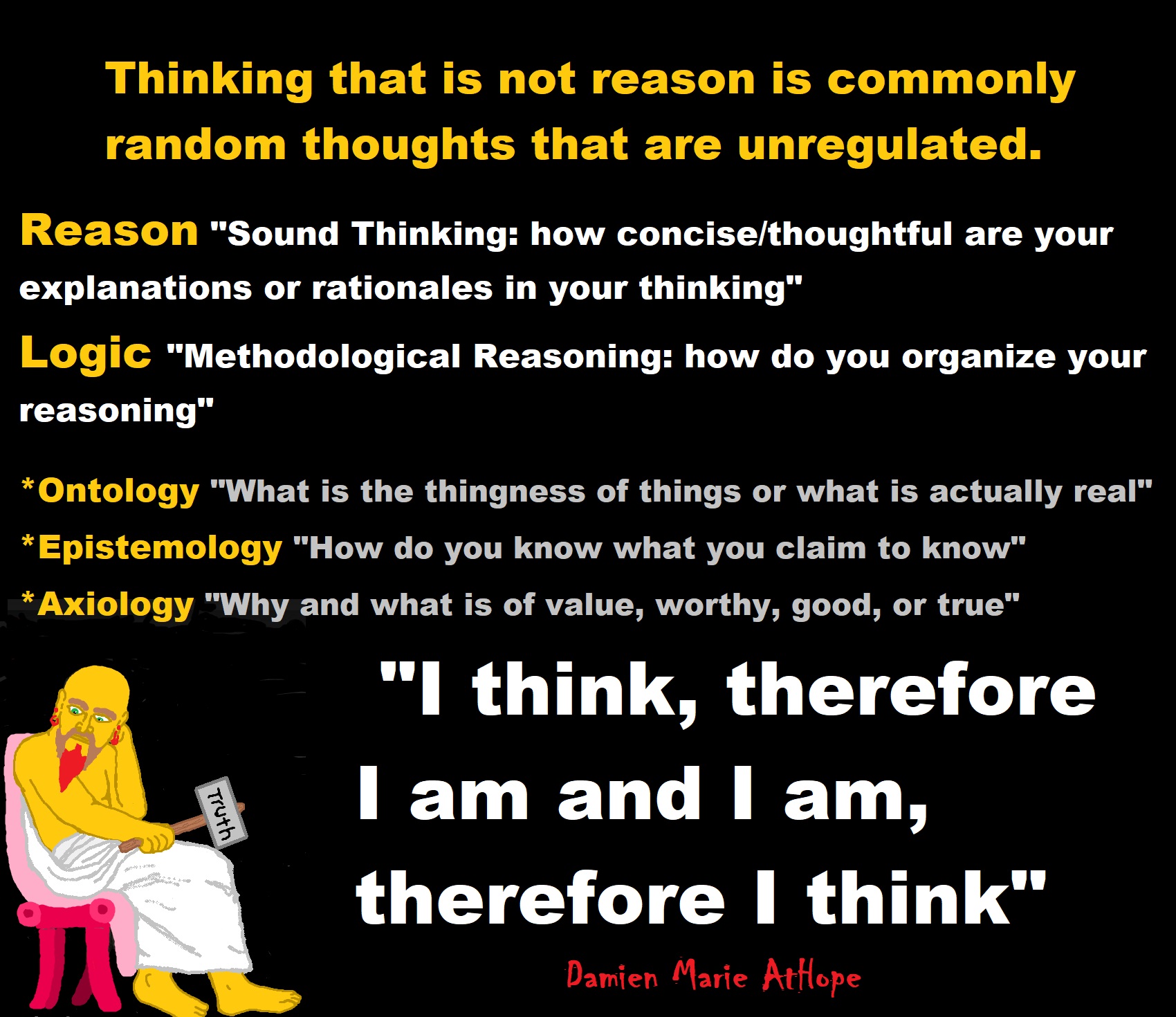
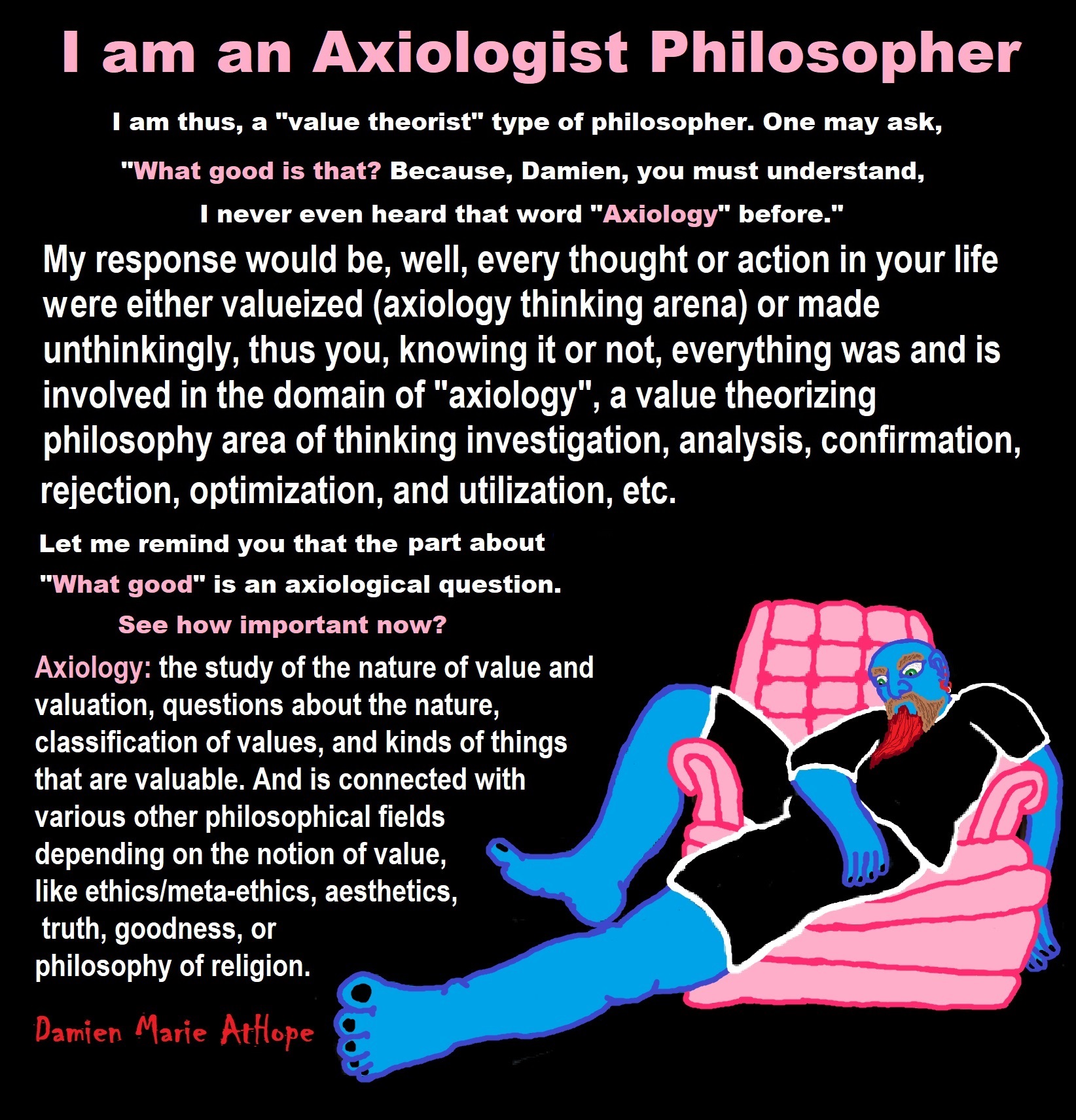
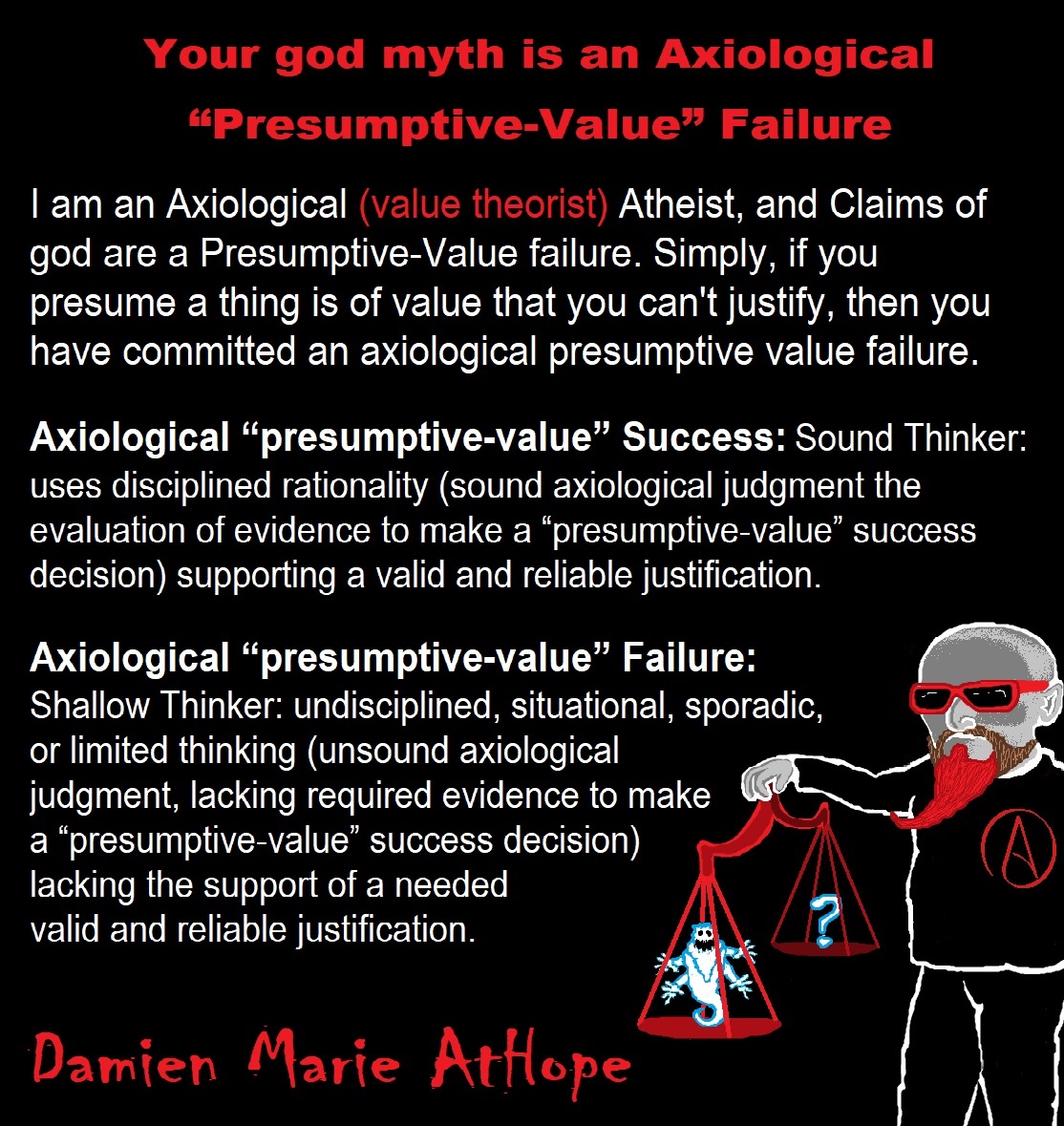
Axiological “Presumptive-Value” i.e. Your god myth is an Axiological “Presumptive-Value” Failure
As an Axiological (value theorist) Atheist, Claims of god are a Presumptive-Value failure. Simply, if you presume a thing is of value that you can’t justify, then you have committed an axiological presumptive value failure.
Axiological “presumptive-value” Success: Sound Thinker: uses disciplined rationality (sound axiological judgment the evaluation of evidence to make a decision) supporting a valid and reliable justification.
Axiological “presumptive-value” Failure: Shallow Thinker: undisciplined, situational, sporadic, or limited thinking (unsound axiological judgment, lacking required evidence to make a “presumptive-value” success decision) lacking the support of a needed valid and reliable justification.
Often I get disheartened to see that so many people can look at the unknown or that which is devoid of any and all understanding and claim to know that this is evidence for some god or another. How can they with all honesty even say that they somehow already know about an established scientific unknown, when all along it is what it ever was, which I will remind you, is currently holding a confirmed status of unknown. Thus, still fully intact as currently unknowable (I.e. you simply cannot justifiability claim that such unknown is god or evidence of god). What really is a god anyway? The term god equals mystery that is used to explain the mysterious leaving us with yet more mystery, thus explains nothing.
Claims of god are a Presumptive-Value failure. Simply, if you presume a thing is of value that you can’t justify, then you have committed an axiological presumptive value failure. Axiological “presumptive-value” Success: Sound Thinker: uses disciplined rationality (sound axiological judgment the evaluation of evidence to make a decision) supporting a valid and reliable justification.
No Caring God-Something Working in the World?
The following are some evidence against a caring god working in the world. A 2008 study of the current living conditions throughout Africa shows that more than one billion people do not have enough clean water to provide for their basic human needs. As a result, more than 2,500 children are dying each day. I guess it is that god gives us free will by keeping children from clean water in an unproportioned amount to the civilized science filled world. I ask you, does your god not hear their prayers? According to Missionaries of Africa (2008), there is a water crisis and diseases that are living in dirty water are wiping out entire villages and communities.
Does a god-something from Abrahamic religions exist?
Does the magic chanting of prayer seem to work? Suppose for a minute with the understanding of religious believe, if there was a loving god and it answered even some prayers, would not the most deserving be the non-sinning? Moreover, what living human could be said to be less sinning than a baby and thus the most deserving. In addition, babies or children are likely the ones religionists/fideists pray most often, for when they are in trouble.
Belief Changes Nothing?
Whatever circumstances you are in or not, has nothing to do with belief. If you are poor, belief does not make you not poor. If you are rich, you do not stay rich because of belief. You would think that poor people would have the benefit of the heavenly means and have god on their side, if anyone would, right? Overall, in 186 countries, first-day child death rates for babies are 6.9%. Where was god? In Angola, 8% of the babies die and 95% of the population is christian. In Congo, 7.5% of the babies die and 95.8 % of the population is christian. Whereas in Guinea-Bissau, 9% of the babies die and 10 % of the population is christian and in Niger 8.7% of the babies die and 5% of the population is christian. Therefore, being a christian and begging for an all-powerful all loving god myth to do something that any half-decent human being would hardly even need to be asked to help an innocent child, shows that belief seems to make no difference in the world because the world is godless and sadly babies die. Isaiah 45:7 “I form the light, and create darkness: I make peace, and create evil: I god do all these things.” Ref
The Bible god is Not Loving nor Ethical?
Just think, the bible god “could” have banned slavery or shellfish and he chose to ban shellfish (Leviticus 11:12) and actually support slavery (Leviticus 25:44-46) even in the new testament (Ephesians 6:5; 1 Timothy 6:1-2) and Jesus clearly approves of beating slaves even if they didn’t know they were doing anything wrong (Luke 12:47-48) how crazy and immoral is that for a man-made fairy tales. I will openly say faith is foolish lacking credibility and it is stupid to hold on to beliefs that are disproved by science fact. However, I don’t usually call people names even ones saying things I believe are ridiculous nor do I belittle them instead I strive to and support attacking the thinking and not the person.
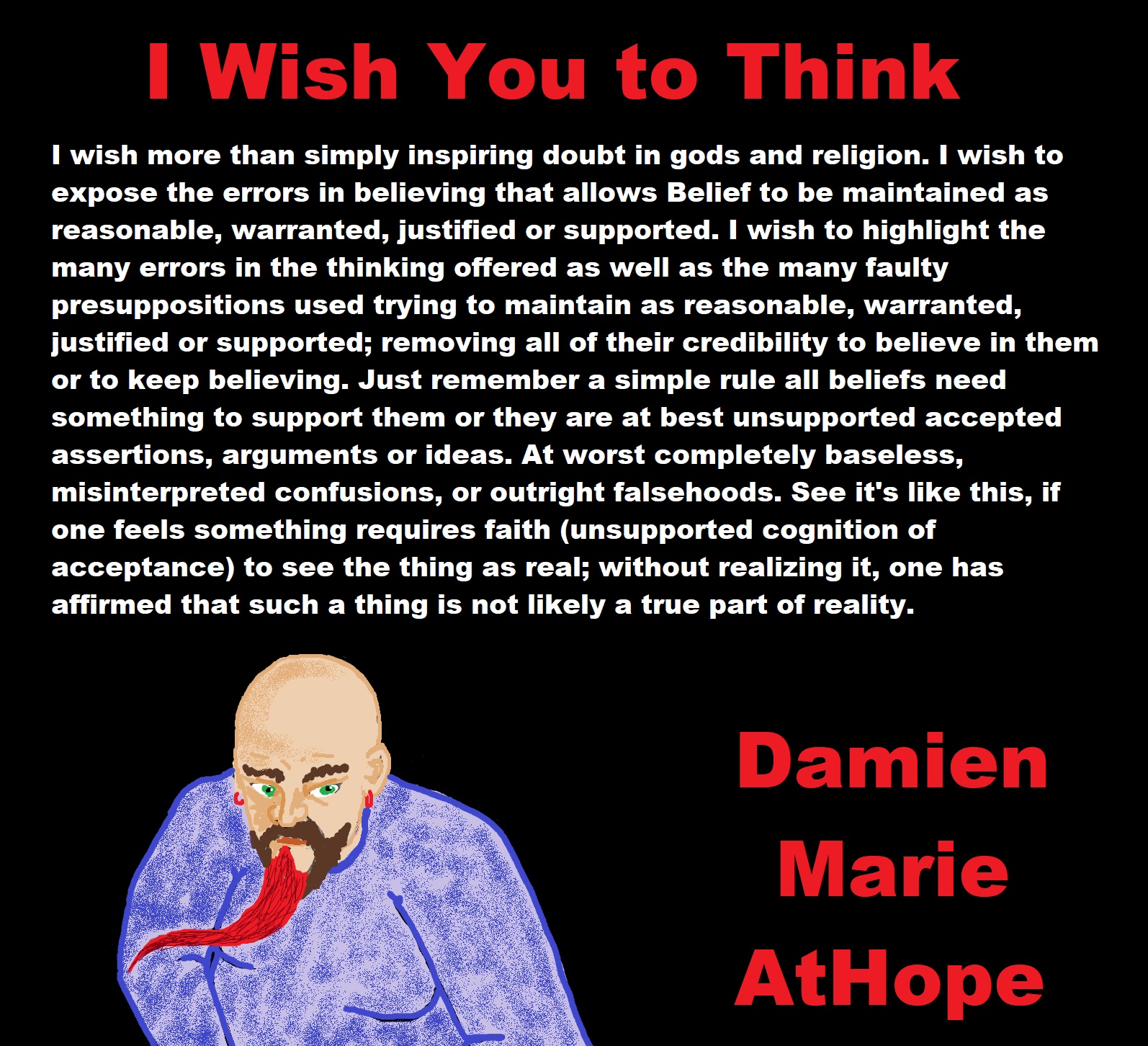
“Ok, So basically, “Presumptive-Value” is the difference between reasoning with evidence and without?” – Questioner
My response, Well with or without valid justification because of evidence. As in you can’t claim to know the value of something you can’t demonstrate as having good qualities to attach the value claim too so if you lack evidence of the thing in question then you cannot validate its value. So it’s addressing a kind of justificationism (uncountable) Theory of justification, An (philosophy standard) approach that regards the justification of a claim as primary, while the claim itself is secondary; thus, criticism consists of trying to show that a claim cannot be reduced to the authority or criteria that it appeals to.
Think of is as a use-matrix. If I say this is of great use for that, can you validate its use or value, and can I use this as a valid method to state a valid justification for my claims without evidence to value judge from? No, thus an axiological presumptive-value failure as a valid anything.
“Theory of justification is a part of epistemology that attempts to understand the justification of propositions and beliefs. Epistemologists are concerned with various epistemic features of belief, which include the ideas of justification, warrant, rationality, and probability. Loosely speaking, justification is the reason that someone (properly) holds a belief. When a claim is in doubt, justification can be used to support the claim and reduce or remove the doubt. Justification can use empiricism (the evidence of the senses), authoritative testimony (the appeal to criteria and authority), or reason.” – Wikipedia
“Presumptions are things that are credited as being true until evidence of their falsity is presented. Presumptions have many forms and value (Axiology) is just one. In ethics, value denotes the degree of importance of something or action, with the aim of determining what actions are best to do or what way is best to live (normative ethics), or to describe the significance of different actions. It may be described as treating actions as abstract objects, putting VALUE to them. It deals with right conduct and living a good life, in the sense that a highly, or at least relatively high valuable action may be regarded as ethically “good” (adjective sense), and that an action of low value, or relatively low in value, may be regarded as “bad”. What makes an action valuable may, in turn, depend on the ethic values of the objects it increases, decreases or alters. An object with “ethic value” may be termed an “ethic or philosophic good” (noun sense). Values can be defined as broad preferences concerning appropriate courses of actions or outcomes. As such, values reflect a person’s sense of right and wrong or what “ought” to be. Equal rights for all”, “Excellence deserves admiration”, and “People should be treated with respect and dignity” are representatives of values. Values tend to influence attitudes and behavior and these types include ethical/moral values, doctrinal/ideological (religious, political) values, social values, and aesthetic values. It is debated whether some values that are not clearly physiologically determined, such as altruism, are intrinsic, and whether some, such as acquisitiveness, should be classified as vices or virtues.” ref, ref

As an atheist, I feel more wonder than I did as a theist because I thought, “big deal” to any wonder I experienced, thinking god could do anything. So with such an unrealistic mindset, everything lost its wonder but it’s the opposite as an atheist. As a theist, the world was full of superstitions and supernatural magic possibilities and thus utilized thinking that was not in the real world. As an atheist all I have now is the real world, not that all atheists seem to get this, we all are in a real world devoid of magic anything, therefore, everything adds to my feeling of awe. There should be little debate with atheist acknowledging discernable reality compared to theists with non-reality claims. Yes, I have way more awe and wonder as an atheist than I ever had as a theist because as a theist anything was possible with god. Therefore, as a theist, things of the world where not that amazing. However, as an atheist grasping what an absolute accidental or how random things are, with a 95 to 99 % of all life ever existing on this planet went extinct. I am thoroughly amazed we are even here the evolved children of ancient exploded stars, likely born in galaxies born in supermassive black holes, it’s all amazing.
“Atheism is a juvenile and irrational philosophy, dude.” – Challenger
My response, And you know this how? What is a god?
“You’ve drawn a false equivalence, Damien. There is nothing that precludes a theist from experiencing awe in light of the wonders of the universe. I’m a theist and I’m into black holes, for example. It seems to me that your theism was simply defective and needlessly limiting. Why do you identify with what you dislike? Your bio leads with ‘atheist’ and ‘antitheist’; thus, you define yourself according to your position regarding something which you purport to reject.” – Challenger
My response, You are making a Strawman Fallacy in relation to my post as I stated this from my “own” experience so try again to answer my questions you avoided. In case you forgot your burden of proof obligation to your claim as well, you stated a truth claim: “Atheism is a juvenile and irrational philosophy”. So, you claim to know this how? And, what is a god? And then instead of answering my questions honestly, you further employed a red herring to distract from your burden of proof to answer my questions by stating: “Why do you identify with what you dislike? Your bio leads with ‘atheist’ and ‘antitheist’; thus, you define yourself according to your position regarding something which you purport to reject.” So, answer how you claim to know “Atheism is a juvenile and irrational philosophy? As well as, what is a god?
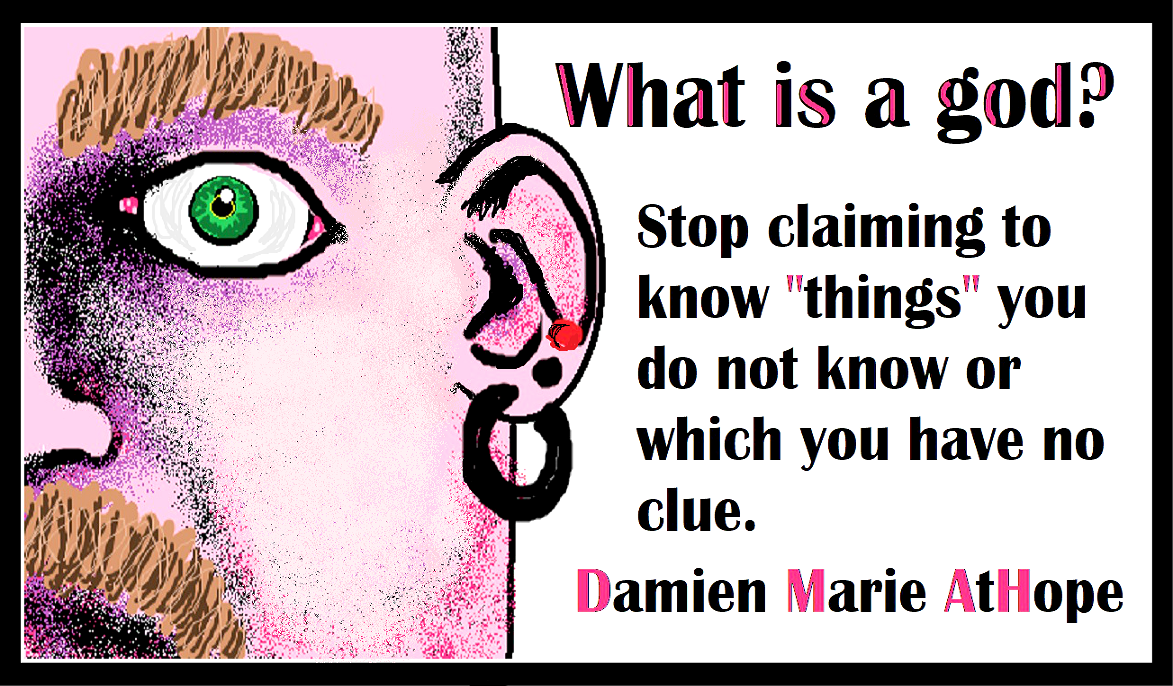
Really, What is a god?
If you think you believe in a god, “what do you mean by god,” saying a name tells me not one thing about the thing I am asking to know “its” beingness/thingness/attributes/qualities. Thus, what is the thing “god” to which you are talking about and I want you to explain its beingness/thingness/attributes/qualities? Religious/theistic people with supernatural beliefs often seem as though they haven’t thought much about and that is something we can help using ontology questions about the beingness/thingness/attributes/qualities they are trying to refer too. What do you mean by god, when you use the term god?
And, I am not asking you for the name you attach to the thing you label as a god. I don’t need to know what the god you believe is known “by.” I am asking, what is the thing you are naming as a god and what that thing is, its qualities in every detail like all things have if they are real. Are you just making stuff up or guessing/hoping or just promoting unjustified ideas you want to believe, what is a god? Do you want what is true or want what you believe without concern for what may actually be true?
If you are a religious believer, may I remind you that faith in the acquisition of knowledge is not a valid method worth believing in.Because, what proof is“faith”,of anything religion claims by faith, as many people have different faith even in the same religion?
A Coherent Definition of god?
I am an Ignostic atheist and not only do not believe in the term gods I reject that even the term or concept of god has any real thing or true reality connected definition. To me there is no one coherent definition of god even if they think articulation proves real meaning, this proves little more than me saying someone believes in a “Triangle-Square-Circle”. To the term god I thus regard it as empty of real meaning and or real definition constancy, so I see it as something that is not really known or knowable or coherently define-able as a real object even if it can add arbitrary words to articulate it is still not something outside man-made arbitration.
One may say no the god definition is real one cannot say it is not, as most people generally know what the term god means thus that cannot be rejected. Really?? I could be misunderstanding this reasoning put against Ignostic Atheist thinking but to me it seems to hold the opinion, saying I must accept the god concept as something definable in reality because of ad populum? In argumentation theory, an argumentum ad populum (Latin for “appeal to the people”) is a fallacious argument that concludes that a proposition is true because many or most people believe it: “If many believe so, it is so.”
Let’s look at the “gOD claim” with “The Hammer of Truth” (scientific philosophy: Ontology, Epistemology, & Axiology)
Taking down god assertions in 123
1. What is a goD? (an ontology question)
2. How can one claim to know anything about a god? (an epistemology question)
3. How valid, good or worthy is a claim that one knows anything about a god? (an axiological question)
To me, the god-something claim is a the Presuppositional Error it assumes a unsupported oncology assumptions. First, truly what is a god and how can you claim to know about it? Guessing is not evidence, neither is wild, unfounded assertions that are written in reality devoid documents such as holy books. Atheists do not have to prove that gods do not exist, as gods have never been proven to exist. Nor is there any good reason to think they could exist! In the branch of linguistics known as pragmatics, a presupposition is an implicit assumption about the world or background belief relating to an utterance whose truth is taken for granted in discourse.
Let me explain why as an axiological atheist (value theory atheist) even the belief in the concept of god is ethically vile to me. God belief is inherently immoral to me it is the belief that supports an all powerful being who willfully allows suffering, something that no ethical person would tolerate if they had the ability to do otherwise. Moreover, a common attribute of god belief is support of this claimed greater being of high intelligence and self will forcing its will and standards on other beings of high intelligence and self will. This force is unethical and abusive to the rights of humanity. Furthermore, many who subscribe to this force abusive relationship god claim an even more revolting ethical atrocity called hell where eternal horror and suffering is dished out by direct will of the claimed stronger immoral god being against the defenseless undeserving subjugated humanity. Thus, being one, who values rights and ethics, it sickens me to even speak of such willful misconduct of justice. Your god concept is vile… (axiology value judgment).
The god claim is like a clown car rolling in from out of nowhere and it seems like it is only one or possibly a few bad ideas, but no. No, it is a dark festival that masquerades as truth but it is only an evil funhouse of mirrors that distorts reality. The term god is an empty meaningless term and if it was not for man-made myths or wild speculations which are usually the misinterpretations of nature, no one would claim to know what a god is or could be. Unless one falls back to the circus of fallacies in the magic big top of fideism and the faith fallacy that you do not need anything but faith to validate, justify, or prove any mystical belief you so desire.
The God Fallacy is that there is no epistemically warranted or justifiably reliable evidence for god(s) existence; most ideas offered are stretches of unreason promoting seemingly implausible knowledge or reality claims. Moreover, beyond this is the self-evident realization that there is no reliable and /or verifiable evidence that could be used to define what god term actually is or could be assured to involve. Because it is never good to just randomly conceptualize or fabricate from bias trying to force connections into existence. epistemically warranted or justifiably reliable evidence or even a preset of proofs that do not hold gaps a believer want to fill with an arbitrary beliefs things need a god explanation and yet again what does god even mean. One his furthered nothing with god talk until they offer clear links to understand what could rightly make up the empty term g. o. d. (Group Originated Delusion).
Any reasonable thinker should conclude that clear links to any knowledge are required to comprehend what to ask, where to look, or what to state is involved. This would seem especially important since what is on the line is the actual truth or falsehood of the great believed “IT” of somethingism. Do you wish to just assemble or make up your god thinking as you go, greedily forcing anything that seems slow enough to not get away or is the actual truth in reality you seek even if godless as finding the true is the main pursuit, as your aim is what true right, taken with the deepest integrity? One should desire such intellectual rigor in order to even distinguish if we need to inquire or have a way to question a possibility of existence, as this empty termed “it” god of nothingism is unknown in every way even in its “it” status outside of faith superstitions, Dogmatic–Propaganda, delusion, myths and lies.
Religion is just Dogmatic–Propaganda, such as how it is wrong to start with full belief built only upon faith: then search and anything unknown, claiming it somehow justifies or is evidence for their specific God Fallacy.
Another attribute of the God Fallacy is that believers seem to insinuate, if they can in anyway demonstrate (even the possibility of a thing that could seem to be a something attributed to a god) then they have proved that the god they believe in is true. And yet is it not true that man will always fail to prove a specific god? Religion is big on claims but small on reasoning. Take the Abrahamic faiths; they propose a very specific, well-defined god, but in reality, they advocate a very unspecified god; a naturalistic, inferred-theistic-creationism or the god of intelligent design. In other words, when pressed to demonstrate god in the world, or as the reason for the big bang, they can at best only try to surmise a magical power or unknown and unknowable possible something as the “creator.” But the question needs to asked, how does that prove any specific god? So even if we were to concede, for the sake of argument, that some god, phantom-menace started things, they still have to show that this god is the very same as the god in which they believe.
The truth is, for all the appeals they make to nature in order to justify their god, not one appeal is valid in any way to confirm that their god (and only their god) is true, they must always leave the facts and return to faith. Thus, these haughty theists always fail to show any naturalistic reasons for believing in their special-needs god. What they show instead is a belief, not in the god of some myth or scriptures, but belief in a projected somethingism-god attributed to nature, which is indistinguishable from a nothingism, godless reality attributed by nature.However, the issues don’t stop there, as they also would have to prove, or give warrant, as well as justification for every attribute and claimed character trait attached to their specific god using only natural arguments, not some Holy Book or otherworldly revelation.
Axiology “Goodness-for” questions/assertion: Judge/Jury assesses and value judges because of qualities in or lacking in the claim. How valid, good or worthy is a claim that one knows anything about a god? (an axiological question)
*Axiology, (understanding what is good or valuable as well as what is evil or unvaluable like how the stories about theist theistic gods are often racist, sexist, homophobic, transphobic intersexphobic, xenophobic, etc. Thus, they are directly against humanity and thus are evil and unvaluable. Unvaluable; as in the god concept you have is evil and demonstrably harmful and thus is highly unvaluable to humanity) think in these type of axiology (value theory) questions to test the prsumptive value being offered in relation to a god-something existing:
-Why are your objects of proposed value subjective psychological states or objective physiological external world states for your claim?
-Why do your purposed descriptive words fit qualities for valuation (such as “powerful”, “knowing”, and “present” in the Omnipotent: all-powerful, Omniscient: all-knowing, and Omnipresent: all-present god assertion) your claim?
-Why is your value-for, worth-for, and/or goodness-for claims different than other similar claims?
What value do you think what you are saying has and to what level of proof do you feel truth needs as well as how do you ensure Accuracy” (asking to find the truth or as usual expose the lack of a good Axiology)
“Axiology (value theory) definition is – the study of the nature, types, and criteria of values and of value judgments. In this narrow sense, “value theory” is roughly synonymous with “axiology”. Axiology can be thought of as primarily concerned with classifying what things are good, and how good they are. In its broadest sense, “value theory” is a catch-all label used to encompass all branches of philosophy— whatever areas of philosophy are deemed to encompass some “evaluative” aspect.” ref, ref
Bigfoots, Unicorns, and Gods the rational conclusion using axiology
So how do we form rational conclusions? More importantly, how do we differentiate between the levels involved to establish a conclusions rational viability.
It takes axiology or the value judgment the worthiness or lack thereof in relation to the available reason and evidence.
So let’s start with the axiological viability of Bigfoots
There is no available evidence for Bigfoots.
But is their proposition outside of reason?
Always start in reality from the evidence we do know, such as a primate/nonhuman hominid close to that of both humans and other nonhuman primates is not entirely outside all possibility of reason even though lacking all evidence. Therefore, belief is not warrant and the axiological worthiness of possibility is low enough to motivate disbelief.
The axiological viability of Unicorns (ie. a horse with a single horn on its head)
There is no evidence for Unicorns.
But is their proposition outside of reason?
As always start in reality from the evidence we do know, such as by looking at the evolution of the horse not once was there a horn on any of the several stages of animals to the horse we know today. So it is relatively outside of possibility though as it is still only claiming non-fantastic attributes it is only somewhat ridiculous. Therefore, belief is not in any way warranted and the axiological worthiness is so low to highly support disbelief.
Now the axiological validity of Gods
There is no evidence for Gods.
But is their proposition outside of reason?
As always start in reality from the evidence we do know, such as never in the history of scientific research or investigation has any supernatural claims shown to be true. So it is completely outside of possibility and is utterly ridiculous. Therefore, belief should be rejected as there are no warrants at all and it is axiologically unworthy to such a preponderance to demand disbelief.
“However, keep in mind that absence of evidence is not evidence of absence (logically speaking).” – Challenger
My response,
“Evidence of absence is evidence of any kind that suggests something is missing or that it does not exist. The difference between evidence that something is absent (e.g., an observation that suggests there were no dragons here today) and simple absence of evidence (e.g., no careful research has been done) can be nuanced. Indeed, scientists will often debate whether an experiment’s result should be considered evidence of absence, or if it remains absence of evidence.” ref
“The argument from ignorance for “absence of evidence” isn’t necessarily fallacious, for example, that a potentially life saving new drug poses no long term health risk unless proved otherwise. On the other hand, were such an argument to rely imprudently on the lack of research to promote its conclusion, it would be considered an informal fallacy whereas the former can be a persuasive way to shift the burden of proof in an argument or debate. Carl Sagan criticized such “impatience with ambiguity” with cosmologist Martin Rees‘ maxim, “Absence of evidence is not evidence of absence”. ref
“A negative claim is a colloquialism for an affirmative claim that asserts the non-existence or exclusion of something. Claiming that it is impossible to prove a negative is a pseudologic, because there are many proofs that substantiate negative claims in mathematics, science, and economics, including Arrow’s impossibility theorem. There can be multiple claims within a debate. Nevertheless, whoever makes a claim carries the burden of proof regardless of positive or negative content in the claim. A negative claim may or may not exist as a counterpoint to a previous claim.” ref
“A proof of impossibility or an evidence of absence argument are typical methods to fulfill the burden of proof for a negative claim. Philosopher Steven Hales argues that typically one can logically be as confident with the negation of an affirmation. Hales says that if one’s standards of certainty leads them to say “there is never ‘proof’ of non-existence“, then they must also say that “there is never ‘proof’ of existence either”. Hales argues that there are many cases where we may be able to prove something does not exist with as much certainty as proving something does exist.” ref
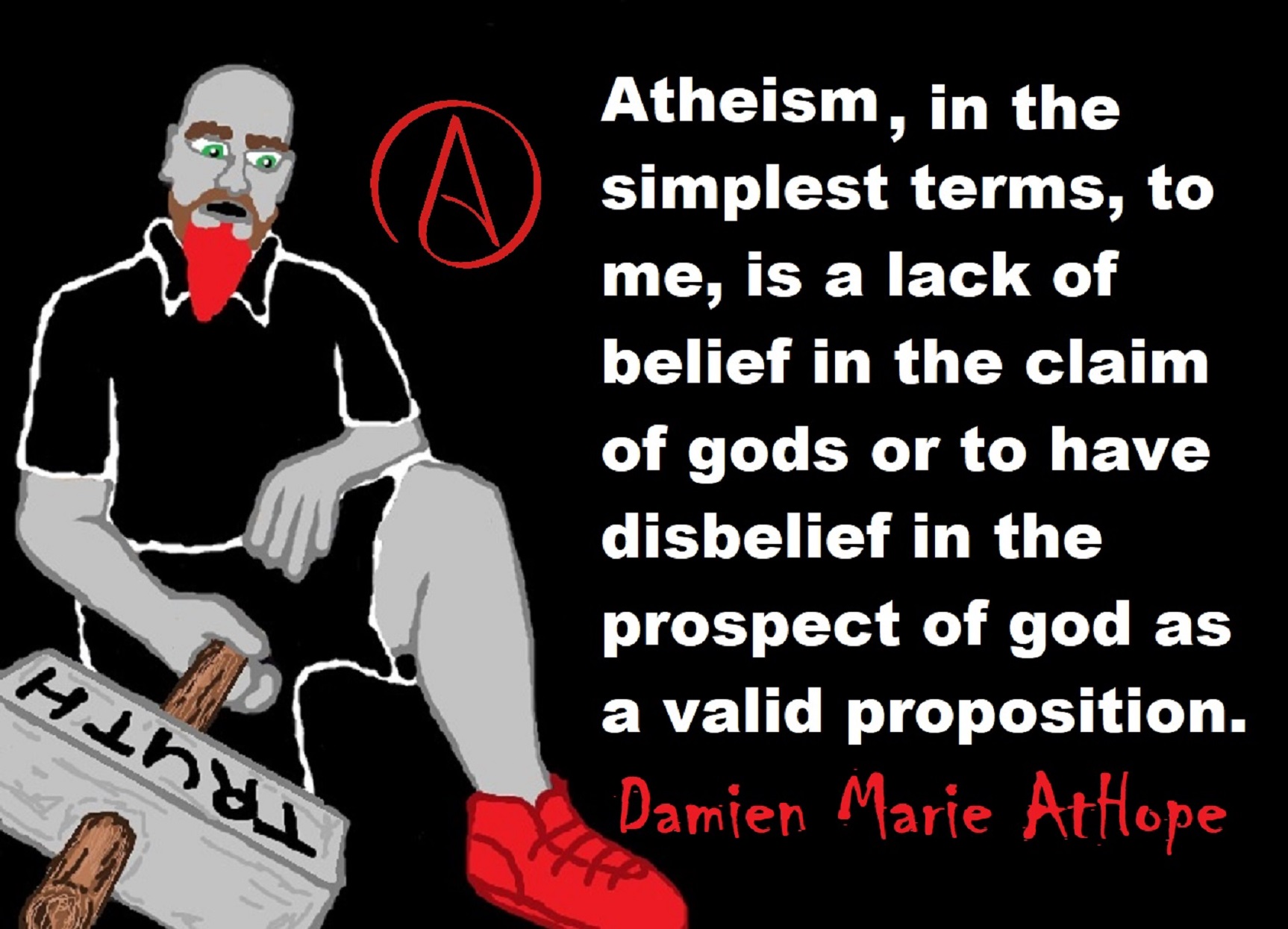
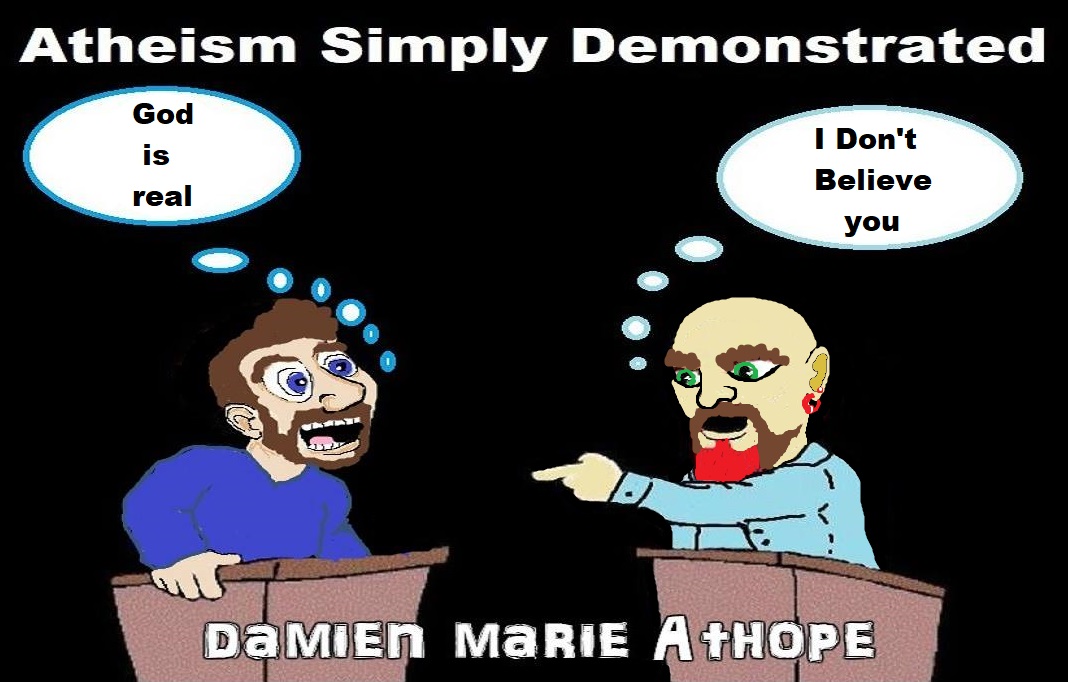
*Here is a chat with William Ferraiolo the theistic author of “Life Worth Living, A Meditations on God, Death and Stoicism“
My response, First, What is a god?
“Answers vary. If you read what I actually wrote, I think you’ll see that I do not claim to know much about the existence or nature of God or any transcendent realm.” – William Ferraiolo
My response, So are you claiming to know anything towards a god-something at all, as in do you assert knowing some kind of a god-something’s existence or nature of a god-something or any transcendent realm? Do you state personal god-something belief without assuming its truth?
“I don’t. The full answer is in the book. The title was chosen by the publisher.” – WilliamFerraiolo
My response, Gotcha
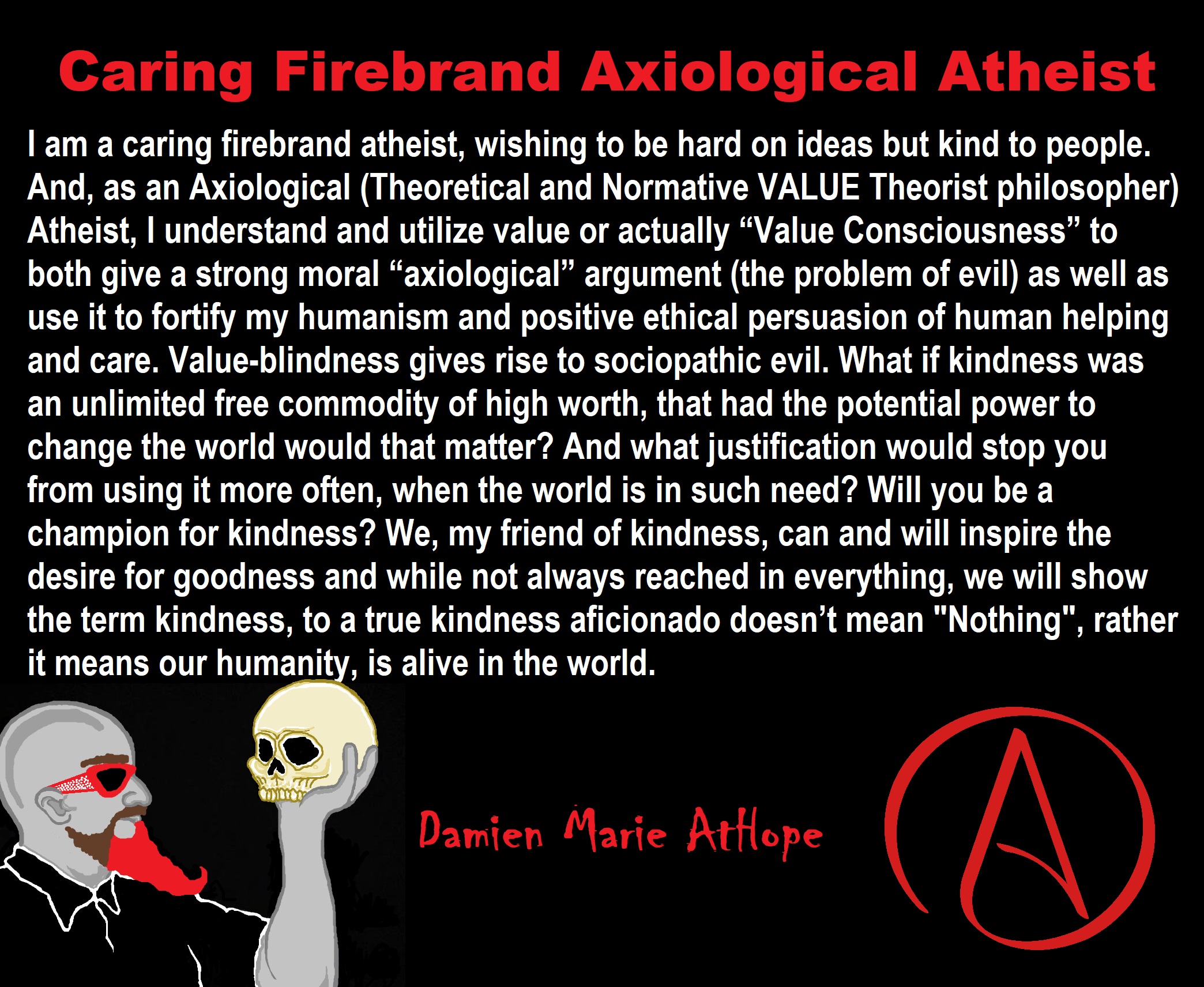
Truth Navigation: Techniques for Discussions or Debates
I do truth navigation, both inquiry questions as well as strategic facts in a tag team of debate and motivational teaching.
Truth Navigation and the fallacy of Fideism “faith-ism”
Compare ideas not people, attack thinking and not people. In this way, we have a higher chance to promote change because it’s the thinking we can help change if we address the thinking and don’t attack them.
My eclectic set of tools for my style I call “Truth Navigation” (Techniques for Discussions or Debates) which involves:
- *REMS: reason (rationalism), evidence (empiricism), and methodological “truth-seeking” skepticism (Methodic doubt) (the basic or general approach)
- *The Hammer of Truth: ontology, epistemology, and axiology (methodological use of philosophy)
- *Dialectical Rhetoric = truth persuasion: use of facts and reasoning (motivational teaching)
- *Utilizing Dignity: strategic dignity attacks or dignity enrichments (only used if confusion happens or resistance is present)
Asking the right questions at the right time with the right info can also change minds, you can’t just use facts all on their own. Denial likes consistency, the pattern of thinking cannot vary from a fixed standard of thinking, or the risk of truth could slip in. Helping people alter skewed thinking is indeed a large task but most definitely a worthy endeavor. I am a deep thinker, just striving for truth. Moreover, I am a seeker of truth and a lover of that which is true.
Bigfoots, Unicorns, and Gods?

Here are a few of my blogs on Agnosticism:
Discussions on Agnosticism and Atheism
Theists and Atheists as well as Agnostics?
Weak Theism and Weak Atheism being called Agnostic?
Challenging Agnosticism Assumptions
Agnosticism: Non-Standard Epistemology
Agnosticism Beliefs Involve “FOLK LOGIC” Thinking?
My Anti-Agnostic Atheism Thinking
A Challenge to My Anti-Agnostic Thinking?
Agnosticism No Thanks, I am Ignostic
“The Hammer of Truth” -ontology question- What do You Mean by That?
Explaining Axiological theism, Axiological agnosticism, and Axiological atheism
Marquis Amon “There is no evidence of god, nor is there any modern scientific hypothesis that supports the idea of a god, followed by the very slim mathematical probability. Next, if we say god is synonymous with deity(general universe creator) then we look at all knowledge we have in the universe, the evidence, or even implication to suggest the possibility is literally none. With this said, anything beyond “universe creator” for god would just be wild conjecture about this god. I am not saying gods are strictly universe creators, that would be fallacy to mythology which is where we get gods definitions, not very scientific, eh? This goes into your lack of coherent definition. What is a god? What do you mean by god? Essentially disambiguous and irrelevant, going back to evidence we can’t apply ontology to things without attributes. To the point, you say god is nothing, if god has the attributes of nothing, it doesn’t exist. So, you are right. Next, suppose god does exist but is “unknowable”, meaning beyond human understanding. It still doesn’t exist because we can’t apply any knowledge to it or discern if it does anything in reality. That is what I call functionally nonexistent, it does not interact with reality and therefore meaningless. I don’t think you can be agnostic, because you are not sure if something undefined exists or not. In other words to me, agnostic is a logical fallacy.You can’t be unsure of something that exists which lacks any attributes. “I am unsure if nothing exists.” Literal translation.”
My response, Your statment, “Going back to the evidence we can’t apply ontology to things without attributes” is wonderful. And addresses an axiological presumptive-value failure. Axiological “presumptive-value” Failure: Shallow Thinker: undisciplined, situational, sporadic, or limited thinking (unsound axiological judgment, lacking required evidence to make a “presumptive-value” success decision) lacking the support of a needed valid and reliable justification. Claims of god are a Presumptive-Value failure. Simply, if you presume a thing is of value that you can’t justify, then you have committed an axiological presumptive value failure. Axiological “presumptive-value” Success: Sound Thinker: uses disciplined rationality (sound axiological judgment the evaluation of evidence to make a decision) supporting a valid and reliable justification.
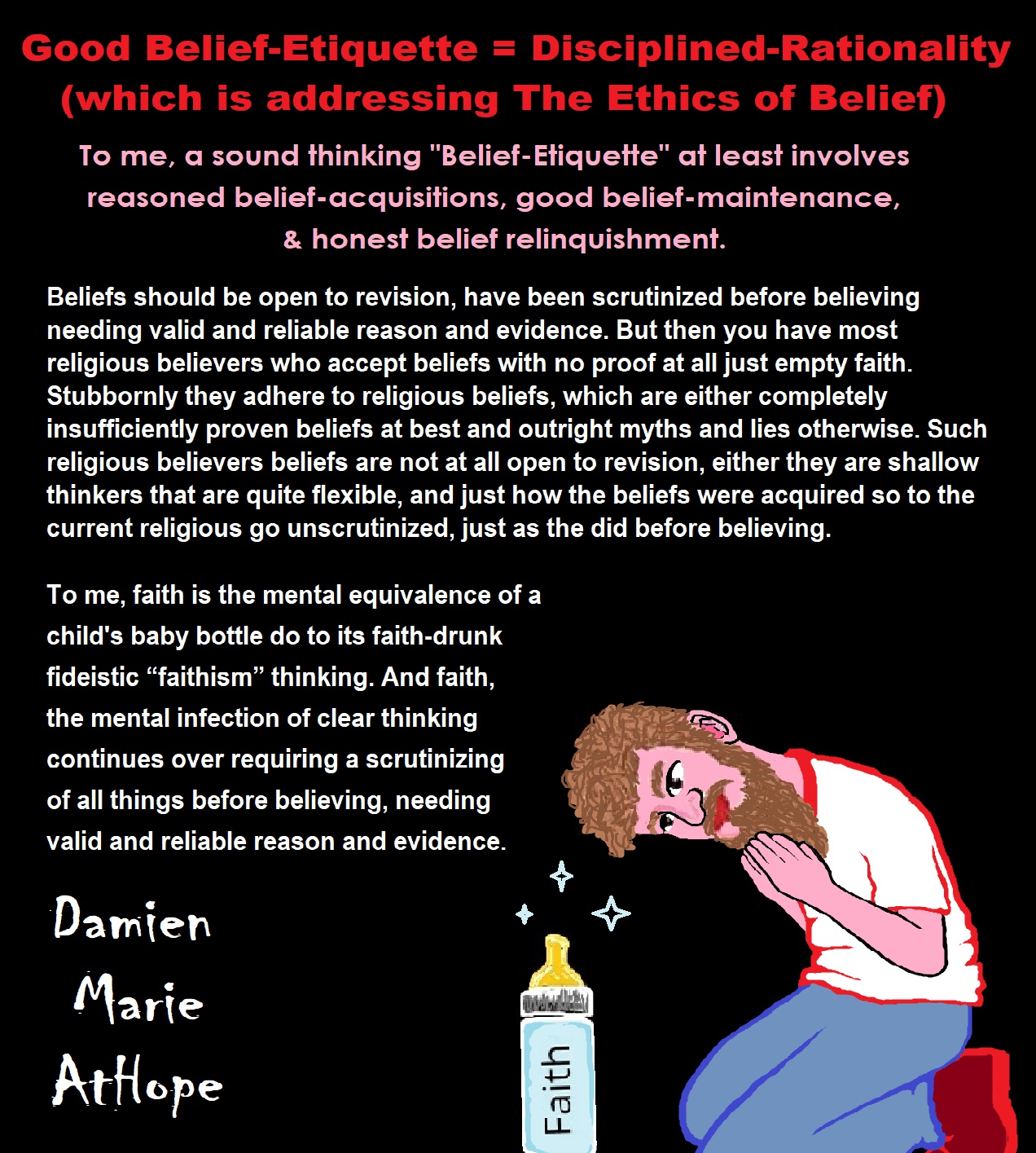

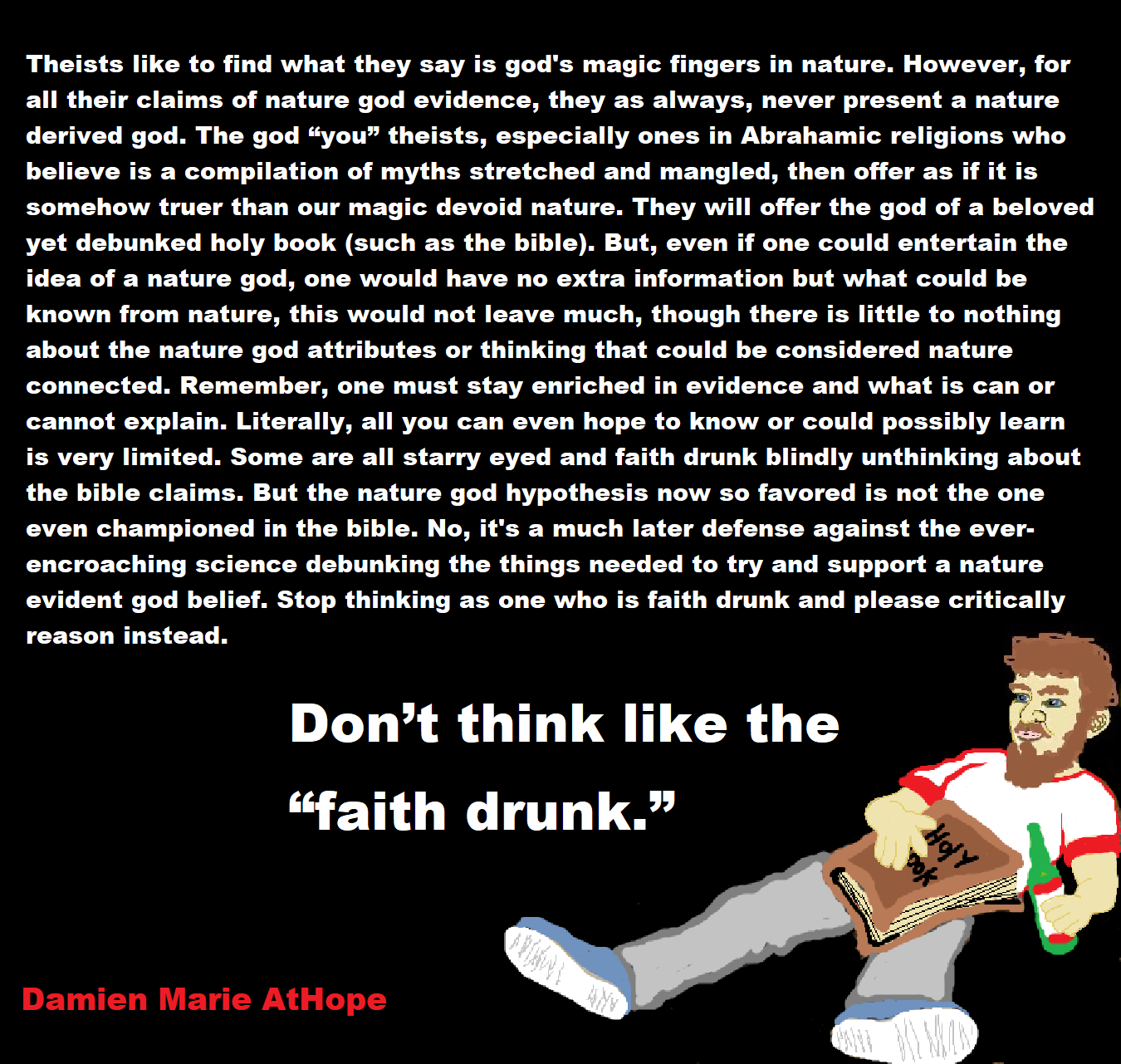
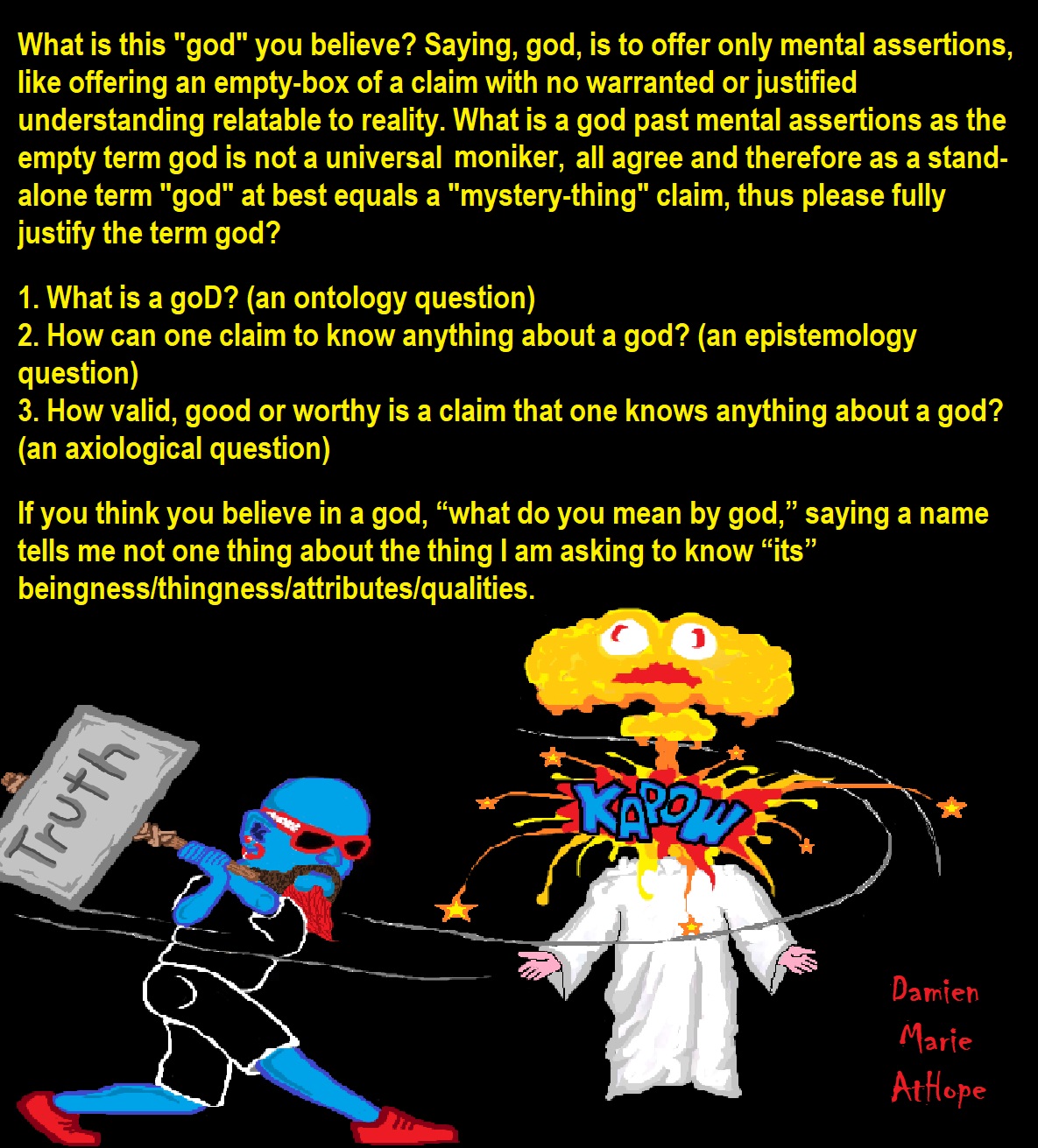

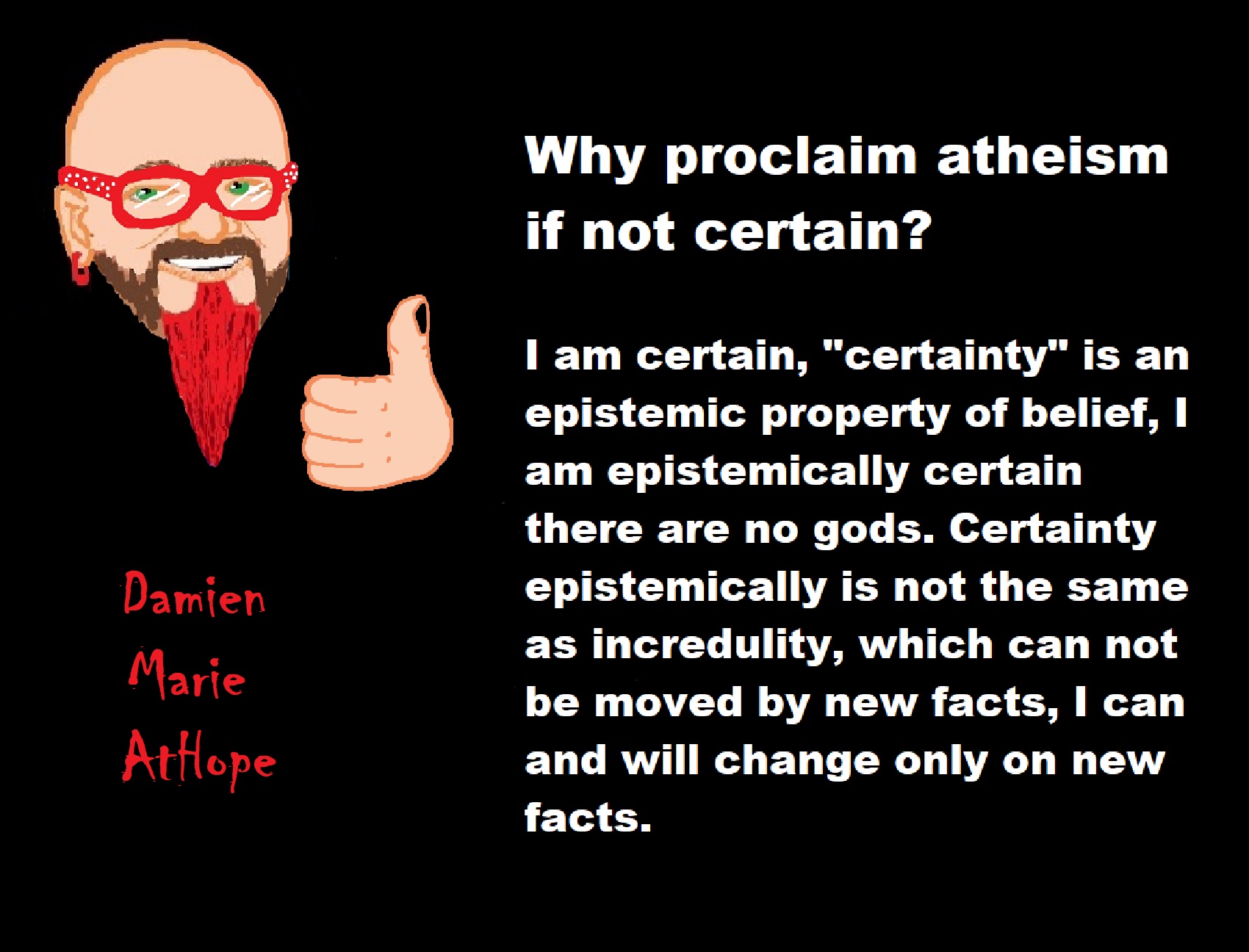
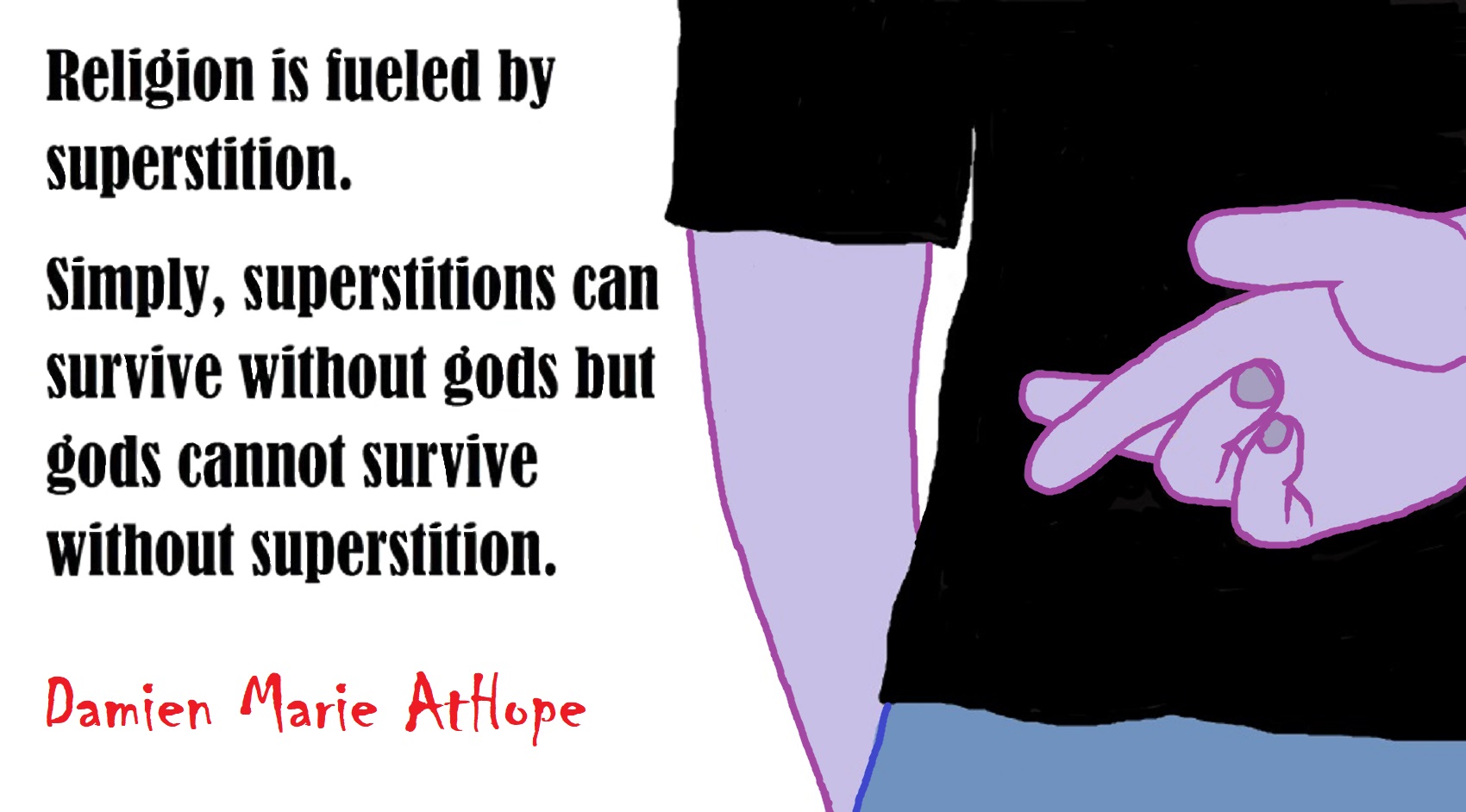



Animism: Respecting the Living World by Graham Harvey
“How have human cultures engaged with and thought about animals, plants, rocks, clouds, and other elements in their natural surroundings? Do animals and other natural objects have a spirit or soul? What is their relationship to humans? In this new study, Graham Harvey explores current and past animistic beliefs and practices of Native Americans, Maori, Aboriginal Australians, and eco-pagans. He considers the varieties of animism found in these cultures as well as their shared desire to live respectfully within larger natural communities. Drawing on his extensive casework, Harvey also considers the linguistic, performative, ecological, and activist implications of these different animisms.” ref


My thoughts on Religion Evolution with external links for more info:
- (Pre-Animism Africa mainly, but also Europe, and Asia at least 300,000 years ago), (Pre-Animism – Oxford Dictionaries)
- (Animism Africa around 100,000 years ago), (Animism – Britannica.com)
- (Totemism Europe around 50,000 years ago), (Totemism – Anthropology)
- (Shamanism Siberia around 30,000 years ago), (Shamanism – Britannica.com)
- (Paganism Turkey around 12,000 years ago), (Paganism – BBC Religion)
- (Progressed Organized Religion “Institutional Religion” Egypt around 5,000 years ago), (Ancient Egyptian Religion – Britannica.com)
- (CURRENT “World” RELIGIONS after 4,000 years ago) (Origin of Major Religions – Sacred Texts)
- (Early Atheistic Doubting at least by 2,600 years ago) (History of Atheism – Wikipedia)
“Religion is an Evolved Product” and Yes, Religion is Like Fear Given Wings…
Atheists talk about gods and religions for the same reason doctors talk about cancer, they are looking for a cure, or a firefighter talks about fires because they burn people and they care to stop them. We atheists too often feel a need to help the victims of mental slavery, held in the bondage that is the false beliefs of gods and the conspiracy theories of reality found in religions.
Understanding Religion Evolution:
- Pre-Animism (at least 300,000 years ago)
- Animism (Africa: 100,000 years ago)
- Totemism (Europe: 50,000 years ago)
- Shamanism (Siberia: 30,000 years ago)
- Paganism (Turkey: 12,000 years ago)
- Progressed organized religion (Egypt: 5,000 years ago), (Egypt, the First Dynasty 5,150 years ago)
- CURRENT “World” RELIGIONS (after 4,000 years ago)
- Early Atheistic Doubting (at least by 2,600 years ago)
“An Archaeological/Anthropological Understanding of Religion Evolution”
It seems ancient peoples had to survived amazing threats in a “dangerous universe (by superstition perceived as good and evil),” and human “immorality or imperfection of the soul” which was thought to affect the still living, leading to ancestor worship. This ancestor worship presumably led to the belief in supernatural beings, and then some of these were turned into the belief in gods. This feeble myth called gods were just a human conceived “made from nothing into something over and over, changing, again and again, taking on more as they evolve, all the while they are thought to be special,” but it is just supernatural animistic spirit-belief perceived as sacred.
Quick Evolution of Religion?
Pre-Animism (at least 300,000 years ago) pre-religion is a beginning that evolves into later Animism. So, Religion as we think of it, to me, all starts in a general way with Animism (Africa: 100,000 years ago) (theoretical belief in supernatural powers/spirits), then this is physically expressed in or with Totemism (Europe: 50,000 years ago) (theoretical belief in mythical relationship with powers/spirits through a totem item), which then enlists a full-time specific person to do this worship and believed interacting Shamanism (Siberia/Russia: 30,000 years ago) (theoretical belief in access and influence with spirits through ritual), and then there is the further employment of myths and gods added to all the above giving you Paganism (Turkey: 12,000 years ago) (often a lot more nature-based than most current top world religions, thus hinting to their close link to more ancient religious thinking it stems from). My hypothesis is expressed with an explanation of the building of a theatrical house (modern religions development). Progressed organized religion (Egypt: 5,000 years ago) with CURRENT “World” RELIGIONS (after 4,000 years ago).
Historically, in large city-state societies (such as Egypt or Iraq) starting around 5,000 years ago culminated to make religion something kind of new, a sociocultural-governmental-religious monarchy, where all or at least many of the people of such large city-state societies seem familiar with and committed to the existence of “religion” as the integrated life identity package of control dynamics with a fixed closed magical doctrine, but this juggernaut integrated religion identity package of Dogmatic-Propaganda certainly did not exist or if developed to an extent it was highly limited in most smaller prehistoric societies as they seem to lack most of the strong control dynamics with a fixed closed magical doctrine (magical beliefs could be at times be added or removed). Many people just want to see developed religious dynamics everywhere even if it is not. Instead, all that is found is largely fragments until the domestication of religion.
Religions, as we think of them today, are a new fad, even if they go back to around 6,000 years in the timeline of human existence, this amounts to almost nothing when seen in the long slow evolution of religion at least around 70,000 years ago with one of the oldest ritual worship. Stone Snake of South Africa: “first human worship” 70,000 years ago. This message of how religion and gods among them are clearly a man-made thing that was developed slowly as it was invented and then implemented peace by peace discrediting them all. Which seems to be a simple point some are just not grasping how devastating to any claims of truth when we can see the lie clearly in the archeological sites.
I wish people fought as hard for the actual values as they fight for the group/clan names political or otherwise they think support values. Every amount spent on war is theft to children in need of food or the homeless kept from shelter.
Here are several of my blog posts on history:
- To Find Truth You Must First Look
- (Magdalenian/Iberomaurusian) Connections to the First Paganists of the early Neolithic Near East Dating from around 17,000 to 12,000 Years Ago
- Natufians: an Ancient People at the Origins of Agriculture and Sedentary Life
- Possible Clan Leader/Special “MALE” Ancestor Totem Poles At Least 13,500 years ago?
- Jewish People with DNA at least 13,200 years old, Judaism, and the Origins of Some of its Ideas
- Baltic Reindeer Hunters: Swiderian, Lyngby, Ahrensburgian, and Krasnosillya cultures 12,020 to 11,020 years ago are evidence of powerful migratory waves during the last 13,000 years and a genetic link to Saami and the Finno-Ugric peoples.
- The Rise of Inequality: patriarchy and state hierarchy inequality
- Fertile Crescent 12,500 – 9,500 Years Ago: fertility and death cult belief system?
- 12,400 – 11,700 Years Ago – Kortik Tepe (Turkey) Pre/early-Agriculture Cultic Ritualism
- Ritualistic Bird Symbolism at Gobekli Tepe and its “Ancestor Cult”
- Male-Homosexual (female-like) / Trans-woman (female) Seated Figurine from Gobekli Tepe
- Could a 12,000-year-old Bull Geoglyph at Göbekli Tepe relate to older Bull and Female Art 25,000 years ago and Later Goddess and the Bull cults like Catal Huyuk?
- Sedentism and the Creation of goddesses around 12,000 years ago as well as male gods after 7,000 years ago.
- Alcohol, where Agriculture and Religion Become one? Such as Gobekli Tepe’s Ritualistic use of Grain as Food and Ritual Drink
- Neolithic Ritual Sites with T-Pillars and other Cultic Pillars
- Paganism: Goddesses around 12,000 years ago then Male Gods after 7,000 years ago
- First Patriarchy: Split of Women’s Status around 12,000 years ago & First Hierarchy: fall of Women’s Status around 5,000 years ago.
- Natufians: an Ancient People at the Origins of Agriculture and Sedentary Life
- J DNA and the Spread of Agricultural Religion (paganism)
- Paganism: an approximately 12,000-year-old belief system
- Paganism 12,000 years old: related to “Anarchism and Socialism” (Pre-Capitalism)
- Shaman burial in Israel 12,000 years ago and the Shamanism Phenomena
- Need to Mythicized: gods and goddesses
- 12,000 – 7,000 Years Ago – Paleo-Indian Culture (The Americas)
- 12,000 – 2,000 Years Ago – Indigenous-Scandinavians (Nordic)
- Norse did not wear helmets with horns?
- Pre-Pottery Neolithic Skull Cult around 11,500 to 8,400 Years Ago?
- 10,400 – 10,100 Years Ago, in Turkey the Nevail Cori Religious Settlement
- 9,000-6,500 Years Old Submerged Pre-Pottery/Pottery Neolithic Ritual Settlements off Israel’s Coast
- Catal Huyuk “first religious designed city” around 9,500 to 7,700 years ago (Turkey)
- Cultic Hunting at Catal Huyuk “first religious designed city”
- Special Items and Art as well as Special Elite Burials at Catal Huyuk
- New Rituals and Violence with the appearance of Pottery and People?
- Haplogroup N and its related Uralic Languages and Cultures
- Ainu people, Sámi people, Native Americans, the Ancient North Eurasians, and Paganistic-Shamanism with Totemism
- Ideas, Technology and People from Turkey, Europe, to China and Back again 9,000 to 5,000 years ago?
- First Pottery of Europe and the Related Cultures
- 9,000 years old Neolithic Artifacts Judean Desert and Hills Israel
- 9,000-7,000 years-old Sex and Death Rituals: Cult Sites in Israel, Jordan, and the Sinai
- 9,000-8500 year old Horned Female shaman Bad Dürrenberg Germany
- Neolithic Jewelry and the Spread of Farming in Europe Emerging out of West Turkey
- 8,600-year-old Tortoise Shells in Neolithic graves in central China have Early Writing and Shamanism
- Swing of the Mace: the rise of Elite, Forced Authority, and Inequality begin to Emerge 8,500 years ago?
- Migrations and Changing Europeans Beginning around 8,000 Years Ago
- My “Steppe-Anatolian-Kurgan hypothesis” 8,000/7,000 years ago
- Around 8,000-year-old Shared Idea of the Mistress of Animals, “Ritual” Motif
- Pre-Columbian Red-Paint (red ochre) Maritime Archaic Culture 8,000-3,000 years ago
- 7,522-6,522 years ago Linear Pottery culture which I think relates to Arcane Capitalism’s origins
- Arcane Capitalism: Primitive socialism, Primitive capital, Private ownership, Means of production, Market capitalism, Class discrimination, and Petite bourgeoisie (smaller capitalists)
- 7,500-4,750 years old Ritualistic Cucuteni-Trypillian culture of Moldova, Romania, and Ukraine
- Roots of a changing early society 7,200-6,700 years ago Jordan and Israel
- Agriculture religion (Paganism) with farming reached Britain between about 7,000 to 6,500 or so years ago and seemingly expressed in things like Western Europe’s Long Barrows
- My Thoughts on Possible Migrations of “R” DNA and Proto-Indo-European?
- “Millet” Spreading from China 7,022 years ago to Europe and related Language may have Spread with it leading to Proto-Indo-European
- Proto-Indo-European (PIE), ancestor of Indo-European languages: DNA, Society, Language, and Mythology
- The Dnieper–Donets culture and Asian varieties of Millet from China to the Black Sea region of Europe by 7,022 years ago
- Kurgan 6,000 years ago/dolmens 7,000 years ago: funeral, ritual, and other?
- 7,020 to 6,020-year-old Proto-Indo-European Homeland of Urheimat or proposed home of their Language and Religion
- Ancient Megaliths: Kurgan, Ziggurat, Pyramid, Menhir, Trilithon, Dolman, Kromlech, and Kromlech of Trilithons
- The Mytheme of Ancient North Eurasian Sacred-Dog belief and similar motifs are found in Indo-European, Native American, and Siberian comparative mythology
- Elite Power Accumulation: Ancient Trade, Tokens, Writing, Wealth, Merchants, and Priest-Kings
- Sacred Mounds, Mountains, Kurgans, and Pyramids may hold deep connections?
- Between 7,000-5,000 Years ago, rise of unequal hierarchy elite, leading to a “birth of the State” or worship of power, strong new sexism, oppression of non-elites, and the fall of Women’s equal status
- Paganism 7,000-5,000 years old: related to “Anarchism and Socialism” (Capitalism) (World War 0) Elite & their slaves
- Hell and Underworld mythologies starting maybe as far back as 7,000 to 5,000 years ago with the Proto-Indo-Europeans?
- The First Expression of the Male God around 7,000 years ago?
- White (light complexion skin) Bigotry and Sexism started 7,000 years ago?
- Around 7,000-year-old Shared Idea of the Divine Bird (Tutelary and/or Trickster spirit/deity), “Ritual” Motif
- Nekhbet an Ancient Egyptian Vulture Goddess and Tutelary Deity
- 6,720 to 4,920 years old Ritualistic Hongshan Culture of Inner Mongolia with 5,000-year-old Pyramid Mounds and Temples
- First proto-king in the Balkans, Varna culture around 6,500 years ago?
- 6,500–5,800 years ago in Israel Late Chalcolithic (Copper Age) Period in the Southern Levant Seems to Express Northern Levant Migrations, Cultural and Religious Transfer
- KING OF BEASTS: Master of Animals “Ritual” Motif, around 6,000 years old or older…
- Around 6000-year-old Shared Idea of the Solid Wheel & the Spoked Wheel-Shaped Ritual Motif
- “The Ghassulian Star,” a mysterious 6,000-year-old mural from Jordan; a Proto-Star of Ishtar, Star of Inanna or Star of Venus?
- Religious/Ritual Ideas, including goddesses and gods as well as ritual mounds or pyramids from Northeastern Asia at least 6,000 years old, seemingly filtering to Iran, Iraq, the Mediterranean, Europe, Egypt, and the Americas?
- Maykop (5,720–5,020 years ago) Caucasus region Bronze Age culture-related to Copper Age farmers from the south, influenced by the Ubaid period and Leyla-Tepe culture, as well as influencing the Kura-Araxes culture
- 5-600-year-old Tomb, Mummy, and First Bearded Male Figurine in a Grave
- Kura-Araxes Cultural 5,520 to 4,470 years old DNA traces to the Canaanites, Arabs, and Jews
- Minoan/Cretan (Keftiu) Civilization and Religion around 5,520 to 3,120 years ago
- Evolution Of Science at least by 5,500 years ago
- 5,500 Years old birth of the State, the rise of Hierarchy, and the fall of Women’s status
- “Jiroft culture” 5,100 – 4,200 years ago and the History of Iran
- Stonehenge: Paganistic Burial and Astrological Ritual Complex, England (5,100-3,600 years ago)
- Around 5,000-year-old Shared Idea of the “Tree of Life” Ritual Motif
- Complex rituals for elite, seen from China to Egypt, at least by 5,000 years ago
- Around 5,000 years ago: “Birth of the State” where Religion gets Military Power and Influence
- The Center of the World “Axis Mundi” and/or “Sacred Mountains” Mythology Could Relate to the Altai Mountains, Heart of the Steppe
- Progressed organized religion starts, an approximately 5,000-year-old belief system
- China’s Civilization between 5,000-3,000 years ago, was a time of war and class struggle, violent transition from free clans to a Slave or Elite society
- Origin of Logics is Naturalistic Observation at least by around 5,000 years ago.
- Paganism 5,000 years old: progressed organized religion and the state: related to “Anarchism and Socialism” (Kings and the Rise of the State)
- Ziggurats (multi-platform temples: 4,900 years old) to Pyramids (multi-platform tombs: 4,700 years old)
- Did a 4,520–4,420-year-old Volcano In Turkey Inspire the Bible God?
- Finland’s Horned Shaman and Pre-Horned-God at least 4,500 years ago?
- 4,000-year-Old Dolmens in Israel: A Connected Dolmen Religious Phenomenon?
- Creation myths: From chaos, Ex nihilo, Earth-diver, Emergence, World egg, and World parent
- Bronze Age “Ritual” connections of the Bell Beaker culture with the Corded Ware/Single Grave culture, which were related to the Yamnaya culture and Proto-Indo-European Languages/Religions
- Low Gods (Earth/ Tutelary deity), High Gods (Sky/Supreme deity), and Moralistic Gods (Deity enforcement/divine order)
- The exchange of people, ideas, and material-culture including, to me, the new god (Sky Father) and goddess (Earth Mother) religion between the Cucuteni-Trypillians and others which is then spread far and wide
- Koryaks: Indigenous People of the Russian Far East and Big Raven myths also found in Tlingit, Haida, Tsimshian, and other Indigenous People of North America
- 42 Principles Of Maat (Egyptian Goddess of the justice) around 4,400 years ago, 2000 Years Before Ten Commandments
- “Happy Easter” Well Happy Eostre/Ishter
- 4,320-3,820 years old “Shimao” (North China) site with Totemistic-Shamanistic Paganism and a Stepped Pyramid
- 4,250 to 3,400 Year old Stonehenge from Russia: Arkaim?
- 4,100-year-old beaker with medicinal & flowering plants in a grave of a woman in Scotland
- Early European Farmer ancestry, Kelif el Boroud people with the Cardial Ware culture, and the Bell Beaker culture Paganists too, spread into North Africa, then to the Canary Islands off West Africa
- Flood Accounts: Gilgamesh epic (4,100 years ago) Noah in Genesis (2,600 years ago)
- Paganism 4,000 years old: related to “Anarchism and Socialism” (First Moralistic gods, then the Origin time of Monotheism)
- When was the beginning: TIMELINE OF CURRENT RELIGIONS, which start around 4,000 years ago.
- Early Religions Thought to Express Proto-Monotheistic Systems around 4,000 years ago
- Kultepe? An archaeological site with a 4,000 years old women’s rights document.
- Single God Religions (Monotheism) = “Man-o-theism” started around 4,000 years ago with the Great Sky Spirit/God Tiān (天)?
- Confucianism’s Tiān (Shangdi god 4,000 years old): Supernaturalism, Pantheism or Theism?
- Yes, Your Male God is Ridiculous
- Mythology, a Lunar Deity is a Goddess or God of the Moon
- Sacred Land, Hills, and Mountains: Sami Mythology (Paganistic Shamanism)
- Horse Worship/Sacrifice: mythical union of Ruling Elite/Kingship and the Horse
- The Amorite/Amurru people’s God Amurru “Lord of the Steppe”, relates to the Origins of the Bible God?
- Bronze Age Exotic Trade Routes Spread Quite Far as well as Spread Religious Ideas with Them
- Sami and the Northern Indigenous Peoples Landscape, Language, and its Connection to Religion
- Prototype of Ancient Analemmatic Sundials around 3,900-3,150 years ago and a Possible Solar Connection to gods?
- Judaism is around 3,450 or 3,250 years old. (“Paleo-Hebrew” 3,000 years ago and Torah 2,500 years ago)
- The Weakening of Ancient Trade and the Strengthening of Religions around 3000 years ago?
- Are you aware that there are religions that worship women gods, explain now religion tears women down?
- Animistic, Totemistic, and Paganistic Superstition Origins of bible god and the bible’s Religion.
- Myths and Folklore: “Trickster gods and goddesses”
- Jews, Judaism, and the Origins of Some of its Ideas
- An Old Branch of Religion Still Giving Fruit: Sacred Trees
- Dating the BIBLE: naming names and telling times (written less than 3,000 years ago, provable to 2,200 years ago)
- Did a Volcano Inspire the bible god?
- Dené–Yeniseian language, Old Copper Complex, and Pre-Columbian Mound Builders?
- No “dinosaurs and humans didn’t exist together just because some think they are in the bible itself”
- Sacred Shit and Sacred Animals?
- Everyone Killed in the Bible Flood? “Nephilim” (giants)?
- Hey, Damien dude, I have a question for you regarding “the bible” Exodus.
- Archaeology Disproves the Bible
- Bible Battle, Just More, Bible Babble
- The Jericho Conquest lie?
- Canaanites and Israelites?
- Accurate Account on how did Christianity Began?
- Let’s talk about Christianity.
- So the 10 commandments isn’t anything to go by either right?
- Misinformed christian
- Debunking Jesus?
- Paulism vs Jesus
- Ok, you seem confused so let’s talk about Buddhism.
- Unacknowledged Buddhism: Gods, Savior, Demons, Rebirth, Heavens, Hells, and Terrorism
- His Foolishness The Dalai Lama
- Yin and Yang is sexist with an ORIGIN around 2,300 years ago?
- I Believe Archaeology, not Myths & Why Not, as the Religious Myths Already Violate Reason!
- Archaeological, Scientific, & Philosophic evidence shows the god myth is man-made nonsense.
- Aquatic Ape Theory/Hypothesis? As Always, Just Pseudoscience.
- Ancient Aliens Conspiracy Theorists are Pseudohistorians
- The Pseudohistoric and Pseudoscientific claims about “Bakoni Ruins” of South Africa
- Why do people think Religion is much more than supernaturalism and superstitionism?
- Religion is an Evolved Product
- Was the Value of Ancient Women Different?
- 1000 to 1100 CE, human sacrifice Cahokia Mounds a pre-Columbian Native American site
- Feminist atheists as far back as the 1800s?
- Promoting Religion as Real is Mentally Harmful to a Flourishing Humanity
- Screw All Religions and Their Toxic lies, they are all fraud
- Forget Religions’ Unfounded Myths, I Have Substantiated “Archaeology Facts.”
- Religion Dispersal throughout the World
- I Hate Religion Just as I Hate all Pseudoscience
- Exposing Scientology, Eckankar, Wicca and Other Nonsense?
- Main deity or religious belief systems
- Quit Trying to Invent Your God From the Scraps of Science.
- Archaeological, Scientific, & Philosophic evidence shows the god myth is man-made nonsense.
- Ancient Alien Conspiracy Theorists: Misunderstanding, Rhetoric, Misinformation, Fabrications, and Lies
- Misinformation, Distortion, and Pseudoscience in Talking with a Christian Creationist
- Judging the Lack of Goodness in Gods, Even the Norse God Odin
- Challenging the Belief in God-like Aliens and Gods in General
- A Challenge to Christian use of Torture Devices?
- Yes, Hinduism is a Religion
- Trump is One of the Most Reactionary Forces of Far-right Christian Extremism
- Was the Bull Head a Symbol of God? Yes!
- Primate Death Rituals
- Christian – “God and Christianity are objectively true”
- Australopithecus afarensis Death Ritual?
- You Claim Global Warming is a Hoax?
- Doubter of Science and Defamer of Atheists?
- I think that sounds like the Bible?
- History of the Antifa (“anti-fascist”) Movements
- Indianapolis Anti-Blasphemy Laws #Free Soheil Rally
- Damien, you repeat the golden rule in so many forms then you say religion is dogmatic?
- Science is a Trustable Methodology whereas Faith is not Trustable at all!
- Was I ever a believer, before I was an atheist?
- Atheists rise in reason
- Mistrust of science?
- Open to Talking About the Definition of ‘God’? But first, we address Faith.
- ‘United Monarchy’ full of splendor and power – Saul, David, and Solomon? Most likely not.
- Is there EXODUS ARCHAEOLOGY? The short answer is “no.”
- Lacking Proof of Bigfoots, Unicorns, and Gods is Just a Lack of Research?
- Religion and Politics: Faith Beliefs vs. Rational Thinking
- Hammer of Truth that lying pig RELIGION: challenged by an archaeologist
- “The Hammer of Truth” -ontology question- What do You Mean by That?
- Navigation of a bad argument: Ad Hominem vs. Attack
- Why is it Often Claimed that Gods have a Gender?
- Why are basically all monotheistic religions ones that have a male god?
- Shifting through the Claims in support of Faith
- Dear Mr. AtHope, The 20th Century is an Indictment of Secularism and a Failed Atheist Century
- An Understanding of the Worldwide Statistics and Dynamics of Terrorist Incidents and Suicide Attacks
- Intoxication and Evolution? Addressing and Assessing the “Stoned Ape” or “Drunken Monkey” Theories as Catalysts in Human Evolution
- Sacred Menstrual cloth? Inanna’s knot, Isis knot, and maybe Ma’at’s feather?
- Damien, why don’t the Hebrews accept the bible stories?
- Dealing with a Troll and Arguing Over Word Meaning
- Knowledge without Belief? Justified beliefs or disbeliefs worthy of Knowledge?
- Afrocentrism and African Religions
- Crecganford @crecganford offers history & stories of the people, places, gods, & culture
- Empiricism-Denier?
I am not an academic. I am a revolutionary that teaches in public, in places like social media, and in the streets. I am not a leader by some title given but from my commanding leadership style of simply to start teaching everywhere to everyone, all manner of positive education.









ref, ref, ref, ref, ref, ref, ref, ref, ref, ref, ref, ref, ref, ref, ref, ref, ref, ref, ref, ref, ref
Low Gods “Earth” or Tutelary deity and High Gods “Sky” or Supreme deity
“An Earth goddess is a deification of the Earth. Earth goddesses are often associated with the “chthonic” deities of the underworld. Ki and Ninhursag are Mesopotamian earth goddesses. In Greek mythology, the Earth is personified as Gaia, corresponding to Roman Terra, Indic Prithvi/Bhūmi, etc. traced to an “Earth Mother” complementary to the “Sky Father” in Proto-Indo-European religion. Egyptian mythology exceptionally has a sky goddess and an Earth god.” ref
“A mother goddess is a goddess who represents or is a personification of nature, motherhood, fertility, creation, destruction or who embodies the bounty of the Earth. When equated with the Earth or the natural world, such goddesses are sometimes referred to as Mother Earth or as the Earth Mother. In some religious traditions or movements, Heavenly Mother (also referred to as Mother in Heaven or Sky Mother) is the wife or feminine counterpart of the Sky father or God the Father.” ref
“Any masculine sky god is often also king of the gods, taking the position of patriarch within a pantheon. Such king gods are collectively categorized as “sky father” deities, with a polarity between sky and earth often being expressed by pairing a “sky father” god with an “earth mother” goddess (pairings of a sky mother with an earth father are less frequent). A main sky goddess is often the queen of the gods and may be an air/sky goddess in her own right, though she usually has other functions as well with “sky” not being her main. In antiquity, several sky goddesses in ancient Egypt, Mesopotamia, and the Near East were called Queen of Heaven. Neopagans often apply it with impunity to sky goddesses from other regions who were never associated with the term historically. The sky often has important religious significance. Many religions, both polytheistic and monotheistic, have deities associated with the sky.” ref
“In comparative mythology, sky father is a term for a recurring concept in polytheistic religions of a sky god who is addressed as a “father”, often the father of a pantheon and is often either a reigning or former King of the Gods. The concept of “sky father” may also be taken to include Sun gods with similar characteristics, such as Ra. The concept is complementary to an “earth mother“. “Sky Father” is a direct translation of the Vedic Dyaus Pita, etymologically descended from the same Proto-Indo-European deity name as the Greek Zeûs Pater and Roman Jupiter and Germanic Týr, Tir or Tiwaz, all of which are reflexes of the same Proto-Indo-European deity’s name, *Dyēus Ph₂tḗr. While there are numerous parallels adduced from outside of Indo-European mythology, there are exceptions (e.g. In Egyptian mythology, Nut is the sky mother and Geb is the earth father).” ref
Tutelary deity
“A tutelary (also tutelar) is a deity or spirit who is a guardian, patron, or protector of a particular place, geographic feature, person, lineage, nation, culture, or occupation. The etymology of “tutelary” expresses the concept of safety and thus of guardianship. In late Greek and Roman religion, one type of tutelary deity, the genius, functions as the personal deity or daimon of an individual from birth to death. Another form of personal tutelary spirit is the familiar spirit of European folklore.” ref
“A tutelary (also tutelar) in Korean shamanism, jangseung and sotdae were placed at the edge of villages to frighten off demons. They were also worshiped as deities. Seonangshin is the patron deity of the village in Korean tradition and was believed to embody the Seonangdang. In Philippine animism, Diwata or Lambana are deities or spirits that inhabit sacred places like mountains and mounds and serve as guardians. Such as: Maria Makiling is the deity who guards Mt. Makiling and Maria Cacao and Maria Sinukuan. In Shinto, the spirits, or kami, which give life to human bodies come from nature and return to it after death. Ancestors are therefore themselves tutelaries to be worshiped. And similarly, Native American beliefs such as Tonás, tutelary animal spirit among the Zapotec and Totems, familial or clan spirits among the Ojibwe, can be animals.” ref
“A tutelary (also tutelar) in Austronesian beliefs such as: Atua (gods and spirits of the Polynesian peoples such as the Māori or the Hawaiians), Hanitu (Bunun of Taiwan‘s term for spirit), Hyang (Kawi, Sundanese, Javanese, and Balinese Supreme Being, in ancient Java and Bali mythology and this spiritual entity, can be either divine or ancestral), Kaitiaki (New Zealand Māori term used for the concept of guardianship, for the sky, the sea, and the land), Kawas (mythology) (divided into 6 groups: gods, ancestors, souls of the living, spirits of living things, spirits of lifeless objects, and ghosts), Tiki (Māori mythology, Tiki is the first man created by either Tūmatauenga or Tāne and represents deified ancestors found in most Polynesian cultures). ” ref, ref, ref, ref, ref, ref, ref
Mesopotamian Tutelary Deities can be seen as ones related to City-States
“Historical city-states included Sumerian cities such as Uruk and Ur; Ancient Egyptian city-states, such as Thebes and Memphis; the Phoenician cities (such as Tyre and Sidon); the five Philistine city-states; the Berber city-states of the Garamantes; the city-states of ancient Greece (the poleis such as Athens, Sparta, Thebes, and Corinth); the Roman Republic (which grew from a city-state into a vast empire); the Italian city-states from the Middle Ages to the early modern period, such as Florence, Siena, Ferrara, Milan (which as they grew in power began to dominate neighboring cities) and Genoa and Venice, which became powerful thalassocracies; the Mayan and other cultures of pre-Columbian Mesoamerica (including cities such as Chichen Itza, Tikal, Copán and Monte Albán); the central Asian cities along the Silk Road; the city-states of the Swahili coast; Ragusa; states of the medieval Russian lands such as Novgorod and Pskov; and many others.” ref
“The Uruk period (ca. 4000 to 3100 BCE; also known as Protoliterate period) of Mesopotamia, named after the Sumerian city of Uruk, this period saw the emergence of urban life in Mesopotamia and the Sumerian civilization. City-States like Uruk and others had a patron tutelary City Deity along with a Priest-King.” ref
“Chinese folk religion, both past, and present, includes myriad tutelary deities. Exceptional individuals, highly cultivated sages, and prominent ancestors can be deified and honored after death. Lord Guan is the patron of military personnel and police, while Mazu is the patron of fishermen and sailors. Such as Tu Di Gong (Earth Deity) is the tutelary deity of a locality, and each individual locality has its own Earth Deity and Cheng Huang Gong (City God) is the guardian deity of an individual city, worshipped by local officials and locals since imperial times.” ref
“A tutelary (also tutelar) in Hinduism, personal tutelary deities are known as ishta-devata, while family tutelary deities are known as Kuladevata. Gramadevata are guardian deities of villages. Devas can also be seen as tutelary. Shiva is the patron of yogis and renunciants. City goddesses include: Mumbadevi (Mumbai), Sachchika (Osian); Kuladevis include: Ambika (Porwad), and Mahalakshmi. In NorthEast India Meitei mythology and religion (Sanamahism) of Manipur, there are various types of tutelary deities, among which Lam Lais are the most predominant ones. Tibetan Buddhism has Yidam as a tutelary deity. Dakini is the patron of those who seek knowledge.” ref
“A tutelary (also tutelar) The Greeks also thought deities guarded specific places: for instance, Athena was the patron goddess of the city of Athens. Socrates spoke of hearing the voice of his personal spirit or daimonion:
You have often heard me speak of an oracle or sign which comes to me … . This sign I have had ever since I was a child. The sign is a voice which comes to me and always forbids me to do something which I am going to do, but never commands me to do anything, and this is what stands in the way of my being a politician.” ref
“Tutelary deities who guard and preserve a place or a person are fundamental to ancient Roman religion. The tutelary deity of a man was his Genius, that of a woman her Juno. In the Imperial era, the Genius of the Emperor was a focus of Imperial cult. An emperor might also adopt a major deity as his personal patron or tutelary, as Augustus did Apollo. Precedents for claiming the personal protection of a deity were established in the Republican era, when for instance the Roman dictator Sulla advertised the goddess Victory as his tutelary by holding public games (ludi) in her honor.” ref
“Each town or city had one or more tutelary deities, whose protection was considered particularly vital in time of war and siege. Rome itself was protected by a goddess whose name was to be kept ritually secret on pain of death (for a supposed case, see Quintus Valerius Soranus). The Capitoline Triad of Juno, Jupiter, and Minerva were also tutelaries of Rome. The Italic towns had their own tutelary deities. Juno often had this function, as at the Latin town of Lanuvium and the Etruscan city of Veii, and was often housed in an especially grand temple on the arx (citadel) or other prominent or central location. The tutelary deity of Praeneste was Fortuna, whose oracle was renowned.” ref
“The Roman ritual of evocatio was premised on the belief that a town could be made vulnerable to military defeat if the power of its tutelary deity were diverted outside the city, perhaps by the offer of superior cult at Rome. The depiction of some goddesses such as the Magna Mater (Great Mother, or Cybele) as “tower-crowned” represents their capacity to preserve the city. A town in the provinces might adopt a deity from within the Roman religious sphere to serve as its guardian, or syncretize its own tutelary with such; for instance, a community within the civitas of the Remi in Gaul adopted Apollo as its tutelary, and at the capital of the Remi (present-day Rheims), the tutelary was Mars Camulus.” ref
Household deity (a kind of or related to a Tutelary deity)
“A household deity is a deity or spirit that protects the home, looking after the entire household or certain key members. It has been a common belief in paganism as well as in folklore across many parts of the world. Household deities fit into two types; firstly, a specific deity – typically a goddess – often referred to as a hearth goddess or domestic goddess who is associated with the home and hearth, such as the ancient Greek Hestia.” ref
“The second type of household deities are those that are not one singular deity, but a type, or species of animistic deity, who usually have lesser powers than major deities. This type was common in the religions of antiquity, such as the Lares of ancient Roman religion, the Gashin of Korean shamanism, and Cofgodas of Anglo-Saxon paganism. These survived Christianisation as fairy-like creatures existing in folklore, such as the Anglo-Scottish Brownie and Slavic Domovoy.” ref
“Household deities were usually worshipped not in temples but in the home, where they would be represented by small idols (such as the teraphim of the Bible, often translated as “household gods” in Genesis 31:19 for example), amulets, paintings, or reliefs. They could also be found on domestic objects, such as cosmetic articles in the case of Tawaret. The more prosperous houses might have a small shrine to the household god(s); the lararium served this purpose in the case of the Romans. The gods would be treated as members of the family and invited to join in meals, or be given offerings of food and drink.” ref
“In many religions, both ancient and modern, a god would preside over the home. Certain species, or types, of household deities, existed. An example of this was the Roman Lares. Many European cultures retained house spirits into the modern period. Some examples of these include:
- Brownie (Scotland and England) or Hob (England) / Kobold (Germany) / Goblin / Hobgoblin
- Domovoy (Slavic)
- Nisse (Norwegian or Danish) / Tomte (Swedish) / Tonttu (Finnish)
- Húsvættir (Norse)” ref
“Although the cosmic status of household deities was not as lofty as that of the Twelve Olympians or the Aesir, they were also jealous of their dignity and also had to be appeased with shrines and offerings, however humble. Because of their immediacy they had arguably more influence on the day-to-day affairs of men than the remote gods did. Vestiges of their worship persisted long after Christianity and other major religions extirpated nearly every trace of the major pagan pantheons. Elements of the practice can be seen even today, with Christian accretions, where statues to various saints (such as St. Francis) protect gardens and grottos. Even the gargoyles found on older churches, could be viewed as guardians partitioning a sacred space.” ref
“For centuries, Christianity fought a mop-up war against these lingering minor pagan deities, but they proved tenacious. For example, Martin Luther‘s Tischreden have numerous – quite serious – references to dealing with kobolds. Eventually, rationalism and the Industrial Revolution threatened to erase most of these minor deities, until the advent of romantic nationalism rehabilitated them and embellished them into objects of literary curiosity in the 19th century. Since the 20th century this literature has been mined for characters for role-playing games, video games, and other fantasy personae, not infrequently invested with invented traits and hierarchies somewhat different from their mythological and folkloric roots.” ref
“In contradistinction to both Herbert Spencer and Edward Burnett Tylor, who defended theories of animistic origins of ancestor worship, Émile Durkheim saw its origin in totemism. In reality, this distinction is somewhat academic, since totemism may be regarded as a particularized manifestation of animism, and something of a synthesis of the two positions was attempted by Sigmund Freud. In Freud’s Totem and Taboo, both totem and taboo are outward expressions or manifestations of the same psychological tendency, a concept which is complementary to, or which rather reconciles, the apparent conflict. Freud preferred to emphasize the psychoanalytic implications of the reification of metaphysical forces, but with particular emphasis on its familial nature. This emphasis underscores, rather than weakens, the ancestral component.” ref
“William Edward Hearn, a noted classicist, and jurist, traced the origin of domestic deities from the earliest stages as an expression of animism, a belief system thought to have existed also in the neolithic, and the forerunner of Indo-European religion. In his analysis of the Indo-European household, in Chapter II “The House Spirit”, Section 1, he states:
The belief which guided the conduct of our forefathers was … the spirit rule of dead ancestors.” ref
“In Section 2 he proceeds to elaborate:
It is thus certain that the worship of deceased ancestors is a vera causa, and not a mere hypothesis. …
In the other European nations, the Slavs, the Teutons, and the Kelts, the House Spirit appears with no less distinctness. … [T]he existence of that worship does not admit of doubt. … The House Spirits had a multitude of other names which it is needless here to enumerate, but all of which are more or less expressive of their friendly relations with man. … In [England] … [h]e is the Brownie. … In Scotland this same Brownie is well known. He is usually described as attached to particular families, with whom he has been known to reside for centuries, threshing the corn, cleaning the house, and performing similar household tasks. His favorite gratification was milk and honey.” ref

ref, ref, ref, ref, ref, ref, ref, ref, ref, ref, ref, ref, ref, ref, ref, ref, ref
“These ideas are my speculations from the evidence.”
I am still researching the “god‘s origins” all over the world. So you know, it is very complicated but I am smart and willing to look, DEEP, if necessary, which going very deep does seem to be needed here, when trying to actually understand the evolution of gods and goddesses. I am sure of a few things and less sure of others, but even in stuff I am not fully grasping I still am slowly figuring it out, to explain it to others. But as I research more I am understanding things a little better, though I am still working on understanding it all or something close and thus always figuring out more.
Sky Father/Sky God?
“Egyptian: (Nut) Sky Mother and (Geb) Earth Father” (Egypt is different but similar)
Turkic/Mongolic: (Tengri/Tenger Etseg) Sky Father and (Eje/Gazar Eej) Earth Mother *Transeurasian*
Hawaiian: (Wākea) Sky Father and (Papahānaumoku) Earth Mother *Austronesian*
New Zealand/ Māori: (Ranginui) Sky Father and (Papatūānuku) Earth Mother *Austronesian*
Proto-Indo-European: (Dyḗus/Dyḗus ph₂tḗr) Sky Father and (Dʰéǵʰōm/Pleth₂wih₁) Earth Mother
Indo-Aryan: (Dyaus Pita) Sky Father and (Prithvi Mata) Earth Mother *Indo-European*
Italic: (Jupiter) Sky Father and (Juno) Sky Mother *Indo-European*
Etruscan: (Tinia) Sky Father and (Uni) Sky Mother *Tyrsenian/Italy Pre–Indo-European*
Hellenic/Greek: (Zeus) Sky Father and (Hera) Sky Mother who started as an “Earth Goddess” *Indo-European*
Nordic: (Dagr) Sky Father and (Nótt) Sky Mother *Indo-European*
Slavic: (Perun) Sky Father and (Mokosh) Earth Mother *Indo-European*
Illyrian: (Deipaturos) Sky Father and (Messapic Damatura’s “earth-mother” maybe) Earth Mother *Indo-European*
Albanian: (Zojz) Sky Father and (?) *Indo-European*
Baltic: (Perkūnas) Sky Father and (Saulė) Sky Mother *Indo-European*
Germanic: (Týr) Sky Father and (?) *Indo-European*
Colombian-Muisca: (Bochica) Sky Father and (Huythaca) Sky Mother *Chibchan*
Aztec: (Quetzalcoatl) Sky Father and (Xochiquetzal) Sky Mother *Uto-Aztecan*
Incan: (Viracocha) Sky Father and (Mama Runtucaya) Sky Mother *Quechuan*
China: (Tian/Shangdi) Sky Father and (Dì) Earth Mother *Sino-Tibetan*
Sumerian, Assyrian and Babylonian: (An/Anu) Sky Father and (Ki) Earth Mother
Finnish: (Ukko) Sky Father and (Akka) Earth Mother *Finno-Ugric*
Sami: (Horagalles) Sky Father and (Ravdna) Earth Mother *Finno-Ugric*
Puebloan-Zuni: (Ápoyan Ta’chu) Sky Father and (Áwitelin Tsíta) Earth Mother
Puebloan-Hopi: (Tawa) Sky Father and (Kokyangwuti/Spider Woman/Grandmother) Earth Mother *Uto-Aztecan*
Puebloan-Navajo: (Tsohanoai) Sky Father and (Estsanatlehi) Earth Mother *Na-Dene*
ref, ref, ref, ref, ref, ref, ref, ref, ref, ref, ref, ref, ref, ref, ref, ref, ref, ref, ref, ref, ref, ref, ref, ref, ref, ref, ref

Hinduism around 3,700 to 3,500 years old. ref
Judaism around 3,450 or 3,250 years old. (The first writing in the bible was “Paleo-Hebrew” dated to around 3,000 years ago Khirbet Qeiyafa is the site of an ancient fortress city overlooking the Elah Valley. And many believe the religious Jewish texts were completed around 2,500) ref, ref
Judaism is around 3,450 or 3,250 years old. (“Paleo-Hebrew” 3,000 years ago and Torah 2,500 years ago)
“Judaism is an Abrahamic, its roots as an organized religion in the Middle East during the Bronze Age. Some scholars argue that modern Judaism evolved from Yahwism, the religion of ancient Israel and Judah, by the late 6th century BCE, and is thus considered to be one of the oldest monotheistic religions.” ref
“Yahwism is the name given by modern scholars to the religion of ancient Israel, essentially polytheistic, with a plethora of gods and goddesses. Heading the pantheon was Yahweh, the national god of the Israelite kingdoms of Israel and Judah, with his consort, the goddess Asherah; below them were second-tier gods and goddesses such as Baal, Shamash, Yarikh, Mot, and Astarte, all of whom had their own priests and prophets and numbered royalty among their devotees, and a third and fourth tier of minor divine beings, including the mal’ak, the messengers of the higher gods, who in later times became the angels of Judaism, Christianity and Islam. Yahweh, however, was not the ‘original’ god of Israel “Isra-El”; it is El, the head of the Canaanite pantheon, whose name forms the basis of the name “Israel”, and none of the Old Testament patriarchs, the tribes of Israel, the Judges, or the earliest monarchs, have a Yahwistic theophoric name (i.e., one incorporating the name of Yahweh).” ref
“El is a Northwest Semitic word meaning “god” or “deity“, or referring (as a proper name) to any one of multiple major ancient Near Eastern deities. A rarer form, ‘ila, represents the predicate form in Old Akkadian and in Amorite. The word is derived from the Proto-Semitic *ʔil-, meaning “god”. Specific deities known as ‘El or ‘Il include the supreme god of the ancient Canaanite religion and the supreme god of East Semitic speakers in Mesopotamia’s Early Dynastic Period. ʼĒl is listed at the head of many pantheons. In some Canaanite and Ugaritic sources, ʼĒl played a role as father of the gods, of creation, or both. For example, in the Ugaritic texts, ʾil mlk is understood to mean “ʼĒl the King” but ʾil hd as “the god Hadad“. The Semitic root ʾlh (Arabic ʾilāh, Aramaic ʾAlāh, ʾElāh, Hebrew ʾelōah) may be ʾl with a parasitic h, and ʾl may be an abbreviated form of ʾlh. In Ugaritic the plural form meaning “gods” is ʾilhm, equivalent to Hebrew ʾelōhîm “powers”. In the Hebrew texts this word is interpreted as being semantically singular for “god” by biblical commentators. However the documentary hypothesis for the Old Testament (corresponds to the Jewish Torah) developed originally in the 1870s, identifies these that different authors – the Jahwist, Elohist, Deuteronomist, and the Priestly source – were responsible for editing stories from a polytheistic religion into those of a monotheistic religion. Inconsistencies that arise between monotheism and polytheism in the texts are reflective of this hypothesis.” ref
Jainism around 2,599 – 2,527 years old. ref
Confucianism around 2,600 – 2,551 years old. ref
Buddhism around 2,563/2,480 – 2,483/2,400 years old. ref
Christianity around 2,o00 years old. ref
Shinto around 1,305 years old. ref
Islam around 1407–1385 years old. ref

Knowledge to Ponder:
Stars/Astrology:
- Possibly, around 30,000 years ago (in simpler form) to 6,000 years ago, Stars/Astrology are connected to Ancestors, Spirit Animals, and Deities.
- The star also seems to be a possible proto-star for Star of Ishtar, Star of Inanna, or Star of Venus.
- Around 7,000 to 6,000 years ago, Star Constellations/Astrology have connections to the “Kurgan phenomenon” of below-ground “mound” stone/wood burial structures and “Dolmen phenomenon” of above-ground stone burial structures.
- Around 6,500–5,800 years ago, The Northern Levant migrations into Jordon and Israel in the Southern Levant brought new cultural and religious transfer from Turkey and Iran.
- “The Ghassulian Star,” a mysterious 6,000-year-old mural from Jordan may have connections to the European paganstic kurgan/dolmens phenomenon.
“Astrology is a range of divinatory practices, recognized as pseudoscientific since the 18th century, that claim to discern information about human affairs and terrestrial events by studying the apparent positions of celestial objects. Different cultures have employed forms of astrology since at least the 2nd millennium BCE, these practices having originated in calendrical systems used to predict seasonal shifts and to interpret celestial cycles as signs of divine communications. Most, if not all, cultures have attached importance to what they observed in the sky, and some—such as the Hindus, Chinese, and the Maya—developed elaborate systems for predicting terrestrial events from celestial observations. Western astrology, one of the oldest astrological systems still in use, can trace its roots to 19th–17th century BCE Mesopotamia, from where it spread to Ancient Greece, Rome, the Islamicate world and eventually Central and Western Europe. Contemporary Western astrology is often associated with systems of horoscopes that purport to explain aspects of a person’s personality and predict significant events in their lives based on the positions of celestial objects; the majority of professional astrologers rely on such systems.” ref
Around 5,500 years ago, Science evolves, The first evidence of science was 5,500 years ago and was demonstrated by a body of empirical, theoretical, and practical knowledge about the natural world. ref
Around 5,000 years ago, Origin of Logics is a Naturalistic Observation (principles of valid reasoning, inference, & demonstration) ref
Around 4,150 to 4,000 years ago: The earliest surviving versions of the Sumerian Epic of Gilgamesh, which was originally titled “He who Saw the Deep” (Sha naqba īmuru) or “Surpassing All Other Kings” (Shūtur eli sharrī) were written. ref
Hinduism:
- 3,700 years ago or so, the oldest of the Hindu Vedas (scriptures), the Rig Veda was composed.
- 3,500 years ago or so, the Vedic Age began in India after the collapse of the Indus Valley Civilization.
Judaism:
- around 3,000 years ago, the first writing in the bible was “Paleo-Hebrew”
- around 2,500 years ago, many believe the religious Jewish texts were completed
Myths: The bible inspired religion is not just one religion or one myth but a grouping of several religions and myths
- Around 3,450 or 3,250 years ago, according to legend, is the traditionally accepted period in which the Israelite lawgiver, Moses, provided the Ten Commandments.
- Around 2,500 to 2,400 years ago, a collection of ancient religious writings by the Israelites based primarily upon the Hebrew Bible, Tanakh, or Old Testament is the first part of Christianity’s bible.
- Around 2,400 years ago, the most accepted hypothesis is that the canon was formed in stages, first the Pentateuch (Torah).
- Around 2,140 to 2,116 years ago, the Prophets was written during the Hasmonean dynasty, and finally the remaining books.
- Christians traditionally divide the Old Testament into four sections:
- The first five books or Pentateuch (Torah).
- The proposed history books telling the history of the Israelites from their conquest of Canaan to their defeat and exile in Babylon.
- The poetic and proposed “Wisdom books” dealing, in various forms, with questions of good and evil in the world.
- The books of the biblical prophets, warning of the consequences of turning away from God:
- Henotheism:
- Exodus 20:23 “You shall not make other gods besides Me (not saying there are no other gods just not to worship them); gods of silver or gods of gold, you shall not make for yourselves.”
- Polytheism:
- Judges 10:6 “Then the sons of Israel again did evil in the sight of the LORD, served the Baals and the Ashtaroth, the gods of Aram, the gods of Sidon, the gods of Moab, the gods of the sons of Ammon, and the gods of the Philistines; thus they forsook the LORD and did not serve Him.”
- 1 Corinthians 8:5 “For even if there are so-called gods whether in heaven or on earth, as indeed there are many gods and many lords.”
- Monotheism:
- Isaiah 43:10 “You are my witnesses,” declares the LORD, “and my servant whom I have chosen, so that you may know and believe me and understand that I am he. Before me no god was formed, nor will there be one after me.
Around 2,570 to 2,270 Years Ago, there is a confirmation of atheistic doubting as well as atheistic thinking, mainly by Greek philosophers. However, doubting gods is likely as old as the invention of gods and should destroy the thinking that belief in god(s) is the “default belief”. The Greek word is apistos (a “not” and pistos “faithful,”), thus not faithful or faithless because one is unpersuaded and unconvinced by a god(s) claim. Short Definition: unbelieving, unbeliever, or unbelief.

Expressions of Atheistic Thinking:
- Around 2,600 years ago, Ajita Kesakambali, ancient Indian philosopher, who is the first known proponent of Indian materialism. ref
- Around 2,535 to 2,475 years ago, Heraclitus, Greek pre-Socratic philosopher, a native of the Greek city Ephesus, Ionia, on the coast of Anatolia, also known as Asia Minor or modern Turkey. ref
- Around 2,500 to 2,400 years ago, according to The Story of Civilization book series certain African pygmy tribes have no identifiable gods, spirits, or religious beliefs or rituals, and even what burials accrue are without ceremony. ref
- Around 2,490 to 2,430 years ago, Empedocles, Greek pre-Socratic philosopher and a citizen of Agrigentum, a Greek city in Sicily. ref
- Around 2,460 to 2,370 years ago, Democritus, Greek pre-Socratic philosopher considered to be the “father of modern science” possibly had some disbelief amounting to atheism. ref
- Around 2,399 years ago or so, Socrates, a famous Greek philosopher was tried for sinfulness by teaching doubt of state gods. ref
- Around 2,341 to 2,270 years ago, Epicurus, a Greek philosopher known for composing atheistic critics and famously stated, “Is God willing to prevent evil, but not able? Then he is not omnipotent. Is he able, but not willing? Then he is malevolent. Is he both able and willing? Then whence cometh evil? Is he neither able nor willing? Then why call him god?” ref
This last expression by Epicurus, seems to be an expression of Axiological Atheism. To understand and utilize value or actually possess “Value Conscious/Consciousness” to both give a strong moral “axiological” argument (the problem of evil) as well as use it to fortify humanism and positive ethical persuasion of human helping and care responsibilities. Because value-blindness gives rise to sociopathic/psychopathic evil.



While hallucinogens are associated with shamanism, it is alcohol that is associated with paganism.
The Atheist-Humanist-Leftist Revolutionaries Shows in the prehistory series:
Show two: Pre-animism 300,000 years old and animism 100,000 years old: related to “Anarchism and Socialism”
Show tree: Totemism 50,000 years old: related to “Anarchism and Socialism”
Show four: Shamanism 30,000 years old: related to “Anarchism and Socialism”
Show five: Paganism 12,000 years old: related to “Anarchism and Socialism”
Show six: Emergence of hierarchy, sexism, slavery, and the new male god dominance: Paganism 7,000-5,000 years old: related to “Anarchism and Socialism” (Capitalism) (World War 0) Elite and their slaves!
Prehistory: related to “Anarchism and Socialism” the division of labor, power, rights, and recourses: VIDEO
Pre-animism 300,000 years old and animism 100,000 years old: related to “Anarchism and Socialism”: VIDEO
Totemism 50,000 years old: related to “Anarchism and Socialism”: VIDEO
Shamanism 30,000 years old: related to “Anarchism and Socialism”: VIDEO
Paganism 12,000 years old: related to “Anarchism and Socialism” (Pre-Capitalism): VIDEO
Paganism 7,000-5,000 years old: related to “Anarchism and Socialism” (Capitalism) (World War 0) Elite and their slaves: VIEDO
Paganism 5,000 years old: progressed organized religion and the state: related to “Anarchism and Socialism” (Kings and the Rise of the State): VIEDO
Paganism 4,000 years old: related to “Anarchism and Socialism” (First Moralistic gods, then the Origin time of Monotheism): VIEDO
I do not hate simply because I challenge and expose myths or lies any more than others being thought of as loving simply because of the protection and hiding from challenge their favored myths or lies.
The truth is best championed in the sunlight of challenge.
An archaeologist once said to me “Damien religion and culture are very different”
My response, So are you saying that was always that way, such as would you say Native Americans’ cultures are separate from their religions? And do you think it always was the way you believe?
I had said that religion was a cultural product. That is still how I see it and there are other archaeologists that think close to me as well. Gods too are the myths of cultures that did not understand science or the world around them, seeing magic/supernatural everywhere.
I personally think there is a goddess and not enough evidence to support a male god at Çatalhöyük but if there was both a male and female god and goddess then I know the kind of gods they were like Proto-Indo-European mythology.
This series idea was addressed in, Anarchist Teaching as Free Public Education or Free Education in the Public: VIDEO
Our 12 video series: Organized Oppression: Mesopotamian State Force and the Politics of power (9,000-4,000 years ago), is adapted from: The Complete and Concise History of the Sumerians and Early Bronze Age Mesopotamia (7000-2000 BC): https://www.youtube.com/watch?v=szFjxmY7jQA by “History with Cy“
Show #1: Mesopotamian State Force and the Politics of Power (Samarra, Halaf, Ubaid)
Show #2: Mesopotamian State Force and the Politics of Power
Show #3: Mesopotamian State Force and the Politics of Power (Uruk and the First Cities)
Show #4: Mesopotamian State Force and the Politics of Power (First Kings)
Show #5: Mesopotamian State Force and the Politics of Power (Early Dynastic Period)
Show #6: Mesopotamian State Force and the Politics of Power
Show #7: Mesopotamian State Force and the Politics of Power (Sargon and Akkadian Rule)
Show #9: Mesopotamian State Force and the Politics of Power (Gudea of Lagash and Utu-hegal)
Show #12: Mesopotamian State Force and the Politics of Power (Aftermath and Legacy of Sumer)

The “Atheist-Humanist-Leftist Revolutionaries”
Cory Johnston ☭ Ⓐ Atheist Leftist @Skepticallefty & I (Damien Marie AtHope) @AthopeMarie (my YouTube & related blog) are working jointly in atheist, antitheist, antireligionist, antifascist, anarchist, socialist, and humanist endeavors in our videos together, generally, every other Saturday.
Why Does Power Bring Responsibility?
Think, how often is it the powerless that start wars, oppress others, or commit genocide? So, I guess the question is to us all, to ask, how can power not carry responsibility in a humanity concept? I know I see the deep ethical responsibility that if there is power their must be a humanistic responsibility of ethical and empathic stewardship of that power. Will I be brave enough to be kind? Will I possess enough courage to be compassionate? Will my valor reach its height of empathy? I as everyone, earns our justified respect by our actions, that are good, ethical, just, protecting, and kind. Do I have enough self-respect to put my love for humanity’s flushing, over being brought down by some of its bad actors? May we all be the ones doing good actions in the world, to help human flourishing.
I create the world I want to live in, striving for flourishing. Which is not a place but a positive potential involvement and promotion; a life of humanist goal precision. To master oneself, also means mastering positive prosocial behaviors needed for human flourishing. I may have lost a god myth as an atheist, but I am happy to tell you, my friend, it is exactly because of that, leaving the mental terrorizer, god belief, that I truly regained my connected ethical as well as kind humanity.
Cory and I will talk about prehistory and theism, addressing the relevance to atheism, anarchism, and socialism.
At the same time as the rise of the male god, 7,000 years ago, there was also the very time there was the rise of violence, war, and clans to kingdoms, then empires, then states. It is all connected back to 7,000 years ago, and it moved across the world.
Cory Johnston: https://damienmarieathope.com/2021/04/cory-johnston-mind-of-a-skeptical-leftist/?v=32aec8db952d
The Mind of a Skeptical Leftist (YouTube)
Cory Johnston: Mind of a Skeptical Leftist @Skepticallefty
The Mind of a Skeptical Leftist By Cory Johnston: “Promoting critical thinking, social justice, and left-wing politics by covering current events and talking to a variety of people. Cory Johnston has been thoughtfully talking to people and attempting to promote critical thinking, social justice, and left-wing politics.” http://anchor.fm/skepticalleft
Cory needs our support. We rise by helping each other.
Cory Johnston ☭ Ⓐ @Skepticallefty Evidence-based atheist leftist (he/him) Producer, host, and co-host of 4 podcasts @skeptarchy @skpoliticspod and @AthopeMarie
Damien Marie AtHope (“At Hope”) Axiological Atheist, Anti-theist, Anti-religionist, Secular Humanist. Rationalist, Writer, Artist, Poet, Philosopher, Advocate, Activist, Psychology, and Armchair Archaeology/Anthropology/Historian.
Damien is interested in: Freedom, Liberty, Justice, Equality, Ethics, Humanism, Science, Atheism, Antiteism, Antireligionism, Ignosticism, Left-Libertarianism, Anarchism, Socialism, Mutualism, Axiology, Metaphysics, LGBTQI, Philosophy, Advocacy, Activism, Mental Health, Psychology, Archaeology, Social Work, Sexual Rights, Marriage Rights, Woman’s Rights, Gender Rights, Child Rights, Secular Rights, Race Equality, Ageism/Disability Equality, Etc. And a far-leftist, “Anarcho-Humanist.”
I am not a good fit in the atheist movement that is mostly pro-capitalist, I am anti-capitalist. Mostly pro-skeptic, I am a rationalist not valuing skepticism. Mostly pro-agnostic, I am anti-agnostic. Mostly limited to anti-Abrahamic religions, I am an anti-religionist.
To me, the “male god” seems to have either emerged or become prominent around 7,000 years ago, whereas the now favored monotheism “male god” is more like 4,000 years ago or so. To me, the “female goddess” seems to have either emerged or become prominent around 11,000-10,000 years ago or so, losing the majority of its once prominence around 2,000 years ago due largely to the now favored monotheism “male god” that grow in prominence after 4,000 years ago or so.
My Thought on the Evolution of Gods?
Animal protector deities from old totems/spirit animal beliefs come first to me, 13,000/12,000 years ago, then women as deities 11,000/10,000 years ago, then male gods around 7,000/8,000 years ago. Moralistic gods around 5,000/4,000 years ago, and monotheistic gods around 4,000/3,000 years ago.


Damien Marie AtHope (Said as “At” “Hope”)/(Autodidact Polymath but not good at math):
Axiological Atheist, Anti-theist, Anti-religionist, Secular Humanist, Rationalist, Writer, Artist, Jeweler, Poet, “autodidact” Philosopher, schooled in Psychology, and “autodidact” Armchair Archaeology/Anthropology/Pre-Historian (Knowledgeable in the range of: 1 million to 5,000/4,000 years ago). I am an anarchist socialist politically. Reasons for or Types of Atheism
My Website, My Blog, & Short-writing or Quotes, My YouTube, Twitter: @AthopeMarie, and My Email: damien.marie.athope@gmail.com

